This is Essential Politics, our daily look at California political and government news. Here’s what we’re watching right now:
- Former NFL player Rosey Grier has dropped out of the race for California governor
- Angered by his decision to block a bill on single-payer healthcare, a group of activists has launched an effort to recall Assembly Speaker Anthony Rendon from office.
- Rohrabacher faces hostile crowd during panel about Russia and Trump at Politicon in Pasadena
- How 2018 could be the year of the rookie in California’s pivotal congressional races
Be sure to follow us on Twitter for more, or subscribe to our free daily newsletter and the California Politics Podcast. Also don’t miss our Essential Politics page in Sunday’s California section.
- Share via
Questions over Russia, healthcare dominate Rep. Eric Swalwell’s town hall at Livermore high school

Over the shouts of a lone heckler at a packed Livermore town hall, Northern California Rep. Eric Swalwell on Saturday once more called for the creation of an independent commission to investigate Russian interference in the 2016 election.
“If we do anything, we should make sure that the 2018 election is more secure than the 2016 election,” Swalwell said, drawing a round of applause from the audience.
Roughly 500 people filled the seats at a Granada High School gym, many of whom were attending a town hall for the first time amid concerns over what they said they view as a tense and divisive political climate in Washington. The event was organized to address questions from constituents about jobs, healthcare and what Swalwell called efforts to protect democracy.
It came days after special counsel Robert S. Mueller III convened a criminal grand jury to investigate the presidential election, focusing on Donald Trump Jr.’s meeting with a Russian lawyer who promised damaging information about Hillary Clinton.
Questions over the Russia probe and GOP efforts to kill the Affordable Care Act dominated the discussion.
Swalwell, a Democrat from Dublin who serves on the House Intelligence Committee, has started a web page detailing the alleged Russian ties of Trump administration officials. He said Mueller’s investigation did not eliminate the need for an independent commission.
The congressman said there was no evidence Russian actors had changed votes. But intelligence reports had shown President Vladimir Putin influenced the election through “a multifaceted attack” that he said included hacked emails and the spread of fake news through social media trolls.
“What we know the Russians did do is that they went into a number of state election voter databases,” he said. “We don’t know why. You could speculate that they wanted to show that they could at least get in, and that it would sow discord or sow doubt when the result came out.”
The event was largely free of the protests and rambunctious tactics that have overtaken recent town halls in California. One man in the audience shouted questions at Swalwell as he spoke about Russian interference, yelling, “Get over it. He won.” But he was soon silenced by the audience.
Swalwell also fielded questions about his efforts to ease college debt and build the Future Forum, a group of young Democratic members of Congress focused on student loan debt and homeownership.
On healthcare, Swalwell called for a “Medicare for all” system, saying lawmakers needed to continue to expand access and reduce costs. Constituents quizzed him on who would pay for such a plan.
- Share via
Advocacy groups want to reverse a state housing rule they say disrupts the schooling of migrant farmworkers’ children

More than 30 community organizations and advocates are working to reverse a California state agency rule that requires migrant farmworkers to clear out of subsidized housing at the end of a growing season and move more than 50 miles away.
They say the outdated regulation from the California Department of Housing and Community Development, known as the “50-mile rule,” forces children to switch schools twice a year, causing most to fall behind and drop out. But state agency officials say support for the rule has been just as strong to regulate the limited supply of migrant farmworker housing.
The debate comes as California is struggling with a shortage of homes driving its affordability crisis, and a labor shortage in the fields that has brought new temporary guest workers to towns and cities along the state’s coastal agricultural belt.
- Share via
Inquiries about immigration status will be barred in most civil liability cases under a new California law

Gov. Jerry Brown signed a bill Monday that makes a plaintiff’s immigration status irrelevant to the issue of liability in civil cases involving consumer protection, civil rights, labor and housing laws.
Assembly Bill 1690, written by Assemblyman Mark Stone (D-Scotts Valley), prevents inquiries into a person’s immigration status in civil court, unless there is clear and convincing evidence that such a query is necessary to comply with federal immigration law.
The legislation, which was backed by the Consumer Attorneys of California, immigration rights groups and several public policy centers, was meant to clarify current state law, which states that all civil protections, rights and remedies are available under state law, except if banned by federal law.
The new bill prohibits legal inquiry into a person’s immigration status if they bring forth a claim to enforce state labor, employment, civil rights or housing laws.
Supporters pointed to federal court decisions that have found that allowing legal discovery into immigration status would deter plaintiffs from pursuing claims with a likelihood to win in court. It had no noted opposition and largely sailed through the Assembly and Senate chambers.
- Share via
Gov. Jerry Brown vetoes a bill that would make it a crime to ‘willfully release’ helium balloons
Dozens of legislative proposals have been rejected by Gov. Jerry Brown through the years over his lament that there are too many laws, and now added to that list is the danger of high-flying helium balloons.
Brown vetoed Assembly Bill 1091 on Monday, a bill that would have made it a crime to “willfully release” balloons made of Mylar or another “electrically conductive material.”
A legislative analysis of the bill offered statistics from utility companies showing how often in recent years Mylar balloons have resulted in power outages or surges. The metallic finish on the balloons can conduct electricity. Last month, a balloon briefly knocked out power to 2,800 utility customers in Huntington Beach.
Brown’s veto message doesn’t deny that there is a problem — rather, that it’s not a problem to be solved by a state law.
“Criminal penalties are not the solution to every problem,” the governor wrote.
Brown’s rejection of the bill follows a small but noticeable trend of proposals he has vetoed for a stated belief that there might be too many laws. Even so, he has issued fewer vetoes than most any governor in modern times. In 2016, Brown vetoed only 15% of the proposals sent to his desk by the Legislature.
- Share via
Gov. Brown signs bill making it easier to create bike lanes — but not that much easier

It might sound strange that one of the main impediments for bike lanes in California is a state environmental law, but it’s true.
The California Environmental Quality Act requires new projects to take into account effects on car congestion, and doing so has stymied bike lanes up and down the state for more than a decade.
Gov. Jerry Brown on Monday signed legislation allowing cities to continue sidestepping provisions of CEQA when planning for new bike lanes or painting them on roads. But the measure, Assembly Bill 1218 from Assemblyman Jay Obernolte (R-Big Bear Lake), doesn’t do much to address the problem.
Obernolte’s bill extends for three years — until 2021 — CEQA exemptions for bike lane projects that have been on the books for the past few years. Cities have taken advantage of the exemptions only three times, according to a legislative analysis of the bill. Bicycle advocates have said the measures don’t go far enough because they still require cities to complete costly traffic studies and hold public hearings.
Instead, cyclists have pinned their hopes on forthcoming regulations changing how congestion is measured under CEQA to fix the bike lanes problem. The Brown administration began writing those regulations in 2013, but they’ve been repeatedly delayed and aren’t expected to be complete until next year.
- Share via
Former football star Rosey Grier takes a pass on the California governor’s race
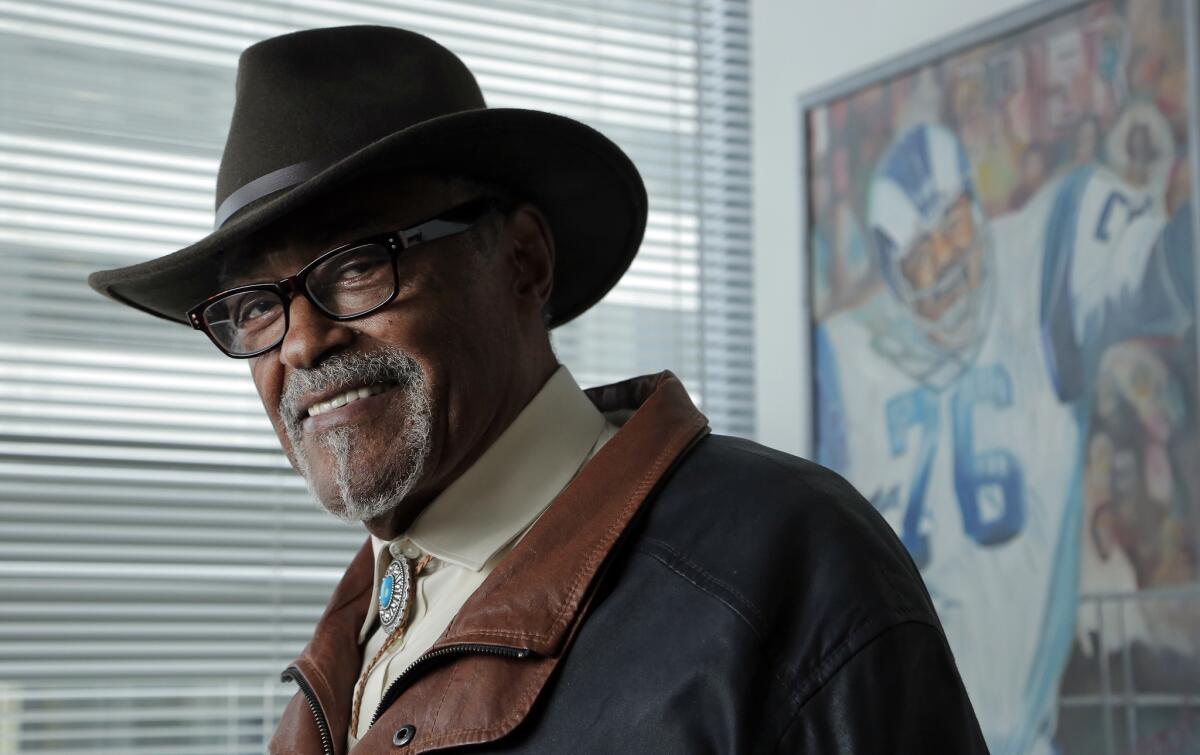
Former Los Angeles Rams football legend Rosey Grier has dropped his bid for California governor.
“I decided not to run for governor in January, after much prayer, research and counsel,” Grier said in an email Monday.
Grier, a member of the famous “Fearsome Foursome” defensive line, announced he was running in January but he never officially filed for office or actively campaigned.
Grier, a Republican who lives in west Los Angeles, has an eclectic political history. He supported the presidential bids of Democrat Jimmy Carter as well as Republican Ronald Reagan.
Grier was serving as an aide to the presidential hopeful Robert F. Kennedy when he was gunned down by Sirhan Bishara Sirhan outside the ballroom of the Ambassador Hotel in Los Angeles in 1968. Grier grabbed Sirhan’s leg and gun hand after the shots were fired.
Grier faced long odds in the race for governor, which has already attracted a list of top Democratic candidates, including Lt. Gov. Gavin Newsom, former Los Angeles Mayor Antonio Villaraigosa and state Treasurer John Chiang.
The Republicans in the race include Assemblyman Travis Allen (Huntington Beach) and a Rancho Santa Fe venture capitalist John Cox.
See our list of who’s running and who’s still on the fence in the governor’s race.
- Share via
John Chiang: The no-drama contender for California governor in the era of Trump

It took decades for John Chiang to hustle into the top ranks of California politics, and he relished all the schmoozing along the way.
On the Lunar New Year, Chiang turned up at a firecracker party in Westminster. Weeks later, he awoke early for a cattlemen’s breakfast in Sacramento. When the Fresno Rotary Club sought a luncheon speaker, Chiang made time.
His nonstop networking has paid dividends. He won five elections in a rout, most recently for state treasurer in 2014.
Yet to many Californians, Chiang is just a vaguely familiar name, often mispronounced. (It’s Chung, not Chang.) It shows up on ballots, somewhere near the middle.
But now that he’s running for governor, Chiang is competing on a much bigger stage. Voters pay close attention to the top of the ticket, appraising character and personality.
For the first time in his career, the way that Chiang’s reserved, low-key demeanor comes off on television will matter — all the more so in a race against two of the state’s most charismatic politicians.
- Share via
Political Road Map: There’s little on the horizon when it comes to ballot measures in 2018
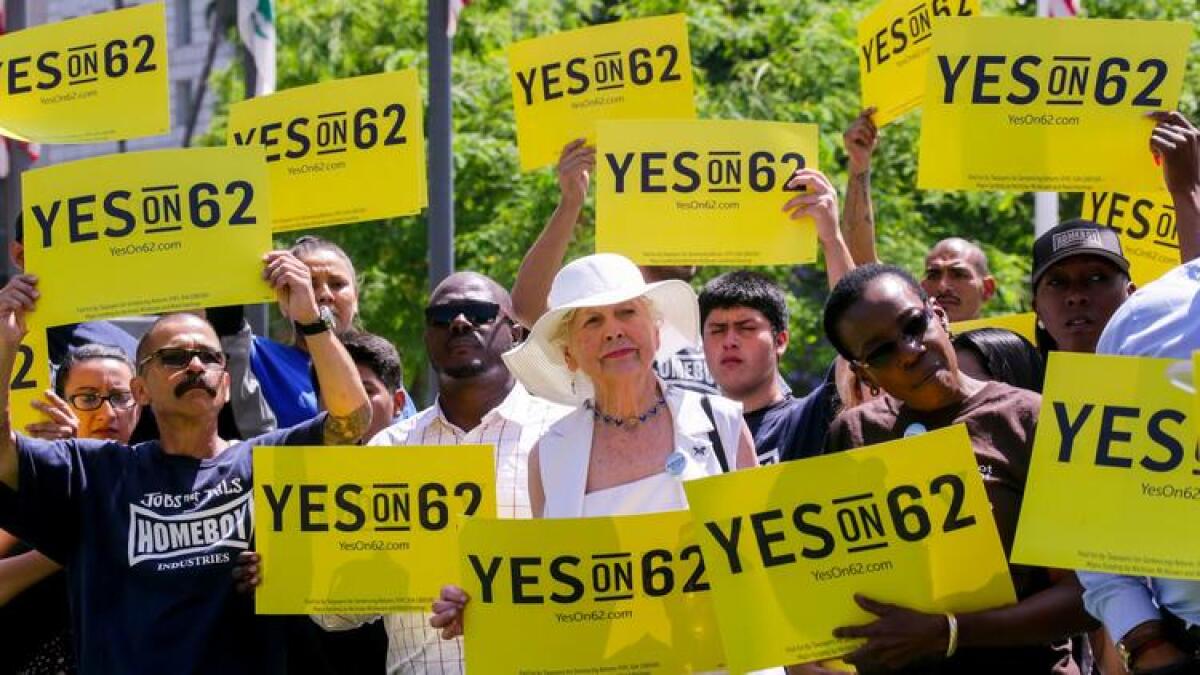
In the wake of last November’s super-sized ballot, which sparked the most expensive ballot measure election in California history, the political arena where initiatives are crafted has been in the midst of a summer of stagnation.
Consider where things stood at the same point in 2015. Then, there were 31 initiatives gathering signatures in hopes of landing on the November 2016 ballot. Out of that came 17 propositions that ultimately made it to voters.
By contrast, there are only five initiatives now in the signature-gathering phase. Nine others are awaiting a formal vetting.
- Share via
Today’s newsletter: On healthcare fallout, and one of the hopefuls aiming to be California’s next governor
Today’s Essential Politics newsletter highlights our best work from the last few days, along with stories from around the Web we’ve noticed.
The newsletter comes out Mondays, Wednesdays and Fridays.
Are you a subscriber? Sign up below.
- Share via
Nancy Pelosi raises more than $25 million for Democratic efforts to retake the House
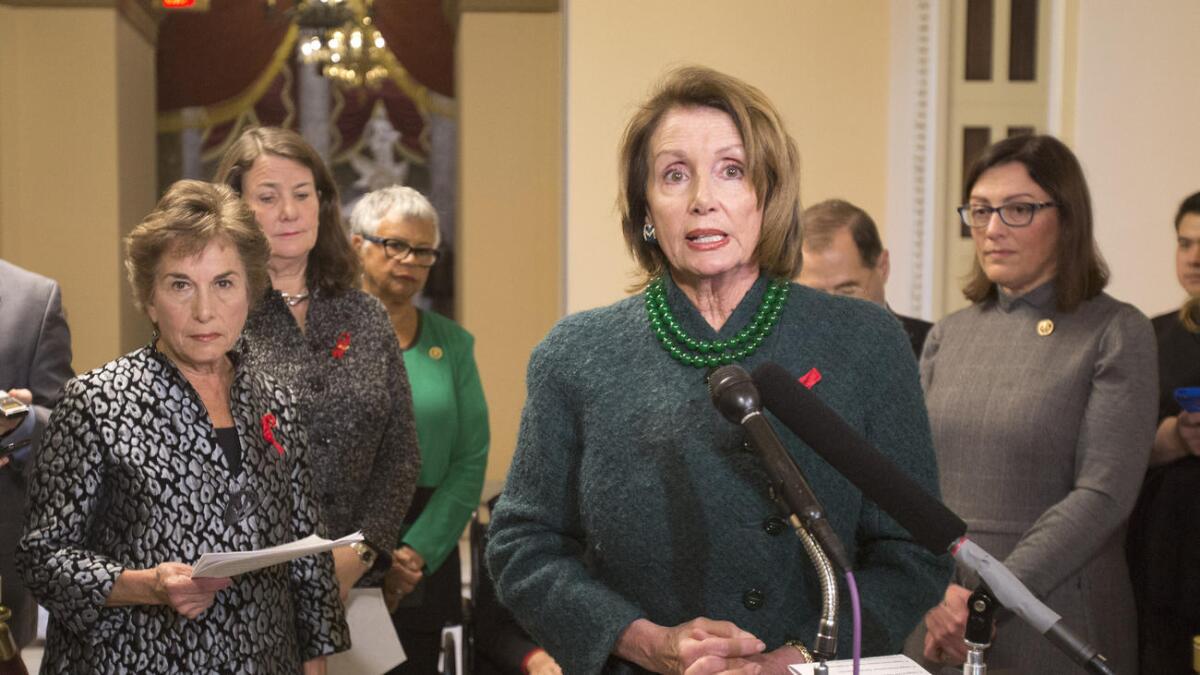
House Minority Leader Nancy Pelosi’s reelection campaign said she has raised $25.9 million for House Democrats’ bid to retake the chamber in 2018, with the majority of the money going to the Democratic Congressional Campaign Committee.
Long known as a fundraising powerhouse, San Francisco’s Pelosi has seemed invigorated with her new role of opposing President Trump.
Since joining House leadership in 2002, Pelosi has raised $593.8 million for Democrats, according to her campaign spokesman Jorge Aguilar.
The 124 fundraising events she’s held in 22 cities this year garnered $1.2 million from a New York City fundraiser in March, nearly $2 million from a fundraiser in San Francisco and nearly $1.5 million from a Los Angeles fundraiser, both in April.
Aguilar said the haul “demonstrates the growing enthusiasm for House Democrats to retake the House.”
Though none of them has raised more than $50,000, Pelosi has attracted a handful of challengers for 2018, including Democratic challenger Stephen R. Jaffe, a supporter of former Democratic presidential candidate Bernie Sanders who has criticized Pelosi for raising money from corporations and special interests.
Pelosi was reelected in 2016 with 80% of the vote.
- Share via
From Times Opinion pages: Why Dianne Feinstein shouldn’t run again
At age 84, Dianne Feinstein is the oldest of the 100 U.S. senators. And the word, both in Washington and around California, is that she plans to run for reelection next year to a six-year term that will end when she’s 91.
The problem with yet another Feinstein candidacy is partly a matter of image. Ever since the tea party landslide of 2010 wiped out a generation of Democratic up-and-comers, many of the party’s central figures — Barack Obama decisively excepted — have been disproportionately older. Some of those Democrats have flourished with age: Sen. Bernie Sanders, technically an independent, has led a rebirth of the American left; Rep. Nancy Pelosi remains the most accomplished legislative leader Congress has seen in many decades; Rep. Maxine Waters has become the bubbe of the anti-Trump activists; and Jerry Brown, in his second go-round as California governor, has become the nation’s commander-in-chief in the fight against climate change.
- Share via
Rep. Dana Rohrabacher faces hostile crowd during panel about Russia and Trump at Politicon

Rep. Dana Rohrabacher on Sunday braved a crowd of politically engaged Southern Californians for a panel called “From Russia with Trump.”
It started with boos for the congressman and went downhill from there.
“Let’s avoid outright hostility,” moderator Vince Houghton told the audience in the Civic Auditorium at the Pasadena Convention Center, where the Politicon convention was held this weekend.
Rohrabacher (R-Costa Mesa) said he appreciated being able to speak with people “who obviously don’t like me” on the topic, one from which he has not backed down even as he’s been in the headlines for his pro-Russia positions.
The crowd wasn’t having it. They heckled him. “Shame on you!” they shouted. They called for “town hall meetings” in his district, 50 miles from the convention. They called him “paranoid.” They hissed and they laughed.
Organizers for Politicon, in its third year, said more than 10,000 attended. Not everyone there was liberal, but this was an event which featured a popular panel on impeachment and where fans stood in long lines to take photos with MSNBC hosts.
The moderator didn’t ask Rohrabacher about his own ties with Russia, or about his informal nickname: Russian President Vladimir Putin’s favorite congressman.
“There are some bad guys in Russia and Putin is one of them,” he said, adding there also are “bad guys” in the United States. Then he compared Putin to “Mayor Daley and his gang,” presumably a reference to the late Chicago politician known for hardball tactics.
When he was shouted down, the congressman warned, “It’s usually fascists who don’t let somebody talk.”
Rohrabacher went after familiar targets, including President Obama, Hillary Clinton and the Clinton Foundation. A man in the crowd shouted, “Fox News talking point!”
When it came to special counsel Robert S. Mueller III’s probe into Russia’s meddling in the U.S. elections, Rohrabacher questioned the intelligence unearthed in the investigation and brought the conversation back to Clinton’s controversial campaign emails. “They were not making up emails,” he said. “All they were doing was releasing information that was accurate.”
The congressman said he’s learned not to trust American intelligence until he can verify it, and cited the reports of weapons of mass destruction during the Iraq confict to back up his point.
“You’ve got to be skeptical and you’ve got to ask for proof before you just accept something,” he said.
Rep. Ted Lieu (D-Torrance) didn’t shy away from going after his colleague.
“You can believe Trump’s CIA director, Trump’s NSA director, Trump’s director of national intelligence. Or you can believe Dana Rohrabacher,” Lieu said. The crowd applauded.
Rohrabacher scored a point on the rest of the panel when he challenged if they had actually been to Russia. When they admitted they had not, he boasted of his work for President Reagan and his role as chairman of the “emerging threats” subcommittee in the House.
“We have people here who are advocating policy and they have not been to Russia,” the congressman said.
Acknowledging the political leanings of the audience and his fellow panelists, Houghton took a moment at the close of the panel to thank Rohrabacher for showing up in front of such an unfriendly crowd.
“He is on an island up here right now ... he has done an exceptional job,” the moderator said.
UPDATE
7:30 a.m.: This post was updated with information about the convention size.
This post was originally published at 3 a.m.
- Share via
2018 could be the year of the rookie in California’s congressional races

Mai Khanh Tran came to the U.S. as a child refugee, worked as a janitor to put herself through Harvard University and is a two-time breast cancer survivor. But she describes the months-long process of deciding to run for Congress as an “agonizing” time.
“I am leaving a very nice, private life that I’ve worked very hard to build and to be at a position where I can now take it easy and enjoy my family,” said Tran, a pediatrician who lives in Yorba Linda and has announced a run against Rep. Ed Royce (R-Fullerton). “It’s going to be a year and a half of work that’s not in my comfort zone.”
This is Nguyen’s first time running for office — she’s one of more than two dozen candidates who have never run for office before but have announced bids in California’s 13 most competitive congressional races.
Many of them say the election of President Trump, a first-time candidate who rode his reputation as a political outsider to the highest office in the nation, spurred them to run.
Most are concentrated in Orange County, where four of California’s seven most vulnerable Republican House members are based. But newcomers to politics are popping up on both sides of the aisle. The 2018 roster includes scientists, businessmen, doctors, veterans and at least one lottery winner.
- Share via
California Politics Podcast: A formal resistance might be forming inside state Democratic ranks
California Democrats found themselves in the springtime facing a bitter battle for the party leadership. Now it appears the loser in that contest may be forming a new faction inside party ranks.
On this week’s California Politics Podcast, we discuss this week’s announcement by Kimberly Ellis, who, while continuing to challenge the results of the state party chair’s race, is suggesting that she and other liberal activists are digging in for the long haul.
We also discuss the departure of a Republican hopeful from the 2018 race for governor, as well as how a group of Democratic state legislators has asked gubernatorial hopefuls to sound off on the issue of affirmative action.
I’m joined by Times staff writers Melanie Mason and Liam Dillon.
- Share via
Single-payer healthcare supporters take first step to launch recall against California Assembly Speaker Anthony Rendon
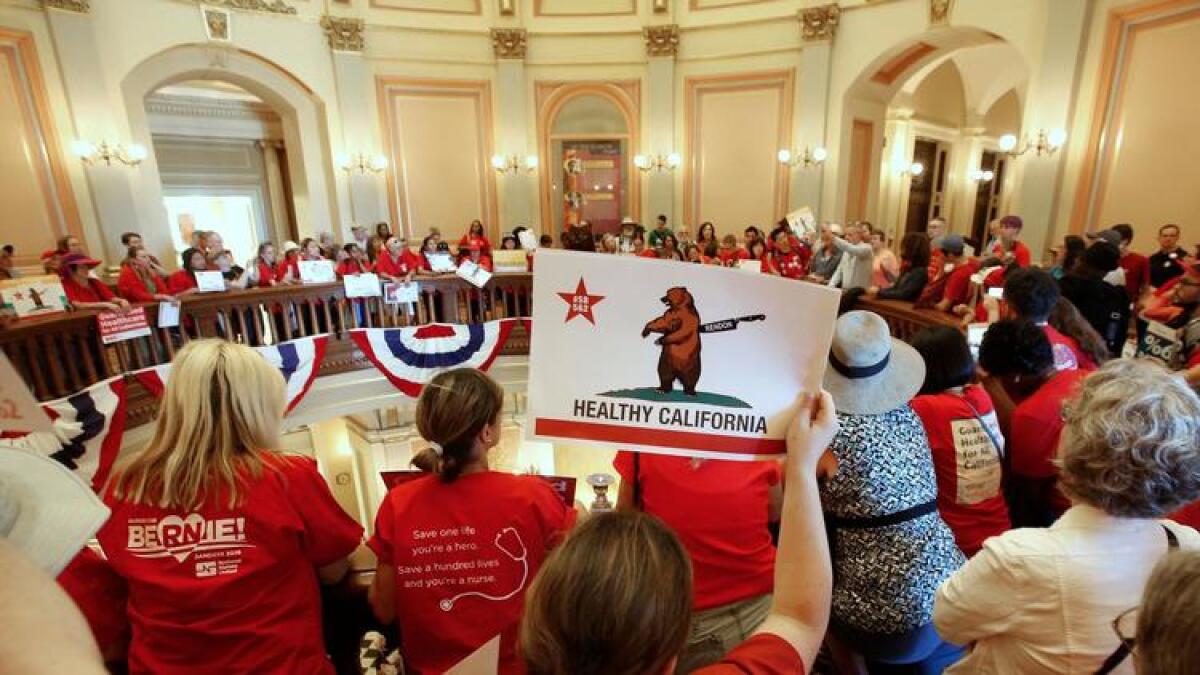
When Assembly Speaker Anthony Rendon (D-Paramount) halted a measure to establish single-payer healthcare in California, the bill’s most dedicated backers immediately called for him to be removed from office.
Now, more than a month later, single-payer advocates have taken the first formal step to follow through on their threat, giving Rendon’s office this week notice of intent to circulate a recall petition.
Rendon’s move to stop the single-payer bill — which he called “woefully incomplete,” noting it passed the state Senate without a method to pay for it — was the catalyst for the outcry.
“If we recall the Assembly speaker, maybe someone else [will be] willing to push this bill, to get it out of the rules committee and send it to the Assembly to get a vote on it,” said Jessica Covarrubias, a proponent of the effort. “Maybe that will help everyone get healthcare.”
Covarrubias, a 27-year-old law student from South Gate, described the recall campaign as “literally a grassroots effort.” She first learned of the recall campaign when single-payer activists, incensed by Rendon’s action, launched a door-knocking drive to inform voters in his district.
The notice, which proponents mailed on Tuesday and was received by Rendon’s office Friday, was signed by 60 people; at least 40 signatures must be deemed valid, belonging to registered voters of his Southeast Los Angeles County district. It was filed by Stephen Elzie, an Irvine-based USC law professor who is acting as an attorney for the effort.
“Assemblymember Rendon trusts in the fair-minded voters of his district to see through the misleading and false allegations made by the recall’s petitioner, who doesn’t even live in Southeast Los Angeles,” said Bill Wong, a spokesman for Rendon.
The recall effort faces tough odds. As the powerful Assembly speaker, Rendon has been a robust fundraiser, ending 2016 with more than $1.2 million in the bank. Other labor groups, including unions representing construction workers and grocery clerks, publicly sided with the speaker’s decision to shelve the single-payer bill and could serve as as a well-financed cavalry should Rendon face a heated campaign to oust him.
Still, this week’s step forward in the recall effort underscores how activist anger over Rendon’s decision continues to simmer weeks after the measure, SB 562, was blocked.
Last week, the California Nurses Assn., which sponsored the legislation, paid for two mailers to be sent in Rendon’s district, assailing his move as “holding healthcare hostage” and “protecting politicians, not people’s healthcare.” Both mailers encouraged recipients to call or visit Rendon’s office to voice their displeasure, although the flyers stopped short of calling for a recall.
Michael Lighty, policy director for the nurses’ group, said the union was not involved with the recall effort, focusing instead on pressuring Rendon to let the single-payer bill move forward.
- Share via
Former Assemblywoman Ling Ling Chang plans to challenge Sen. Josh Newman if recall measure qualifies
After losing a close race last year for the state Senate, former Republican Assemblywoman Ling Ling Chang said Friday that she plans a rematch against Democratic Sen. Josh Newman of Fullerton if pending petitions qualify a recall measure for the ballot.
Chang, a Diamond Bar resident, lost to Newman by less than 1% of the vote last year, and said she thinks he is vulnerable because of the recall drive by Republicans critical of his vote for a gas-tax increase.
Chang noted that she voted to stop tax increases during her two years in the Assembly.
“By contrast, Josh Newman voted to raise gas and car taxes by $52 billion and increased the cost of living for the average [Senate District] 29 family by $300 a year,” Chang said in a statement. “I’m running for state Senate and support the recall because we can’t afford three more years of Josh Newman.”
The California Republican Party has turned in more than 100,000 signatures to put a recall measure on the ballot, while 63,500 of them have to be verified as district voters for the measure to qualify.
If the measure qualifies, voters will be asked to answer whether Newman should be recalled and which candidate should replace him if the recall passes.
Chang’s name and others, including Republican Fullerton Mayor Bruce Whitaker, would be on the ballot as candidates to fill the Senate seat.
Newman campaign spokesman Mike Roth responded: “This is political opportunism to the extreme - just 8 months after voters fired Ms. Chang she’s betting her political future on them believing the bucket of lies they’ve been fed about the recall.”
Updated at 6:20 pm to include a comment from Mike Roth.
- Share via
Anthony Scaramucci cancels weekend appearances at Politicon convention in Pasadena
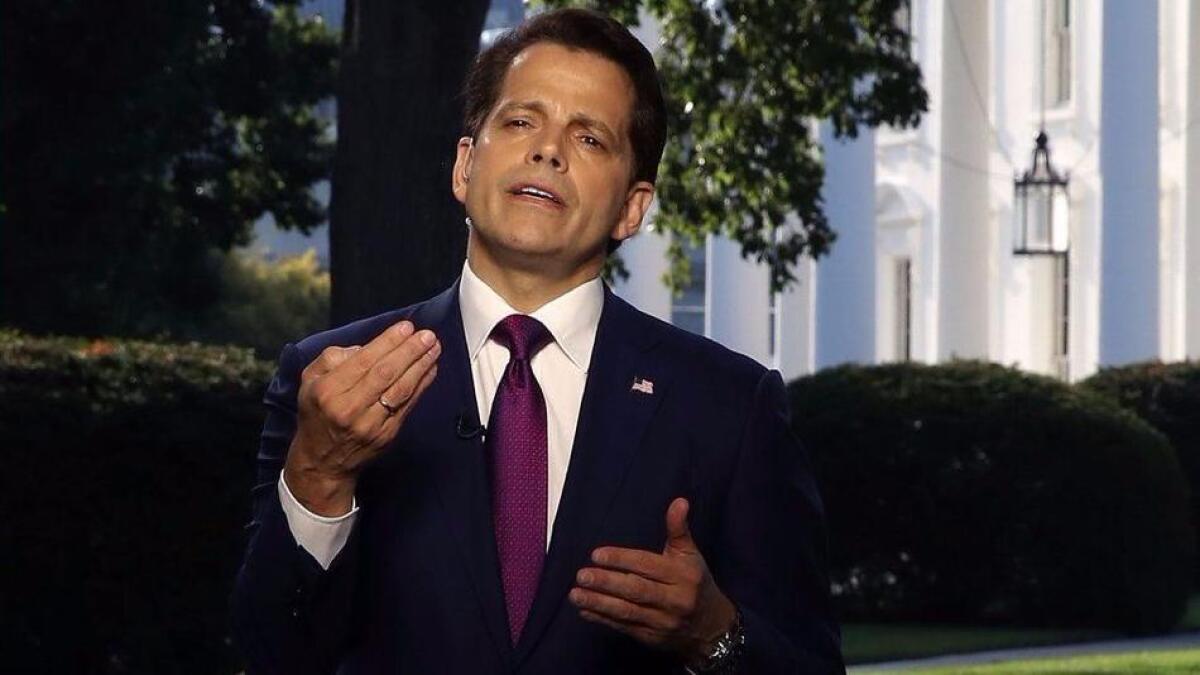
New White House Communications Director Anthony Scaramucci was going to be among the hottest draws at Politicon, a two-day political convention in Pasadena this weekend.
But on Friday, organizers announced that he had canceled his appearance at the event — shortly after a profanity-laden interview emerged in which he trashed his new White House colleagues.
Organizers of Politicon downplayed the cancelation, pointing to several other guests, including Chelsea Handler and Ann Coulter, who are still scheduled to appear, and poked fun at Scaramucci’s recent tirade.
“At least now we don’t have to worry about violating any local obscenity laws!” they said in a statement.
Scaramucci had been scheduled to take part in three sessions: an hourlong interview, a panel about the likelihood of World War III and a panel about what the United States will look like after President Trump leaves office.
- Share via
Here’s why a big Bay Area housing project won’t get built

Lots of California politicians, business leaders, housing activists and others want 4,400 new homes built on 640 acres right outside the city of San Francisco.
But none of them gets to decide what happens on the land. Instead, it’s under the control of the city of Brisbane, whose residents are wary of a project that could triple the city’s population from its current 4,700. Beyond that, California’s tax system ensures the city would earn a lot more revenue if it rejected housing and instead approved more commercial or hotel development on the site.
These reasons, state officials say, show why California is struggling to meet its vast housing affordability problems.
- Share via
Volkswagen gets green light for charging stations under settlement plan
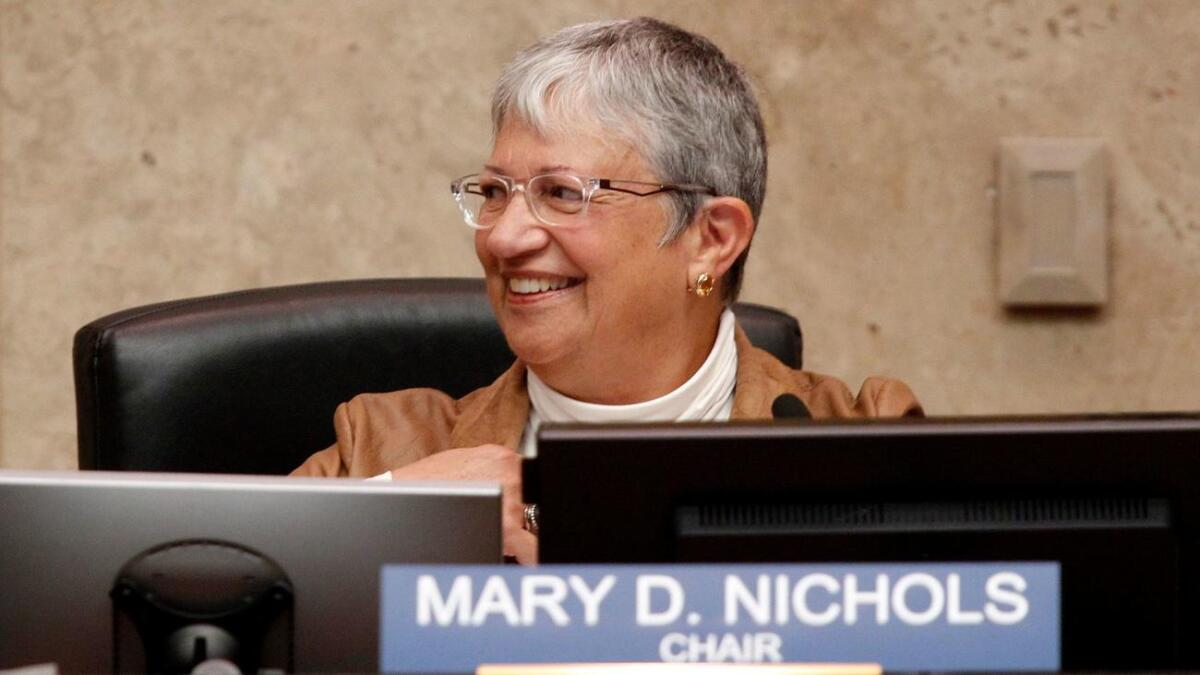
California regulators approved on Thursday the first phase of Volkswagen’s plan to install electric vehicle charging stations around the state.
The plan, which will be carried out by a subsidiary called Electrify America, is part of a much larger, multibillion-dollar settlement over the automaker’s cheating of emission rules.
Thursday’s decision by the Air Resources Board green lights the first $200 million of the company’s required $800-million, 10-year investment.
The vote came only after Electrify America modified its spending plan to increase the number of charging stations in disadvantaged communities.
“It’s been a long process, but I hope you feel like it’s been worth it,” said Mary Nichols, the board’s chair. “We certainly feel like we’ve gained a lot of confidence that it will be a success.”
Volkswagen’s investment could become an important part of the state’s efforts to increase the number of zero-emission vehicles on the road. It’s estimated that the company’s spending will provide up to 8% of the necessary charging infrastructure in coming years.
This post has been updated to correct the day of the Air Resources Board’s decision.
- Share via
California’s tax board members aren’t happy about how new disclosure rules are being applied
Members of California’s Board of Equalization objected Thursday to a broad interpretation of a new state law requiring that they disclose their private meetings with taxpayers who are engaged in appeals.
A state attorney said ex parte communications must be disclosed on currently pending matters — even if they occurred before the enactment of the new law on July 1. Tax board members said they did not track who they and their staff talked to before the law took effect.
“No one is prepared to go back,” said Board of Equalization Chairwoman Diane Harkey. “We want to make sure we have no liability here. This is an impossible situation.”
The dispute led the panel on Thursday to delay action by three hours on several tax appeals, while attorneys found a way to temporarily allow the hearings. In the end, each board member announced whether he or she recalled any communications with the taxpayer whose appeal was being heard.
Board member Jerome Horton said attorneys whom he has consulted with disagree that the law applies retroactively.
However, since a reorganization signed into law by Gov. Jerry Brown, the board currently does not yet have its own attorney. The reorganization shifted most of the board’s responsibilities and employees to a new agency.
“The frustrating part for me is that this reorganization was supposed to be seamless and it is anything but seamless,” said Board Vice Chairman George Runner.
- Share via
Watchdog panel’s support for lifting some donation limits is likely boost to state senator facing recall
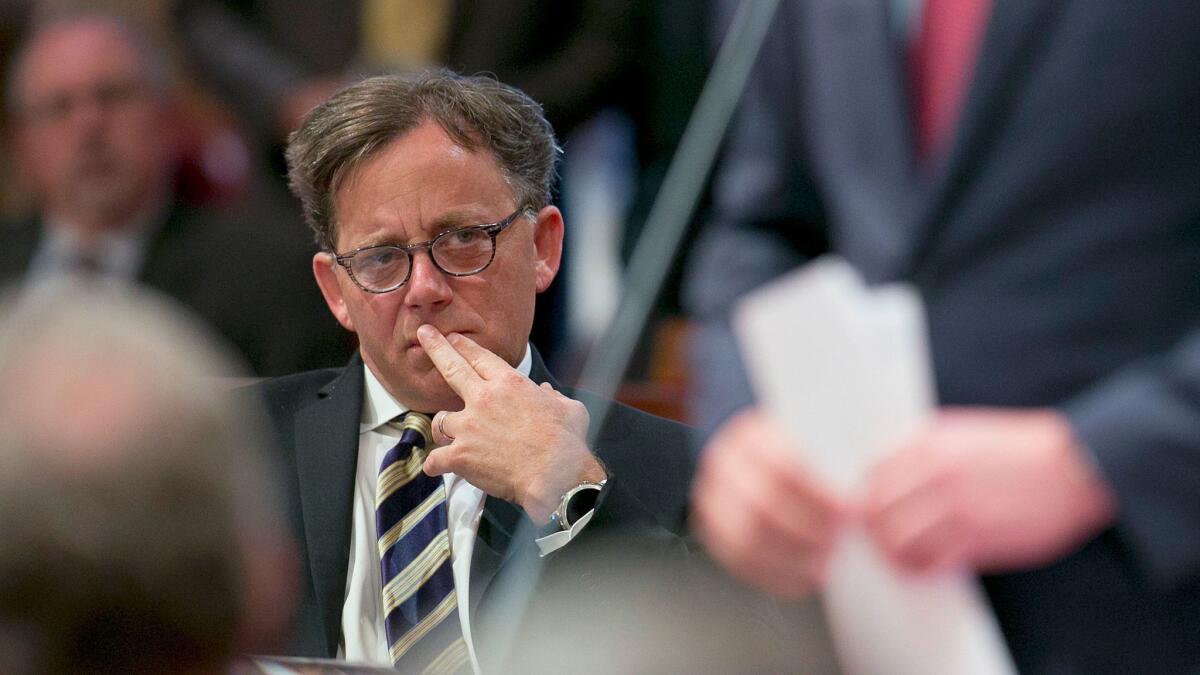
A watchdog commission appointed by Democrats opted Thursday to support lifting the limits on donations to officials targeted by recalls — just as a Democratic state senator is facing one.
The change must be finalized at a future commission meeting. The limits still apply until that happens.
Going against the recommendation of its attorney, all but one Fair Political Practices Commission member voted in support of allowing larger contributions than have been allowed in the past.
The change could be a big boost to freshman state Sen. Josh Newman, being targeted for ouster for voting to raise the gas tax.
FPPC attorneys must still draft a new legal opinion subject to public comment and approval by the panel. The attorneys had issued a memo continuing the long-held position that candidate-controlled committees to fight recalls are subject to a $4,400 contribution limit.
Richard R. Rios, an attorney for Senate Democrats, said it is “unfair and creating a playing field that is not level,” to limit contributions to Newman’s committee, while large contributions can be made to the recall.
Commissioner Maria Audero said her reading of the law is that the limit that applies to candidates running for office should not be applied to their committees fighting recall.
“I think the argument that ‘It is so because that is the way we have been doing it’ really has no validity,” she said.
Commissioner Brian Hatch also said that the law, as he reads it, does not limit contributions. He said he regretted it had been interpreted that way in the past.
“Hopefully here today we are going to correct these past injustices,” Hatch said.
Commission Chairwoman Jodi Remke voted against reversing the 15-year-old legal posture setting limits.
Citing the makeup of the commission -- which was appointed by Democrats— and the timing in the middle of a recall targeting a Democrat, Remke said the reversal in favor of Newman “could be considered political, potentially impacting the public’s perception of the integrity of the commission.”
The vote was 3-1.
“I believe that the longstanding commission interpretation is correct,” Remke told her colleagues. “I do not believe there is a sound basis to reverse our decision.”
Carl DeMaio, a Republican activist involved in the recall, denounced the panel’s vote. “With this action to decimate campaign finance rules in favor of big money in politics, California Democrats show they are breaking and bending all the rules to keep power,” said DeMaio, a former San Diego City Councilman.
Updated 1:18 pm to clarify that the contribution limits still apply until a final vote approves the changes.
Updated at 3:40 pm to include comment from DeMaio.
- Share via
Rep. Dana Rohrabacher accused of violating Russian sanctions by backer of Russian sanctions law
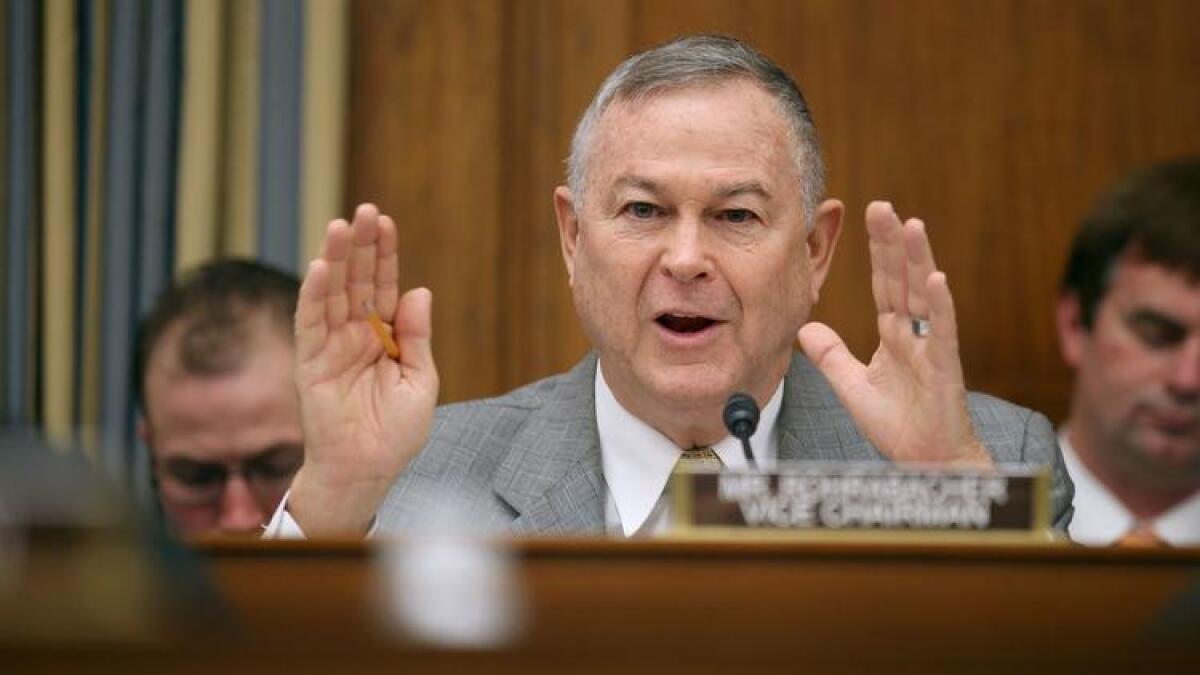
Financier Bill Browder has accused Rep. Dana Rohrabacher of violating federal sanctions by using information provided by Russian officials to try to convince Congress to overturn those sanctions.
Browder filed a complaint with the Treasury Department’s Office of Foreign Assets Control this week saying Rohrabacher and his staff member, Paul Behrends, violated the Magnitsky Act by taking information from a sanctioned Russian official and using the information to try to change the act.
The act is named for attorney Sergei Magnitsky, who died in prison after accusing several prominent Russians of stealing $230 million in taxes. Browder, who was Magnitsky’s boss, persuaded Congress to pass the Magnitsky Act in 2012. It prevents more than 40 prominent Russians involved in the affair from traveling to or banking in the U.S. The act infuriated Russian President Vladimir Putin, who retaliated by halting U.S. adoptions of Russian children.
The complaint relies heavily on a recent Daily Beast report about a memo Rohrabacher received detailing complaints about Magnitsky and Browder during a 2016 meeting in Moscow with a high-ranking Russian justice official who was among those sanctioned under the act.
Congress was considering expanding the act at the time, and there was an intense lobbying effort by a handful of people with Russian ties on Capitol Hill to have Magnitsky’s name removed from it.
In the complaint, Browder alleges Rohrabacher and Behrends “provided services to one of the central figures targeted by the Magnitsky Act” because they got information from the Russian official and used it to try to change the law.
In a statement responding to the complaint, Rohrabacher said he questions why Browder doesn’t want the congressman to get information from multiple sources.
“Anyone who knows me understands that I am the Member of Congress least likely to take directions from government officials, especially foreign government officials. Because of some grotesquely misleading headlines, Mr. Browder flatters himself by claiming that I contemplated conducting a hearing all about him. Perhaps he protests too much,” Rohrabacher said.
Browder testified before the Senate Judiciary Committee on Thursday and called out Rohrabacher as part of Russian efforts to sway Congress to get rid of the Magnitsky Act. It’s unusual for a sitting member of Congress to be called out by a witness on Capitol Hill, but senators didn’t react to the statement.
“We know for sure that part of their campaign was running around Capitol Hill. One of the people that they were able to convince to go along with them is a member of the House of Representatives from Orange County, Dana Rohrabacher, who they have met with on a number of occasions and who has been effectively touting, or spreading their propaganda around the House of Representatives,” Browder said.
- Share via
Adam Schiff, President Trump and the serendipity of slander
The road to elected office can be long and winding and is not always paved with the best of intentions.
Some politicians — think of the Kennedys, or the Bush family — are born to the trade. Others are borne by tragedy.
Former Santa Barbara Rep. Lois Capps succeeded her husband when he fell dead of a heart attack. Former New York Rep. Carolyn McCarthy was spurred to run when her husband was killed and her son gravely wounded in a mass shooting on the Long Island Rail Road.
Typically, though, the ascension is more methodical, one rung after the next, often with a pinch of right-place, right-time fortune thrown in for good measure.
Lately that bit of luck has visited itself upon Adam B. Schiff, in the form of Russian meddling and a president who hurls tweets like poison thunderbolts.
- Share via
The cannabis industry has a clear favorite in the race to be California’s next governor

The fundraising dinner for Gavin Newsom in Salinas was in most ways a typical night for a political candidate. Local business leaders paid up to $5,000 for a chance to talk with the man aiming to be California’s next governor over cauliflower bisque, strip steak and Meyer lemon pudding cake.
The hosts that March evening were in the agriculture business, in a region known for its lettuce, grapes and strawberries. But they left their signature dish off the menu: candy infused with marijuana.
California will soon have open sales of recreational marijuana, and it needs to decide how to regulate its newest cash crop. Hoping to influence those decisions, the cannabis industry is seeking access to the state’s political leaders.
One candidate in 2018’s open race for governor is actively inviting their support. The industry is responding by following a conventional political playbook and pouring money into the lieutenant governor’s campaign to replace Gov. Jerry Brown.
- Share via
California targets pollution with new law, but many activists remain unsatisfied
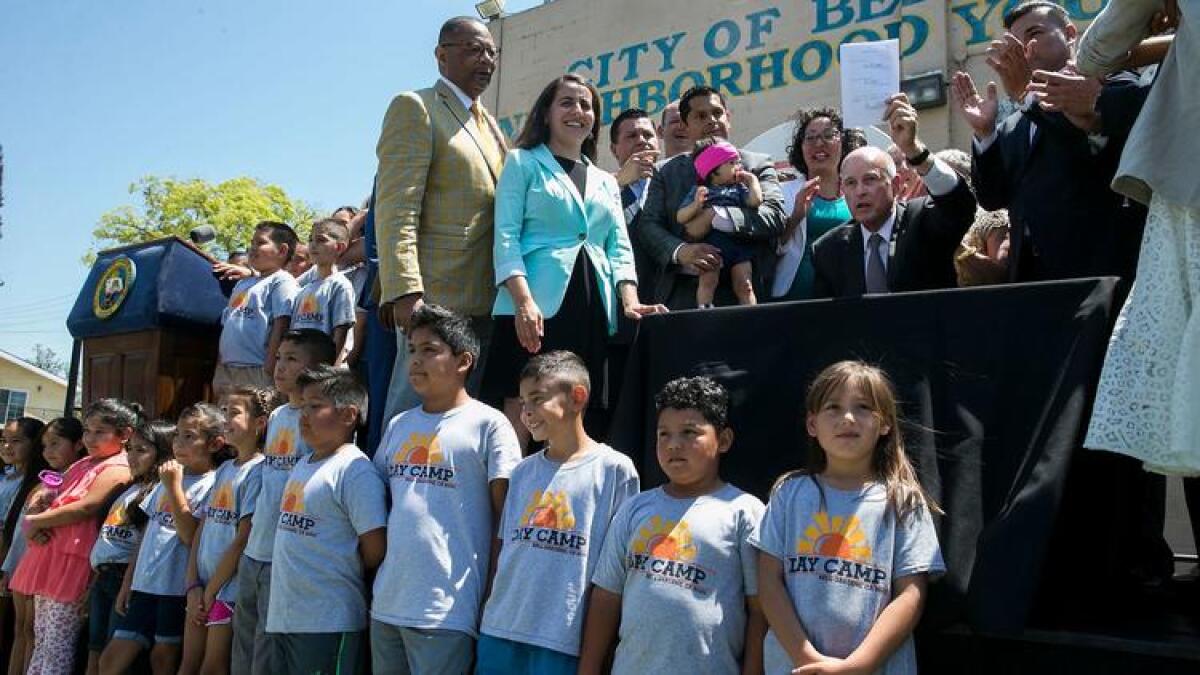
Two months ago, Gov. Jerry Brown was in Bell Gardens to tour some of the area’s polluted neighborhoods and hear from activists about their environmental concerns.
On Wednesday he was back in town to sign legislation intended to improve air quality and public health, but some of the same activists he met with haven’t been satisfied.
“It’s a slap in the face,” said Angelo Logan, a member of East Yard Communities for Environmental Justice, which protested outside the ceremony.
The legislation is part of a broader deal to extend California’s cap-and-trade program for reducing greenhouse gas emissions, a key part of the state’s policies on climate change.
Assemblywoman Cristina Garcia (D-Bell Gardens) defended the measure by saying a new effort on air quality would ensure disadvantaged neighborhoods aren’t left behind during the battle against global warming.
“It’s good that we think about our global community … but we need to make sure that communities like this are not left behind,” she said.
- Share via
Women gaining political power in California cities as they’ve lost it elsewhere
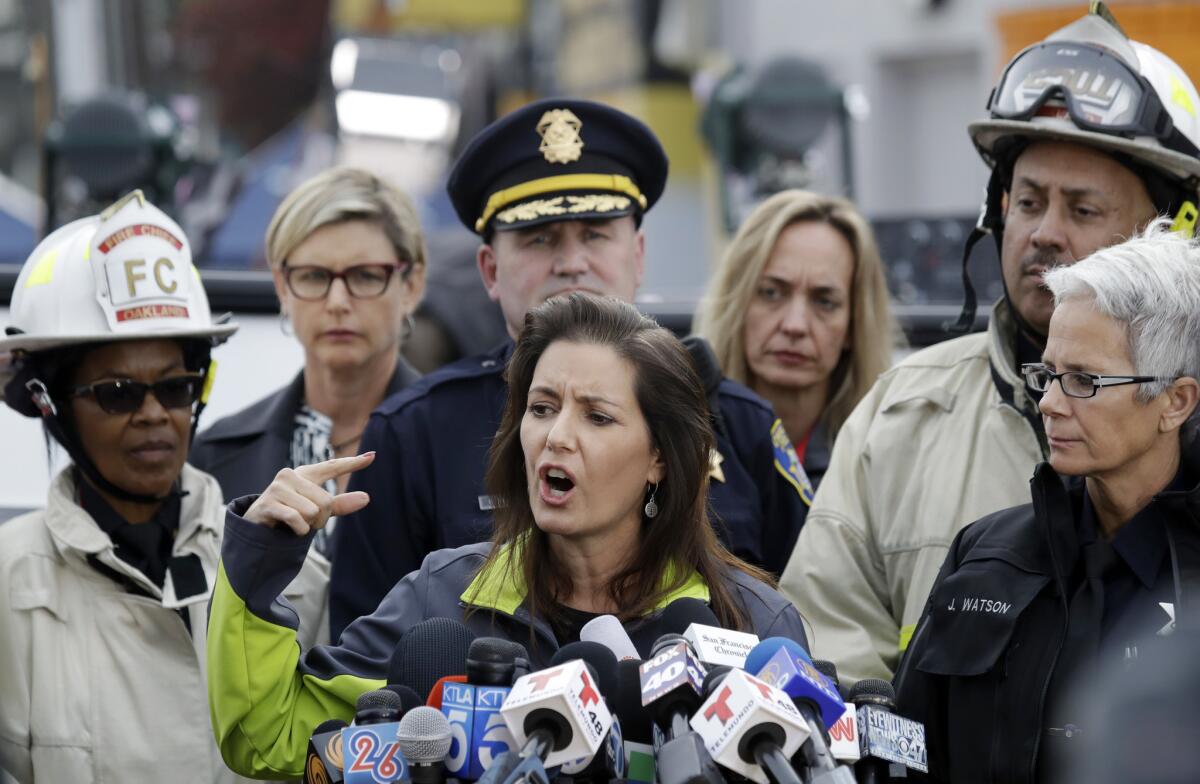
While women have lost ground in California’s legislature and its congressional delegation, the state has seen a small increase in women serving on city councils over the past two years, a new report found.
Women now account for 31% of the members on California city councils, up from 29% in 2015. Women also serve as mayor in 28% of the state’s 482 cities.
The report was released Wednesday by California Women Lead, a nonpartisan organization dedicated to increasing the number of women in elected office.
Here are some of the report’s other notes:
- The number of women in California’s congressional delegation, including the 53 House members and two senators, decreased from 22 in 2015 to 19 in 2017.
- The number of women in the California Legislature decreased from 31 in 2015 to 26 in 2017.
- In California’s 10 largest cities, only one has a woman serving as mayor: Libby Schaaf in Oakland.
- There’s just one city with an all-female council — Blue Lake in Humboldt County. Fifty-six cities have all-male councils.
- Of California’s eight statewide offices, only one is held by a woman: Controller Betty Yee.
- California has been represented by female Democrats in the U.S. Senate since 1993: Dianne Feinstein since 1992; Barbara Boxer from 1993-2017; and newly elected Kamala Harris.
- Share via
Race for Rep. Dana Rohrabacher’s Orange County seat is now rated a toss-up by election prognosticators
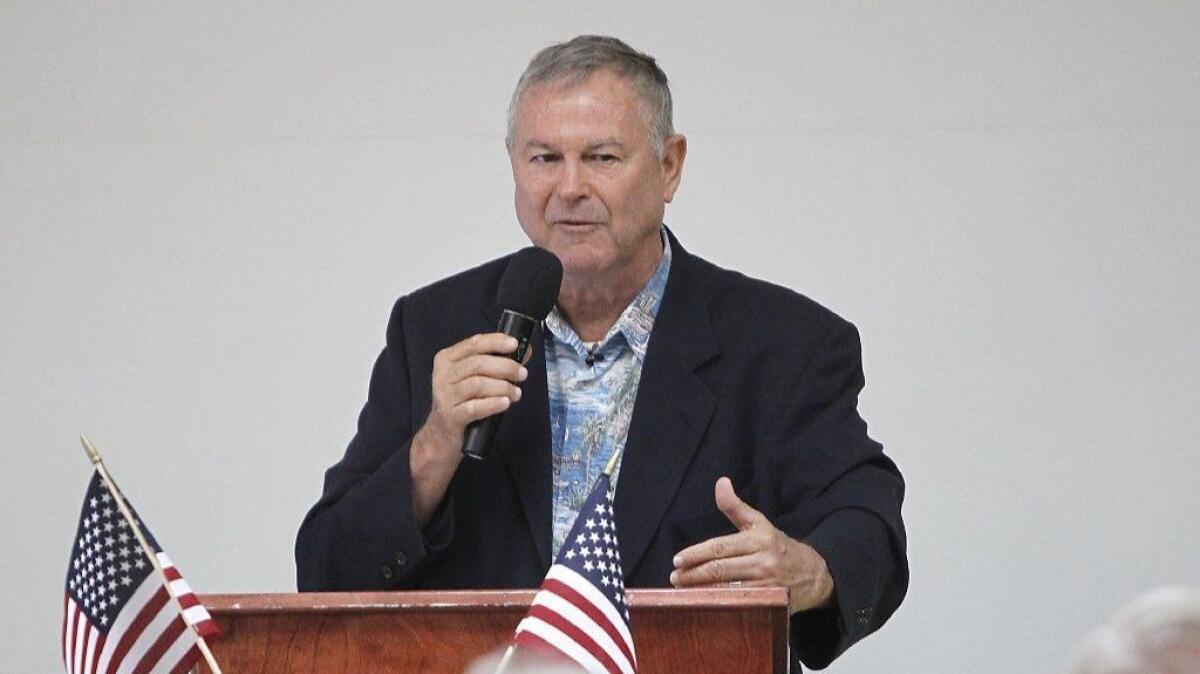
Nonpartisan analysts say the race for Dana Rohrabacher’s House seat representing Orange County is now a toss-up.
Rohrabacher (R-Costa Mesa) faces more than 10 opponents in the 48th District, most of them Democrats. He is running for a 16th term in the 2018 midterm election.
Rohrabacher joins Reps. Darrell Issa of Vista, Steve Knight of Palmdale and Jeff Denham of Turlock among California Republican incumbents whose chances of reelection are rated toss-ups, according to analysts for Larry J. Sabato’s Crystal Ball at the University of Virginia Center for Politics.
Democrats are keeping a close eye on the race, which was previously considered to be leaning Republican, and have officially proclaimed it a battleground for 2018. Rohrabacher’s 2016 win with 58% of the vote could make the seat tough to flip, but Democrats are hoping to capitalize on the district’s narrow backing of Hillary Clinton over Donald Trump.
In his analysis of potentially competitive races, Crystal Ball managing editor Kyle Kondik calls the Orange County race “intriguing, both because of changes in the district and the quirkiness of the incumbent himself” and says national focus on Russia might be a hindrance to Rohrabacher.
“While Clinton did better in some other Republican-held area seats, CA-48 may be one place where the Trump campaign’s potential connections to Russia may have salience given Rohrabacher’s often-expressed warmth toward the Kremlin,” Kondik says.
Rohrabacher, chairman of the House Foreign Affairs Subcommittee on Europe, Eurasia, and Emerging Threats, has long been known for encouraging improved relations with Russia, something that’s made him an outlier in the Republican Party.
Rohrabacher’s name has also come up as the investigation into Russia’s meddling in the 2016 election has heated up. He had multiple interactions with several of the people with Russian ties who attended a Trump Tower meeting with Trump’s eldest son, Donald Trump Jr., and other campaign officials in June 2016.
Rohrabacher’s most recent fundraising quarter, in which he had $406,616 in the bank at the end, was paltry compared with what some of the other target Orange County incumbents raised.
- Share via
Emily’s List is putting Republicans ‘on notice’ and seven of them are in California
It’s not just the national Democrats who have a wish list of Republican incumbents they’d like to unseat in 2018.
Emily’s List, the group that aims to elect women who support abortion rights, has identified 50 congressional and Senate seats nationwide as part of their “On Notice” program to flip seats in the midterm election.
The group has identified seven California Republicans, the largest number of any state. They all occupy seats the Democratic Congressional Campaign Committee has also prioritized. They are:
10th District: Rep. Jeff Denham (Turlock)
22nd District: Rep. Devin Nunes (Tulare)
25th District: Rep. Steve Knight (Palmdale)
39th District: Rep. Ed Royce (Fullerton)
45th District: Rep. Mimi Walters (Irvine)
48th District: Rep. Dana Rohrabacher (Costa Mesa)
49th District: Rep. Darrell Issa (Vista)
Emily’s List says the roster of priority seats is their biggest ever and that the incumbents who hold them have built “appallingly anti-woman, anti-family records.” A statement announcing the 2018 targets points out their votes to repeal the Affordable Care Act and to allow states to defund Planned Parenthood.
Last year, the only California incumbent the group put “on notice” was Denham. This year, the group has already endorsed challengers in two Republican-held districts: pediatrician Mai Khanh Tran, who is running against Royce, and UC Irvine law professor Katie Porter, who’s up against Walters.
While no women have filed to run in the districts occupied by Denham, Nunes or Issa, Emily’s List spokeswoman Julie McClain Downey says they are still recruiting female candidates for those seats.
“We are planning on expending resources in these districts,” Downey said. “Given the environment that we’re in and the increase of women running for office and the excitement we’re seeing, we have targeted the largest contingent to date.”
- Share via
Californians show broad support for state’s climate goals in new poll
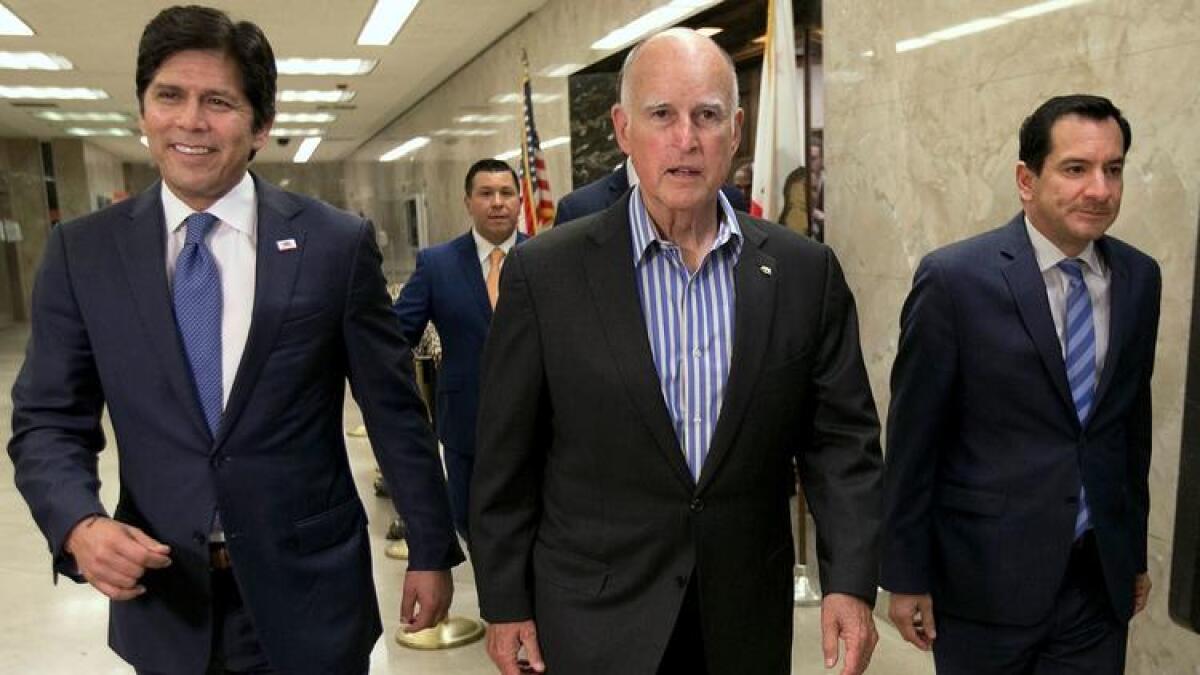
Public support for the state’s battle against global warming remains strong and growing, according to a new poll from the nonpartisan Public Policy Institute of California.
Seventy-two percent of California adults back last year’s law requiring the state to reduce greenhouse gas emissions to 40% below 1990 levels by 2030. Fifty percent said climate policies would create more jobs, the highest level since the question was first asked seven years ago.
A majority of Californians said they didn’t know anything about the state’s cap-and-trade program, which lawmakers recently voted to extend until 2030. But once they were read a description of cap and trade, 56% said they supported the program, another record high for the poll.
“Most Democrats and independents and sizable percentages of Republicans are in favor,” said Mark Baldassare, president of the Public Policy Institute of California.
Even though a majority of Californians also expect gasoline prices to increase, the results indicate that Gov. Jerry Brown and lawmakers are on firm political ground as they push forward with ambitious goals to reduce greenhouse gas emissions.
Both the governor and the Legislature have a 51% approval rating on environmental issues.
The poll included 1,708 Californian adults, and it was conducted from July 9 to July 18. The margin of error is plus or minus 3.4 percentage points.
- Share via
President Trump’s voter fraud panel asks again for data from California — and again the answer is no
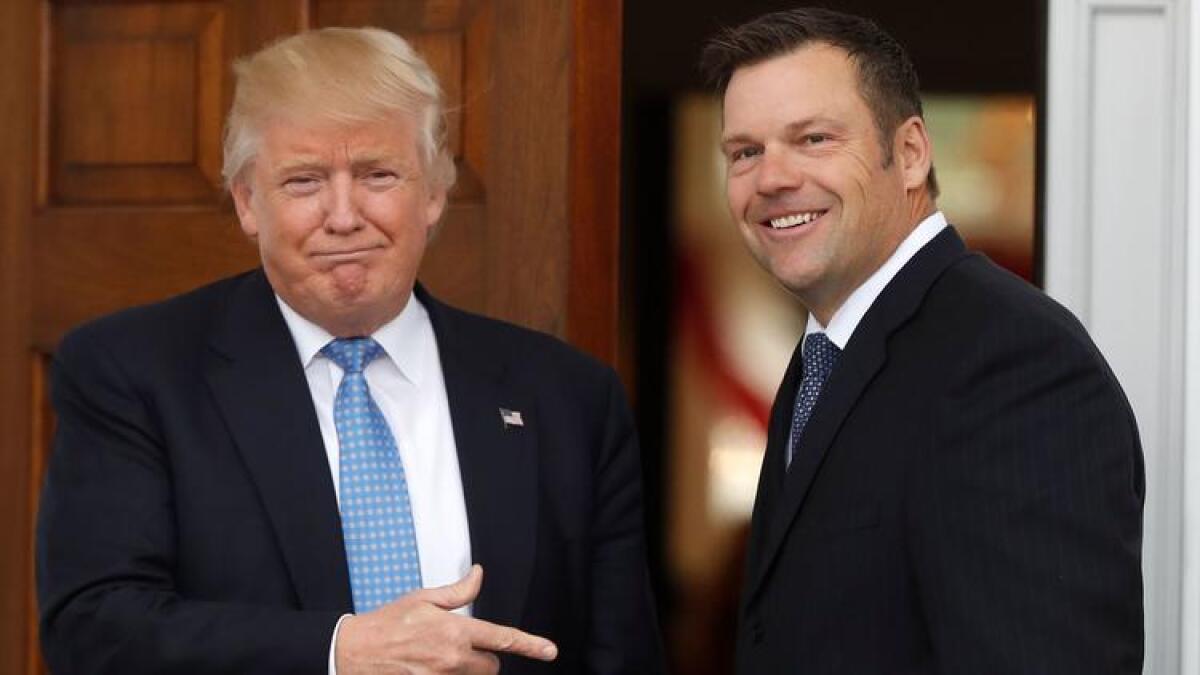
For the second time in less than a month, California’s chief elections officer has refused to hand over data to President Trump’s voter fraud commission, arguing on Wednesday that the inquiry is still part of an “illegitimate” exercise.
“I still have the same concerns,” Secretary of State Alex Padilla said. “I can’t in good conscience risk the privacy of voters in California with this commission.”
The Presidential Advisory Commission on Election Integrity, which met for the first time last week, originally asked for the information from California and other states on June 29. A federal court refused last week to block the commission’s request, though as many as 21 states have insisted they won’t hand over details on voter names, addresses and political party affiliations.
“I want to assure you that the Commission will not publicly release any personally identifiable information regarding any individual voter or any group of voters from the voter registration records you submit,” said Kris Kobach, the vice-chairman of the panel and Kansas secretary of state, in the letter to Padilla on Wednesday.
But Padilla insists that while his office does provide some voter information to academics, journalists and political campaigns, state law gives him the power to refuse any request. And in an interview with The Times, he said it is unclear who the commission or its staff would share the information with once it has been submitted.
“He can say that all he wants,” Padilla said about Kobach’s written promise to secure the data. “But the commission has failed to articulate how it would do that.”
Padilla also pointed out that the commission released the email addresses of those who submitted public comments in the wake of last week’s meeting.
“The privacy violations have already begun,” he said.
The panel was established in the wake of the president’s unproven allegations of widespread fraud in last November’s election. Padilla said he’s asked the commission to provide proof to back up Trump’s comments, and has yet to receive a response.
- Share via
Rep. Darrell Issa complained to city officials about protesters outside his office, records show
Protesters have been showing up at GOP Rep. Darrell Issa’s Vista office weekly in the months since President Trump took office. Though Issa has come out to greet them a few times, he’s also made some phone calls and sent a letter to the city to complain about the protesters, records uncovered by the San Diego Union-Tribune and CBS 8 show.
The congressman and his staff have said that they respect the group’s right to assemble but that the gatherings have impeded work of other businesses in the building — some of which also complained about the protests. They also were concerned about noise. In one voicemail Issa left with the city, he complained that protesters were “sitting on sidewalks and they’re clearly violating their permit.”
“Let me be clear: this isn’t about me or my office,” he wrote in a follow-up June 21 letter to the city of Vista. “I can handle a little heat from some protesters.”
Issa, one of California’s most vulnerable Republicans, sent the letter after the city had reportedly declined to take action because it said protesters weren’t violating the terms of their permit.
- Share via
California has too much pot, and growers won’t be able to export the surplus
A leader of California’s marijuana industry warned Wednesday that the state’s cannabis growers produce eight times the pot that is consumed in the state so some will face “painful” pressure to reduce crops under new state regulations that will ban exports after Jan. 1.
ALSO: Candidate Gavin Newsom dominates donations from growing pot industry aiming for influence
Some marijuana growers will stay in the black market and continue to illegally send cannabis to other states, which is also not allowed under federal law, said Hezekiah Allen, executive director of the California Growers’ Assn.
“We are producing too much,” Allen said, adding state-licensed growers “are going to have to scale back. We are on a painful downsizing curve.”
He said some marijuana growers may stop, while others just won’t apply for state permits.
Allen made his comments to the Sacramento Press Club during a panel discussion that also included Joseph Devlin, chief of Cannabis Policy and Enforcement for City of Sacramento, and Lori Ajax, chief of the state’s Bureau of Medical Cannabis Regulation.
Devlin said estimates he has heard put California production at five times the state consumption; one consultant in the audience said the number may be 12 times what is consumed in the state.
Ajax agreed with Allen that some cannabis cultivators may have to scale back while others may never apply for a state license.
“For right now, our goal is to get folks into the regulated market, as many as possible,” Ajax said. But, she added, “There are some people who will never come into the regulated market.”
Those people, she said, will eventually face enforcement actions for growing marijuana without a state license.
Medical marijuana use was approved by California voters two decades ago. Voters in November approved the legal sale and possession of an ounce of marijuana for recreational use.
- Share via
Watch: Gov. Jerry Brown signs second piece of landmark climate change legislation
- Share via
Minnesota Sen. Amy Klobuchar heads to L.A. for fundraiser with Hollywood players
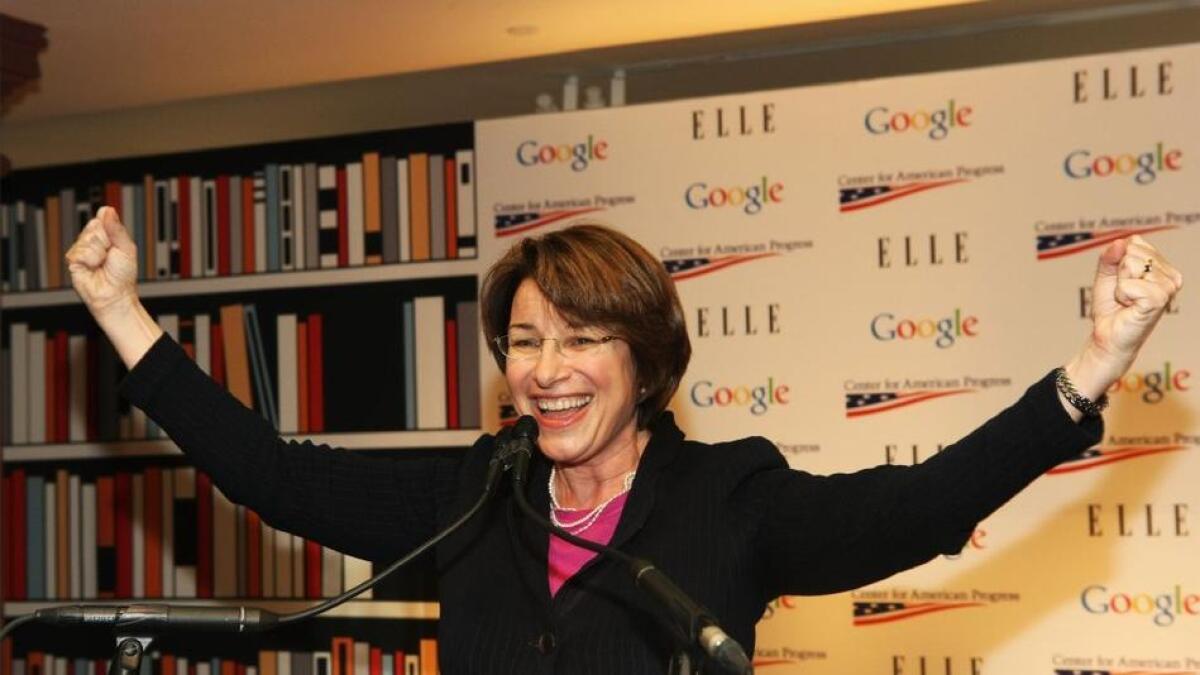
Amid speculation about a potential future presidential bid, Democratic Sen. Amy Klobuchar of Minnesota is headlining a Los Angeles fundraiser for her reelection campaign on Sunday.
Donors are being asked to contribute up to $5,400 to attend the afternoon reception at the Brentwood home of Andy Spahn, an advisor to some of the entertainment industry’s biggest political contributors, and his wife, Jennifer Perry.
Paul Begala and James Carville, former top advisors to President Bill Clinton, are billed as special guests.
Hosts include Hollywood titan Jeffrey Katzenberg, director J.J. Abrams, “Lost” co-creator Damon Lindelof, Universal Film Chairman Jeff Shell, and producers Paul Junger Witt and Susan Harris.
Klobuchar is running for a third Senate term in 2018, but she is frequently mentioned on lists of potential Democratic presidential candidates for 2020. She has stoked such speculation by courting Democratic activists and visiting states that are critical in the nominating process, such as Iowa.
- Share via
On politics, says Schwarzenegger, ‘I mostly argue with myself’
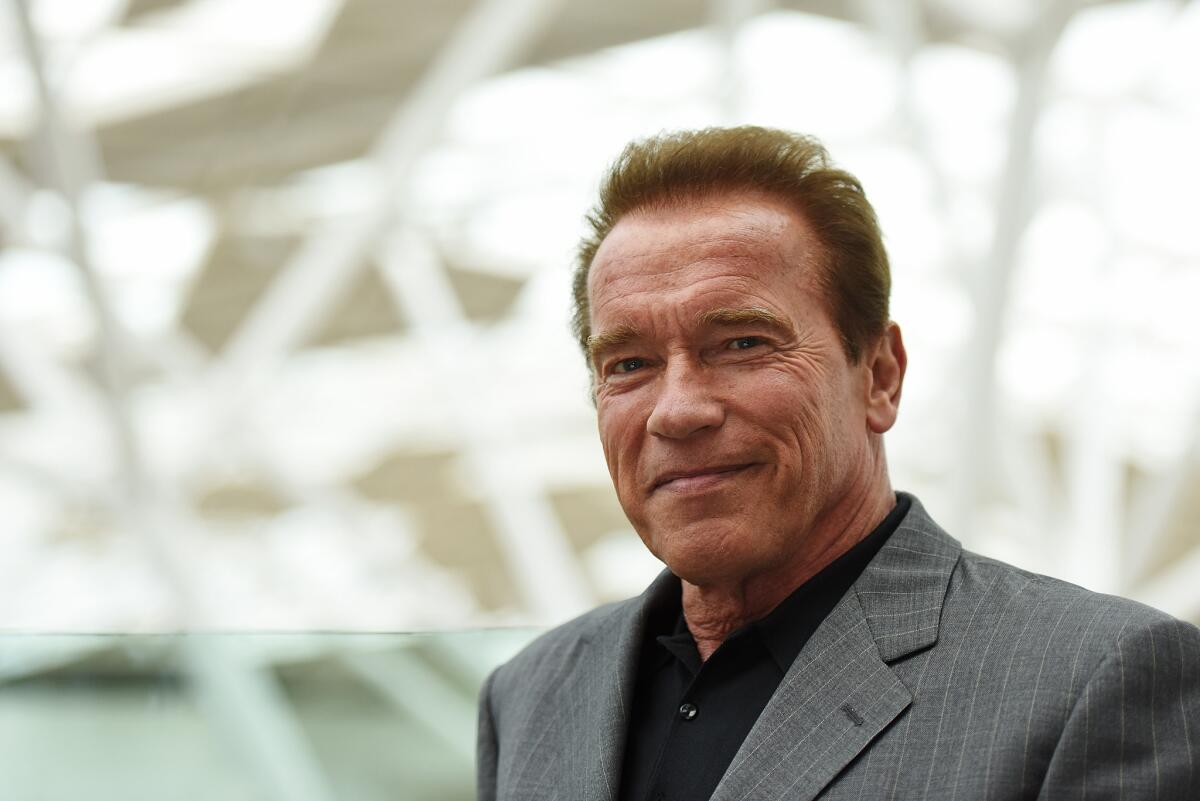
Former Gov. Arnold Schwarzenegger, who made a political career out of not toeing the party line of his fellow Republicans, said it’s largely a function of having grown up in a country with very different views on social and economic policy than those in the United States.
“I mostly argue with myself,” Schwarzenegger said on the Politico “Off Message” podcast that published on Tuesday. “There’s the Austrian Arnold and the American Arnold, right?”
The two-term governor said his embracing of after-school programs, which he convinced voters to fund with taxpayer dollars in a 2002 ballot initiative, did not necessarily fit with his otherwise Republican principles about families taking care of their own children.
“The reality out there is a little different,” he said.
Schwarzenegger was on hand Tuesday for Gov. Jerry Brown’s signing of an extension of the state’s cap-and-trade climate program in San Francisco. It was Schwarzenegger who, along with legislative Democrats, championed the original program in 2006.
The former governor again insisted in the podcast that he has no interest in any political job open to him, confirming his announcement earlier this year of being disinterested in running for the U.S. Senate. He’s barred by the Constitution from running for president, and by term limits from running again for governor.
“I would have liked to stay on being governor,” he said. “Because the funny thing is, when you get into this, is you realize very quickly that you want to continue staying on, because you can never get everything done that is on your checklist.”
- Share via
Backers of another shot at a ‘Calexit’ ballot measure can now gather signatures
Supporters of a plan for California to become independent from the United States are now allowed to gather signatures for their ballot measure.
On Tuesday afternoon, Atty. Gen. Xavier Becerra’s office released an official title and summary for the initiative, now called the “California Autonomy From Federal Government” initiative.
The proposal, scaled back from an initially more aggressive version, would direct California’s governor to negotiate more autonomy from the federal government, including potentially putting forward a ballot measure to declare independence.
The initiative wouldn’t necessarily result in California exiting the country, but could allow the state to be a “fully functioning sovereign and autonomous nation” within the U.S.
Backers of the plan, known informally as “Calexit” have 180 days to collect nearly 600,000 valid signatures for the initiative to go on the 2018 ballot.

The initiative’s fiscal analysis says it would cost the state at least $1.25 million a year for an advisory commission to assist the governor on California’s independence plus “unknown, potentially major, fiscal effects if California voters approved changes to the state’s relationship with the United States at a future election after the approval of this measure.”
The earlier effort for a more aggressive ballot measure was pulled by its backers less than three months after it got the green light to start gathering signatures.
- Share via
Rep. Adam Schiff tries to raise money off Trump’s critical tweet
House Select Intelligence Committee ranking Democrat Adam B. Schiff is using the spotlight from a President Trump tweet that deemed him “sleazy” to raise some campaign cash.
Trump on Monday morning used Twitter to call out Schiff as “sleazy” and “totally biased,” saying he spends too much time on television. It again turned attention toward the Burbank Democrat who is helping to lead the House investigation into Russian attempts to interfere with the 2016 election.
Schiff responded on his official House Twitter account, saying the comment was “beneath the dignity of the office.” Within hours, his campaign Twitter account was promoting an ad asking people to “chip in” and “Stand with Adam.”
We won’t know what he raised from the targeted Twitter ads until the next campaign finance reports are filed in October, but Schiff has raised $840,339 since the beginning of the year and had $2.57 million in the bank as of June 30.
His reliably Democratic seat isn’t considered to be at risk in the 2018 midterm election. But for high-ranking members of Congress, the ability to raise funds, and donate to more vulnerable members, is a way to demonstrate their power.
The money could also help fund a potential run for the U.S. Senate if California’s Sen. Dianne Feinstein retires. Schiff is high on the list of Democrats considered interested in running for the seat.
- Share via
California’s secretary of state sticks to his refusal to give data to President Trump’s voter fraud panel
- Share via
Gov. Jerry Brown signs climate change legislation to extend California’s cap-and-trade program
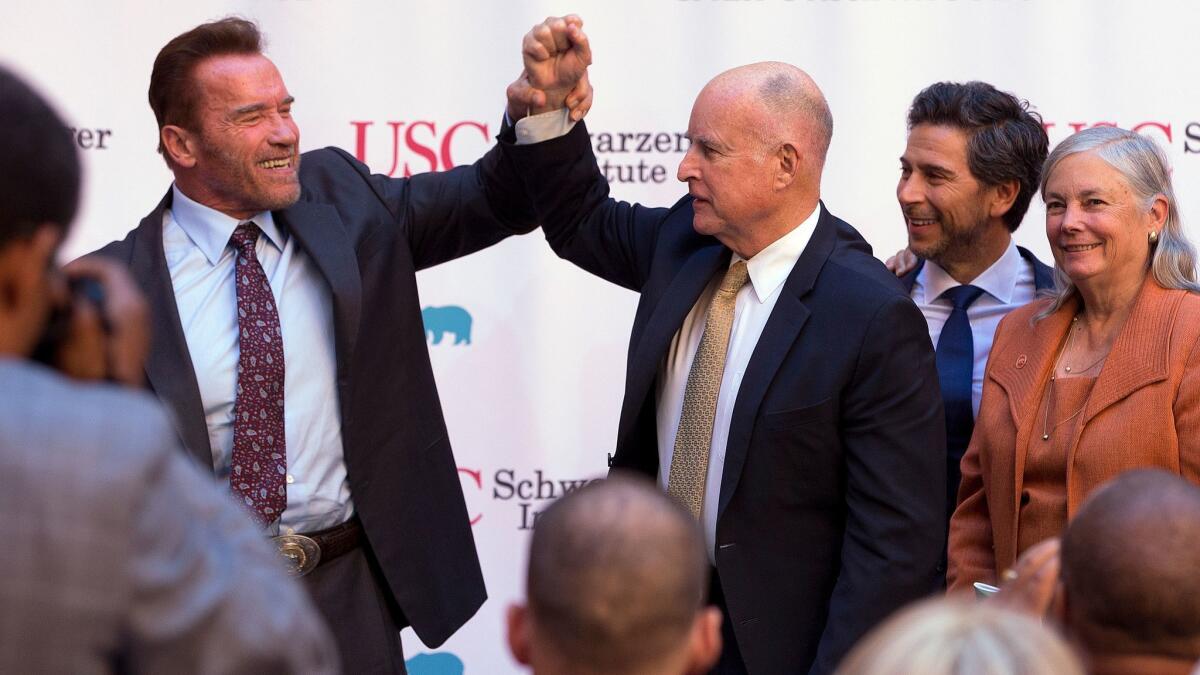
Gov. Jerry Brown signed legislation on Tuesday to extend California’s cap-and-trade program, solidifying the state’s battle against global warming as President Trump withdraws from the fight in Washington.
The legislation, Assembly Bill 398, will keep cap and trade operating until 2030 rather than letting it expire in 2020. The five-year-old program, the only one of its kind in the country, requires companies to buy permits to release greenhouse gas emissions.
“You’re here witnessing one of the key milestones in turning around this carbonized world into a decarbonized sustainable future,” Brown said.
It was the same location used by former Gov. Arnold Schwarzenegger in 2006 when he signed Assembly Bill 32, which provided the foundation for cap and trade. Schwarzenegger, a Republican, joined Brown on Tuesday, providing a bipartisan display of continuity.
Cap and trade was hotly debated in Sacramento, with some environmental activists fearing the new legislation wouldn’t be stringent enough and some conservatives warning about increased costs for Californians. But Brown pieced together a broad coalition to pass the legislation, winning over several Republicans, national environmental groups and major business organizations.
- Share via
As candidates for governor are pressed on affirmative action, Antonio Villaraigosa says it’s vital to California
Gubernatorial candidates, who have been pressed to offer their thoughts on affirmative action by Latino and black state lawmakers, began to weigh in Monday evening.
Antonio Villaraigosa, the former mayor of Los Angeles, gave the most concrete response.
“Mayor Villaraigosa agrees with both caucuses that keeping this issue at the forefront is vital to the future of California,” a campaign spokeswoman said in a statement. “He went to UCLA on an affirmative action program and was on the frontline against Prop. 209. Villaraigosa believes California can’t truly be progressive unless we’re all making progress together, which means we must support and expand programs that lift more families into the middle class.”
Villaraigosa was responding to a questionnaire sent to six Democratic and Republican gubernatorial candidates about affirmative action and the ramifications of a 1996 voter-approved law that banned it in publicly funded institutions of higher education.
The letter by the chairmen of the Latino and black legislative caucuses, which was mailed Friday, injects a potentially volatile racial issue that has previously splintered California Democrats into the 2018 contest.
The questions also raise a divisive 2014 effort to repeal the ban on affirmative action.
While polling shows that Democratic voters tend to favor efforts to increase opportunities for underrepresented minorities, schisms emerged between Latino and black lawmakers, and their Asian American colleagues, when Democrats tried to repeal the ban. It was ultimately shelved.
A spokesman for GOP candidate John Cox used the letter to poke the Latino caucus for not being inclusive. (The caucus has come under fire for not including Republican Assemblyman Rocky Chavez of Oceanside.)
“We did not receive this questionnaire from the caucuses, but suggest that the Latino caucus take the first step towards greater diversity by allowing Republicans to join their closed caucuses,” spokesman Matt Shupe said.
Representatives for Lt. Gov. Gavin Newsom and former state schools chief Delaine Eastin, both Democrats, said they had not yet received the letter, while the campaigns for Democratic state Treasurer John Chiang and Republican Orange County Assemblyman Travis Allen did not respond to requests for comment.
- Share via
Special election date set to replace Jimmy Gomez in the Assembly
- Share via
Latino, black state lawmakers press California gubernatorial candidates on affirmative action
Latino and black state lawmakers are calling on gubernatorial candidates to publicly state their opinion about affirmative action, injecting into the 2018 contest a potentially volatile racial issue that has previously splintered California Democrats.
“Each of our caucuses, as you may know, is driven by a mission to further the interests of all Californians through advocacy for programs and policies that promote diversity and empowerment. To that end, we would appreciate your candid thoughts and official position on affirmative action and related topics,” wrote state Sen. Ben Hueso and state Assemblyman Chris Holden, the chairmen of the Latino and black legislative caucuses respectively, to the six most prominent gubernatorial candidates.
The candidates are being asked to describe their views on affirmative action, their thoughts on the ramifications of the 1996 law that bans its use at publicly funded colleges and universities, their track record on diversity and equity efforts, and specific proposals they would try to enact on such matters in schools, state government, businesses and nonprofits if elected governor.
A 2003 report by the University of California found that implementing race-neutral admissions policies led to a “substantial decline” in the proportion of black, Latino and American Indian students entering the system’s most selective institutions.
The question raises a 2014 effort led by Latino and black Democratic members of the Legislature to repeal the ban on affirmative action. While polling shows that Democratic voters tend to favor efforts to increase opportunities for underrepresented minorities, schisms emerged on racial lines in the party when state lawmakers tried to repeal the ban.
The measure quietly sailed through the state Senate before it caught the attention of Asian American activists, who vocally argued that their children would be harmed if affirmative action were reinstated.
On popular Chinese-language social media networks, some said the number of Asian students admitted to UC schools would be slashed, called the measure the “Yellow Peril Act” and compared it to the Chinese Exclusion Act of 1882, which restricted Chinese immigration.
The activism worked – Asian American senators who supported the move expressed new reservations, and others in the state Assembly vowed to oppose it, leading then-Assembly Speaker John Perez to shelve it.
The caucuses’ letter was mailed Friday to Democrats Gavin Newsom, Antonio Villaraigosa, John Chiang and Delaine Eastin, and Republicans John Cox and Travis Allen. Some of those campaigns did not respond to a request for comment on Monday, while others said they had not yet received the letter or were formulating a response.
- Share via
Kimberly Ellis to contest ruling that upheld her loss in race for California Democratic Party chair

The drama and division over the California Democratic Party chairperson’s election does not appear to be ending anytime soon.
Kimberly Ellis, who narrowly lost the race to lead the party, announced Monday that she planned to appeal a party committee’s affirmation of the election results two days ago, a potential precursor to a lawsuit.
“While I, perhaps more than anyone, want immediate closure, I also understand my tremendous responsibility to the thousands of delegates and supporters who are counting on us to see this through to its final conclusion. No doubt, this is not the easier path, but often times the righteous one is not,” she wrote in a fundraising plea to supporters. “To turn away now would be a betrayal to my own sense of integrity and ethics.”
The election took place during the state party’s annual convention in May, and longtime Democratic activist Eric Bauman was declared the winner. Ellis’ campaign has repeatedly contested the results, reviewed every ballot cast and called into question the validity of hundreds of votes.
On Saturday, the party’s compliance review commission held an all-day hearing in Sacramento to determine the fate of 355 ballots deemed questionable. In the end, 47 votes were invalidated — 25 for Bauman and 22 for Ellis. That action, however, did not change the outcome of the election. Bauman won by 1.9%
Ellis, a Bay Area Democrat, called the review an “inherently biased process” and said she would file an appeal within 12 days, though she said she didn’t expect the commission to overturn its decision. She alleges that the six-member commission includes several Bauman supporters. The members were appointed by former chairman John Burton.
The bitter campaign exposed schisms in the state Democratic Party that echo the divide between Hillary Clinton and Bernie Sanders’ supporters during the 2016 presidential primary. Some party leaders worry that the infighting will hobble the party, which dominates California politics and is at the center of the opposition to President Trump.
Ellis did not mention a lawsuit in Monday’s email to supporters, though she has previously indicated one was likely. She also warned state party officials that she and her supporters will remain active in trying to reshape the party.
“What happens next rests on a lot of shoulders because this progressive movement to redefine what it means to be a Democrat is not going away…because we are not going away,” Ellis wrote. “We’re going to organize for progressive policies and around candidates who share our vision and be vocal against those who don’t. We all agree that Democrats need to come together; the question is what are we truly fighting for? No more same old, same old. We must have the courage of our convictions for a bigger, better, bolder vision for California – and the rest of our nation.”
FOR THE RECORD
4:30 p.m.: A previous version of this post said Bauman won by less than 1%. He won by 1.9%
- Share via
Al Gore praises Gov. Jerry Brown for climate change victory while touting new documentary
Former Vice President Al Gore has been promoting a new documentary, “An Inconvenient Sequel” — the follow-up to his Oscar-winning film about climate change, “An Inconvenient Truth.” The media tour brought him on Monday to San Francisco, where he was interviewed on stage during an event organized by the Commonwealth Club.
California lawmakers just approved extending the cap-and-trade program, the centerpiece of the state’s global warming battle. Gore noted the victory for Gov. Jerry Brown.
Gore said he was optimistic that the United States could meet its climate goals under the Paris accord, despite some research suggesting otherwise.
Some of the questions and answers drew laughs from the crowd at the Marines’ Memorial Theater.
- Share via
Watch live: Former Vice President Al Gore talks about climate change in San Francisco
- Share via
At Comic-Con, California treasurer John Chiang explains what infrastructure repair has to do with superhero movies
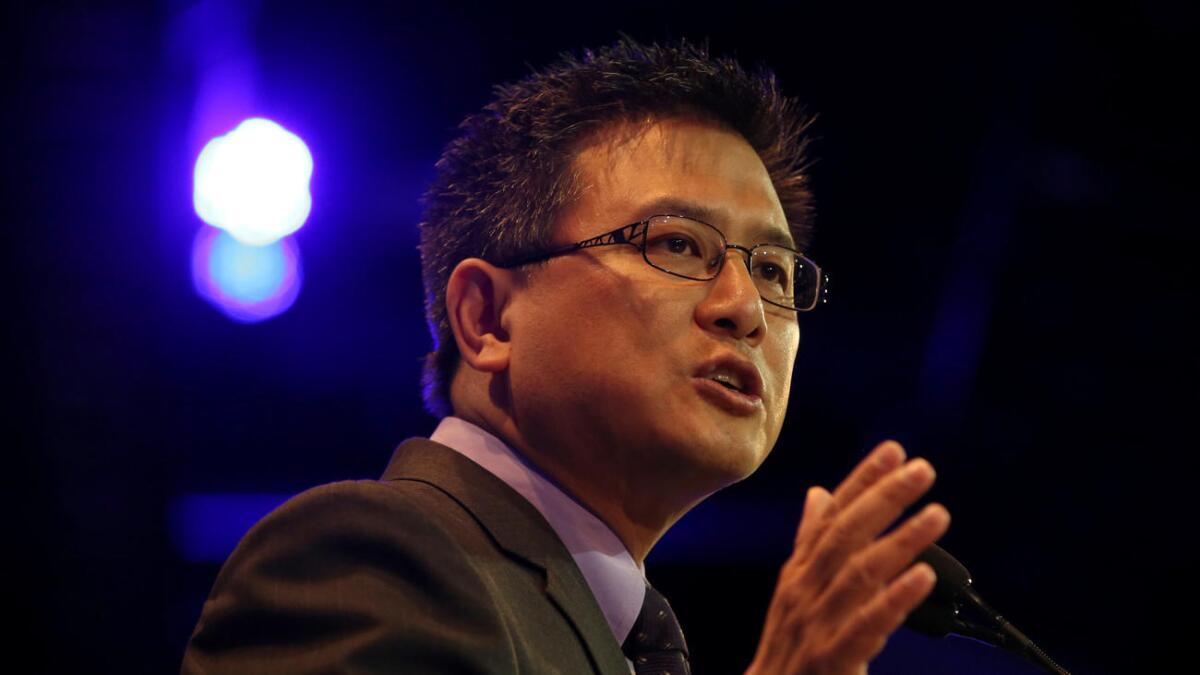
Comic-Con is, at its root, an escapist event for fans and obsessives of pop culture. This year it made room for public policy wonks as well.
In a lively panel called “Who Cleans Up the Mess?” at the conference Saturday morning in San Diego, a collection of politicians and civil servants looked at how civic life would be different if the dazzling superhero battles seen in blockbusters year after year came to life.
Among them was California Treasurer and gubernatorial candidate John Chiang, who used “X-Men” footage as a jumping-off point to talk about the need for infrastructure repair, and a scene of Tobey Maguire‘s Spider-Man damaging high-rises while trying to stop a runaway train to talk about the need for more affordable housing.
Another panelist, former California State Assemblyman Nathan Fletcher, referenced his military training in first restoring communications, order and human needs in crisis areas. And California Insurance Commissioner Dave Jones looked at the potential for a homeowner’s recovery.
- Share via
Early fundraising numbers show some congressional candidates building war chests, others with a long way to go
California’s congressional races are pivotal to Democratic efforts to flip the House, and there are already more than 60 candidates in more than a dozen battleground districts for the 2018 election.
Political insiders and donors are looking at the most recent campaign finance reports for indicators of who has fundraising ability. A strong early fundraising figure can deter potential rivals or draw support from the national political parties. Weak fundraising can encourage new opponents to enter the race.
- Share via
Major Democratic donor hosts Sen. Kamala Harris in the Hamptons as speculation mounts about her political future
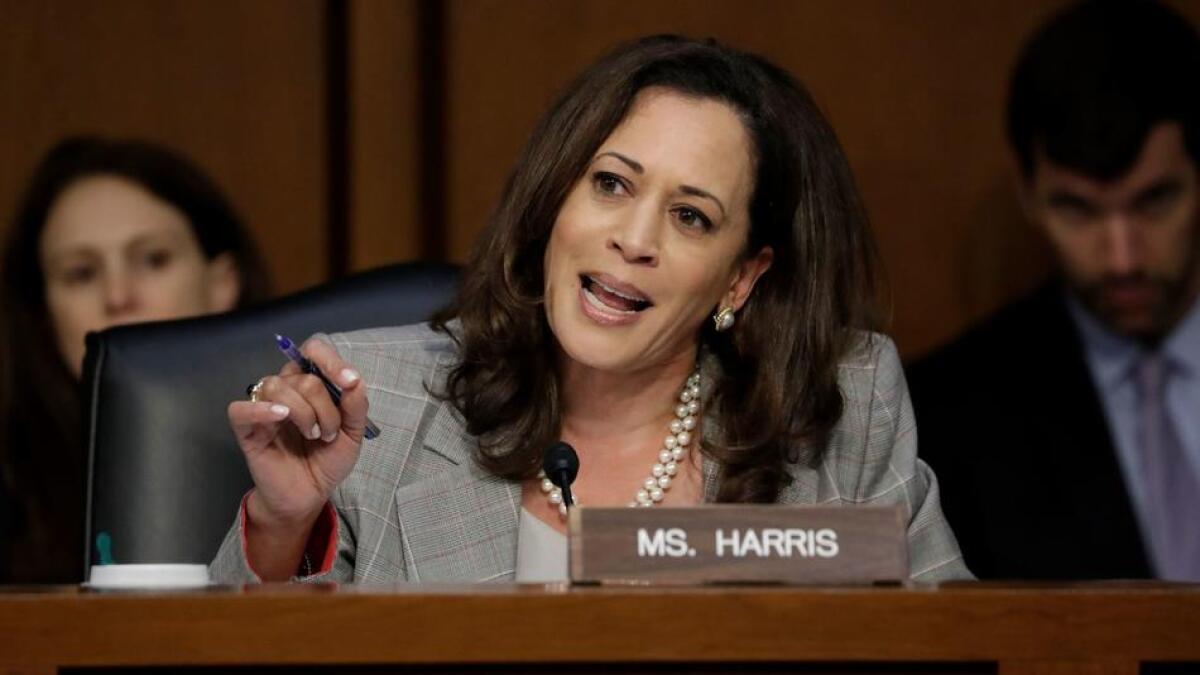
Speculation over California Sen. Kamala Harris’ political ambitions was stoked over the weekend by her appearance at the Hamptons home of major Democratic donor Michael Kempner, a top bundler for former President Obama and bankroller for liberal causes across the country.
“So great hosting Senator Kamala Harris @kamalaharris at our Hamptons summer home today,” he wrote in a private Instagram post that featured a picture of Harris, her husband, Douglas Emhoff, and Kempner and his wife, Jacqueline. “She’s a star!”
Kendall Glazer, granddaughter of billionaire Malcolm Glazer, the late owner of the Tampa Bay Buccaneers football team and the Manchester United soccer team, replied, “Yes she is!!”
Harris’ appearance at the Hamptons event comes as rumors swirl that she is pondering a 2020 presidential run. Harris and her team have tamped down on talk of her future, arguing that she is focused on her new Senate job that she was elected to in November.
But notable events in recent months, including her speech at the women’s march on the day following President Trump’s inauguration in January and repeated interruptions by male colleagues during Senate hearings earlier this year, have thrust Harris into the spotlight.
And the former California attorney general’s visit with Kempner is sure to add fuel to such speculation. Kempner has been a top fundraiser for Obama, Hillary Clinton, the Democratic National Committee, Senate and congressional candidates, and state parties and politicians across the country.
He was among Obama’s top bundlers, raising more than $4.5 million for the former president’s campaigns and aligned Democratic efforts between 2007 and September 2012, according to the New York Times.
- Share via
California’s Rep. Adam Schiff gets a Trump nickname: ‘Sleazy’
President Trump on Monday morning criticized the Democratic leader of the House investigation into Russian attempts to interfere with the 2016 election, calling Burbank Rep. Adam Schiff “sleazy” and “biased.”
Schiff is the highest ranking Democrat on the House Select Intelligence Committee, which is examining whether the Trump campaign assisted in Russia’s efforts. The committee is meeting behind closed doors Tuesday to hear from Trump’s son-in-law, Jared Kushner.
The investigation has catapulted Schiff into the national spotlight. Schiff has become a frequent guest on cable and Sunday morning news shows, and has turned to Twitter, the president’s preferred medium, to respond directly to Trump.
It is not clear whether a particular Schiff comment angered the president. But Schiff was on CBS’ “Face the Nation” on Sunday morning to discuss Kushner’s anticipated testimony and whether Department of Justice Special Counsel Robert Mueller should look into Trump’s finances as part of the Russia investigation.
Trump told the New York Times last week Mueller would be crossing a line if he looked at the financial dealings of Trump’s business or his family.
Schiff pushed back on that in the CBS interview, saying Trump’s finances would fit the scope of the FBI special investigation into the Trump campaign’s ties to Russia.
“The president is clearly worried that Bob Mueller’s going to be looking into allegations, for example, that the Russians may have laundered money through The Trump Organization [the president’s company]. That is really something in my opinion he needs to look at. Because what concerns me the most is anything that could be held over the president’s head that could influence U.S. policy,” Schiff said.
- Share via
Dave Cogdill, who paid a political price for his role in ending the 2009 budget crisis, dies at 66
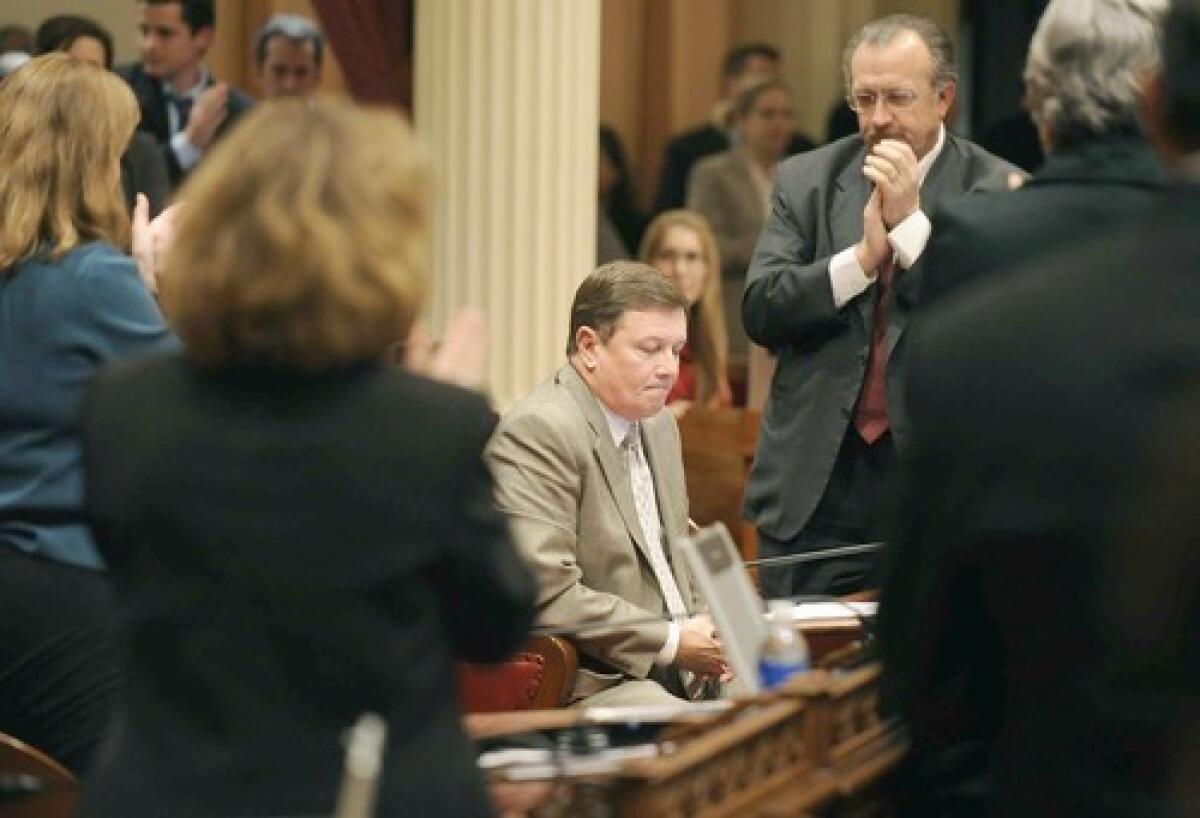
Dave Cogdill, a Central Valley Republican whose support for temporary taxes during the state’s economic meltdown ended his legislative career, died Sunday after battling pancreatic cancer, his family said. He was 66.
A real estate appraiser in Modesto, Cogdill served three terms in the state Assembly, and served as assessor of Stanislaus County after his departure from the Legislature. Since 2013, he has been the president and CEO of the California Building Industry Assn.
“He selflessly dedicated his life to his family and community,” said his son, David Cogdill Jr., in an emailed statement about his father’s death. “Throughout his life, he made such a difference in the lives of so many people.”
Cogdill was less than a year into his tenure as Republican leader of the state Senate when the state’s fiscal crisis, exacerbated by the national recession, forced lawmakers to consider a $42-billion deficit-reduction package in February 2009. The proposal included more than $14 billion in temporary taxes, embraced as a necessity by Democrats and Gov. Arnold Schwarzenegger but angrily denounced by most Republicans.
Cogdill helped craft the deal as one of the Legislature’s leaders, but found it a hard sell with his fellow GOP senators. Over the course of several days, no Republican in the Senate would join Cogdill in supporting the plan. Two other GOP senators ultimately agreed to the deal, which Schwarzenegger immediately signed into law.
Shortly after midnight on Feb. 15, 2009, a majority of members of Cogdill’s caucus fired him as leader during a heated closed-door meeting — during which reporters gathered in the hallway could hear the shouting. Cogdill calmly returned to his seat on the Senate floor as Sen. Dennis Hollingsworth (R-Murrieta) was announced as the Republican leader.
Three days later, Schwarzenegger praised Cogdill, telling reporters that the Republican “did what was right for the people.”
On Sunday, the former governor took to Twitter to praise his fellow Republican.
“Dave Cogdill was a fantastic friend, a great leader & a true public servant who put the people above all else,” Schwarzenegger wrote.
Gov. Jerry Brown echoed those comments, writing in a tweet that the late GOP leader “always put [California’s] interests above party.”
Cogdill did not run for reelection to the state Senate in 2010, and returned home to Modesto. That same year, he and the three other legislative leaders who crafted the multibillion dollar deficit package were awarded the Profile In Courage award by the John F. Kennedy Library Foundation.
“It’s an example for legislators across the country and also for Americans that we really need to solve the problems that our country faces,” said Caroline Kennedy, the late president’s daughter, in a 2010 television interview on the award presented to California’s four legislative leaders.
Cogdill is survived by his wife and two adult children.
Update July 24 9:51 a.m.: This story has been updated with comments from former Gov. Arnold Schwarzenegger and Gov. Jerry Brown. It was originally published at 10:21 a.m. on July 23.
- Share via
Eric Bauman confirmed as leader of California Democratic Party as rancor over close vote continues
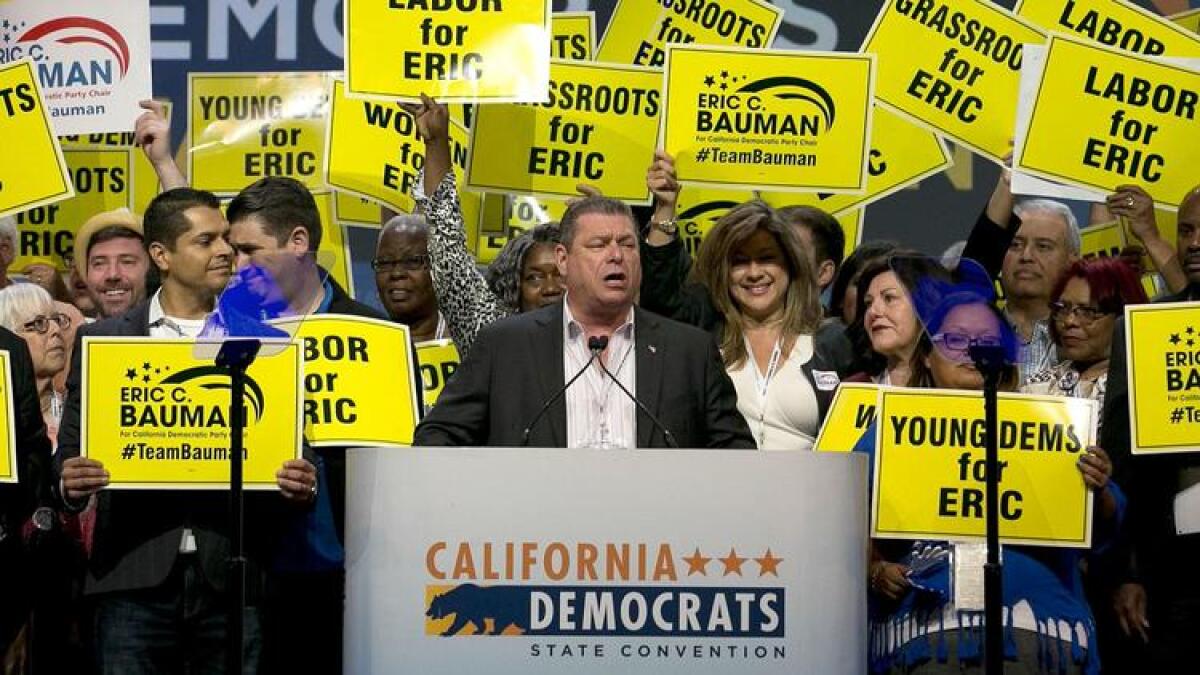

After spending weeks sifting through allegations of vote stuffing and corruption, a California Democratic Party panel on Saturday affirmed the election of Eric Bauman as the party leader.
The decision is not expected to bring the bitter fight over the election to an end.
Bay Area Democratic organizer Kimberly Ellis, who lost the race for party chair to Bauman by just 57 votes, has indicated she will likely mount a court challenge.
She has accused the party’s six-member compliance review commission of being biased in Bauman’s favor, and Ellis’ political consultant dismissed Saturday’s hearing as “bad political theater” before it even started.
The bitter fight has exposed schisms in the state Democratic Party that echo the divide between Hillary Clinton and Bernie Sanders’ supporters during the 2016 presidential primary. Some of the state’s top Democratic Party leaders and activists worry that the internal feud may fracture the party, which dominates California politics, and hobble the state’s role in opposing the policies of President Trump and the Republican Congress.
Christine Pelosi of San Francisco, chair of the party’s Women’s Caucus and daughter of House Minority Leader Nancy Pelosi, said she has urged Bauman and Ellis to do everything they can to mend the rift.
“There needs to be a very very strong showing form the party that the Ellis voters are included, are empowered,” Pelosi said.
At the very least, some of Ellis’ supporters should be appointed to lead the state party committees, allowing them to shape the party’s platform and policies, Pelosi said.
Shortly after the May election, Pelosi said she had urged Bauman to hire Ellis as a top party executive, hoping that would help bring Democrats together.
After recently reviewing every ballot cast in the election for chair, the party’s compliance review commission held an all-day hearing in Sacramento on Saturday to determine the fate of 355 ballots deemed questionable.
In the end, 47 votes were invalidated — 25 for Bauman and 22 for Ellis. That did not change the outcome of the election. Bauman won by 1.9%.
The hearing was chaired by party official Michael Wagaman, who said the review found no evidence of vote stuffing or ballots being destroyed, which were among the allegations made after the election. He added that there was “no evidence of bias” by the party to favor any one candidate.
Along with affirming Bauman’s election, the panel rejected a request by Ellis for an independent audit of the election. Wagaman said a thorough review was done by the commission and in full view of representatives from the Ellis and Bauman campaigns.
“It was a transparent process,” Wagaman said.
Ellis challenged the election results in June. She alleged that her campaign found hundreds of voting deficiencies during a review of the ballots and other election material. Those questionable votes may have swayed the election to Bauman, Ellis alleged.
The party held elections for chair and other officers during its annual convention in Sacramento in May. Nearly 3,000 party delegates cast ballots in the election.
There were a variety of reasons the panel disqualified the 47 ballots Saturday. In some cases, delegates failed to pay their party dues or receive an official waiver for the dues, which would make them ineligible to vote. Ballots also were tossed because proxy voters were determined to be ineligible, including a few who weren’t registered Democrats.
Among the ballots reviewed by the panel were those cast by Los Angeles Mayor Eric Garcetti, state Treasurer John Chiang, Assembly Speaker Anthony Rendon and Senate leader Kevin de León. All of them came under scrutiny because they had staff members sign them into the convention. All their votes were deemed valid.
However, the panel threw out the vote of Secretary of State Alex Padilla, the state’s chief elections officer. Padilla did not pay his party dues, the panel found.
FOR THE RECORD
July 24, 4:19 p.m.: A previous version of this post said Bauman won by less than 1%. He won by 1.9%.
UPDATES
3:20 p.m.: This story was updated with information about Secretary of State Alex Padilla.
- Share via
California Politics Podcast: The winners and losers in the new cap-and-trade agreement
No topic in Sacramento this year has been the focus of more intense, high-level negotiations than extending the state’s cap-and-trade program.
And the political ramifications of Monday’s final vote by the Legislature are likely to be felt for a long time.
This week’s California Politics Podcast is devoted entirely to digging deep into the bipartisan deal, one that extends the life of the state’s key climate change program by an additional decade.
The deal was a major victory for Gov. Jerry Brown, and put a handful of Republican legislators in the spotlight for their decision to cross the aisle and support a program that critics say will cost Californians money in the long run.
I’m joined by Times staff writer Melanie Mason, as well as Anthony York of the Grizzly Bear Project and Marisa Lagos of KQED News.
- Share via
Becerra and 19 other attorneys general pen letter to President Trump urging him to defend DACA
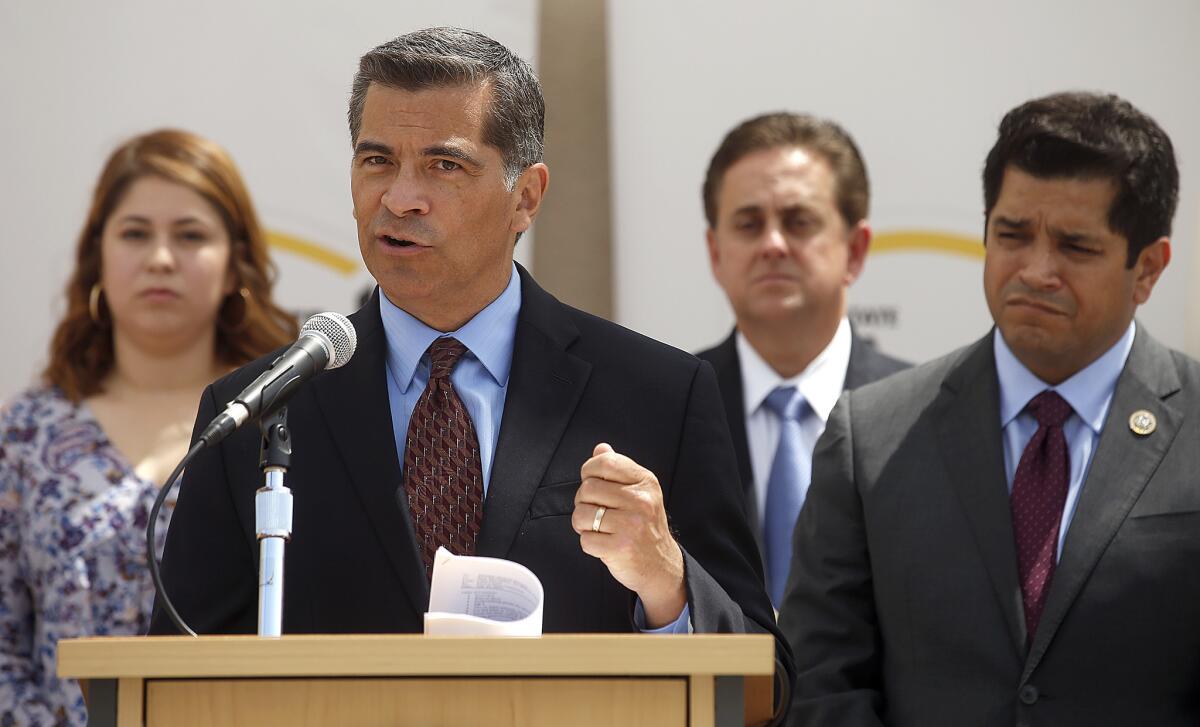
State Atty. Gen. Xavier Becerra and 19 of his counterparts from across the country sent President Trump a letter Friday urging his administration not to touch an Obama-era policy that shields as many as 750,000 young immigrants from deportation.
The letter comes a month after Texas and nine other states threatened to sue the Trump administration if President Obama’s landmark Deferred Action for Childhood Arrivals policy was not scrapped.
“We urge you to affirm America’s values and tradition as a nation of immigrants and make clear that you will not only continue DACA, but that you will defend it,” the attorneys general wrote. “The cost of not doing so would be too high for America, the economy, and for these young people.”
Becerra was met with cheers at Cal State L.A. when he told a crowd of students — including some DACA recipients — that he thought the program would survive legal challenges it could face in the future.
“It has been a great boon for the California and American economy to have the ‘Dreamers’ come out of the shadows, and so we are here to say we stand with them because they are working for us,” he said.
Becerra’s statements come after Trump and his administration have sent mixed messages about the future of the program, leaving many on both sides of the immigration debate frustrated.
The president has said DACA is “one of the most difficult subjects” he faces because there are “incredible kids.”
Becerra, a former congressman who was appointed California’s top law enforcement official after Kamala Harris was elected to the U.S. Senate, was joined by his newly elected successor Rep. Jimmy Gomez (D-Los Angeles).
Gomez, just two weeks into his new job, told the group of students Friday that he was looking into using his position on the House Oversight and Government Reform Committee to call for hearings on the Department of Homeland Security’s enforcement actions.
“Are they really going after DACA recipients and ‘Dreamers’? We are going to try and put them on the witness stand and really push on that,” he said.
“A lot of times the Trump administration says one thing and then they do something else over here so we have to show people what they are actually doing over here,” Gomez added. “So that is an idea we are kicking around in my office.”
Melody Klingenfuss, an organizer with the Coalition for Humane Immigrant Rights of Los Angeles who came to the U.S. from Guatemala at age 9, is among the DACA recipients.
She was pleased Becerra took a stance Friday.
“Having a public face to defend ‘Dreamers’ and who believes in the contributions we have made to this country is key,” she said. “We still have a long fight ahead of us.”
- Share via
Affluent Marin County can continue to limit home building under bill signed by Gov. Jerry Brown
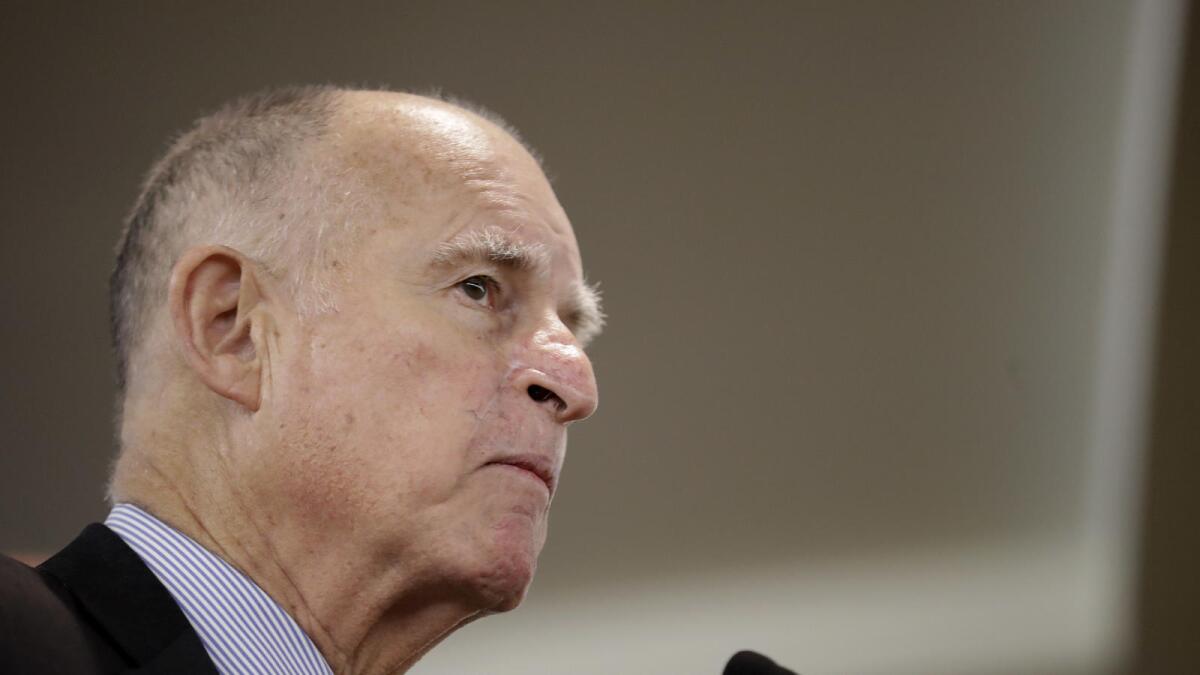
Marin County will continue to limit home building beyond what other regions of California are allowed under affordable housing laws after Gov. Jerry Brown signed legislation Friday afternoon.
The measure, Senate Bill 106, lets Marin’s largest cities and incorporated areas maintain extra restrictions on how many homes developers can build. Assemblyman Marc Levine (D-San Rafael) inserted the provision into the bill, which was tied to the state budget and didn’t have to go through the regular committee process.
Levine has argued that the measure would allow for more affordable housing in Marin, the state’s wealthiest county, because smaller buildings would lower construction costs. But housing advocates were universally opposed because they said it was counter to the state’s push for more development to stem a housing shortage.
Levine wrote a bill in 2014 that gave Marin an exemption from state housing laws until 2023. This measure extends that exemption for five more years.
- Share via
Gov. Jerry Brown marks the start of Caltrain’s electrification project with rare praise for the federal government
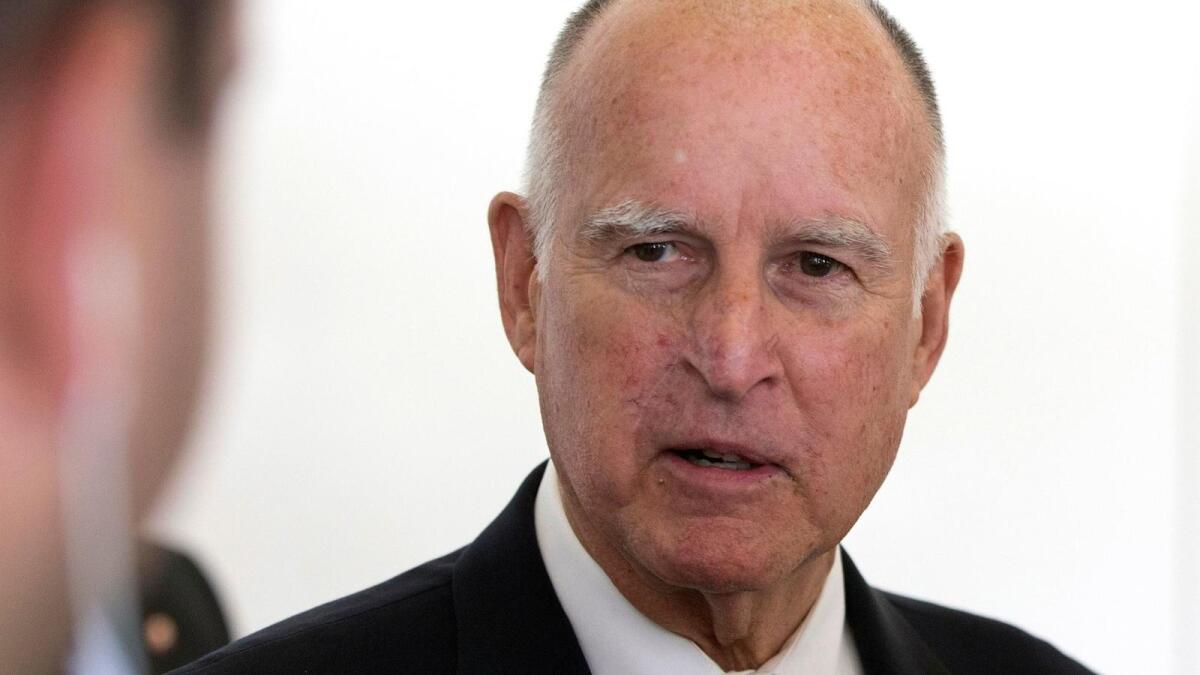
Celebrating rare cooperation between California and the Trump administration, Gov. Jerry Brown and federal officials on Friday marked the start of a more than $1.3-billion project to convert the Caltrain service between San Jose and San Francisco from diesel to electric trains.
The Brown administration, which has disagreed with Trump over issues ranging from climate change to immigration, joined congressional Democrats in aggressively lobbying the White House and U.S. Department of Transportation for federal funding of the project when it appeared to be in jeopardy.
“Today, we are recognizing a successful train [project],” Brown said at the ceremony at the Millbrae Caltrain station. “It’s about the future. It’s about clean air. It’s about efficiency, speed. It’s about not sitting on the freeway for a couple of hours bumper to bumper.”
With the state using money from bonds for its bullet train, the 50-mile project has been touted by supporters as an important step in converting systems for high-speed rail.
Eventually, the bullet train would use the same electrical system and the same tracks.
After Trump initially delayed a decision on the project in February, Brown met with the president’s Transportation secretary, Elaine Chao, and Majority Leader Kevin McCarthy in Washington, D.C., to seek approval of the grant.
Chao released the first $100 million and committed her department to prioritizing an additional $408 million in appropriations for the project in the future. Other money is being provided by local, regional and state agencies.
Caltrain serves some 65,000 riders every weekday from San Francisco to San Jose, a number that has nearly doubled in the last 10 years and is straining the system, Brown said.
Shortly after Trump took office, he proposed spending $1 trillion on infrastructure projects throughout the country. The Caltrain Peninsula Corridor Electrification Project was on a list of $100 million in key infrastructure projects submitted by Brown’s office to the federal government in February.
Brown said the federal government needs to do more for the nation’s infrastructure.
“This is a good example of cooperation between local, state and federal [agencies],” agencies, he said. “We need to do more of it, a hundred times more than what this train represents.”
- Share via
Assembly Republicans defend climate vote as ‘protecting Californians from higher costs’
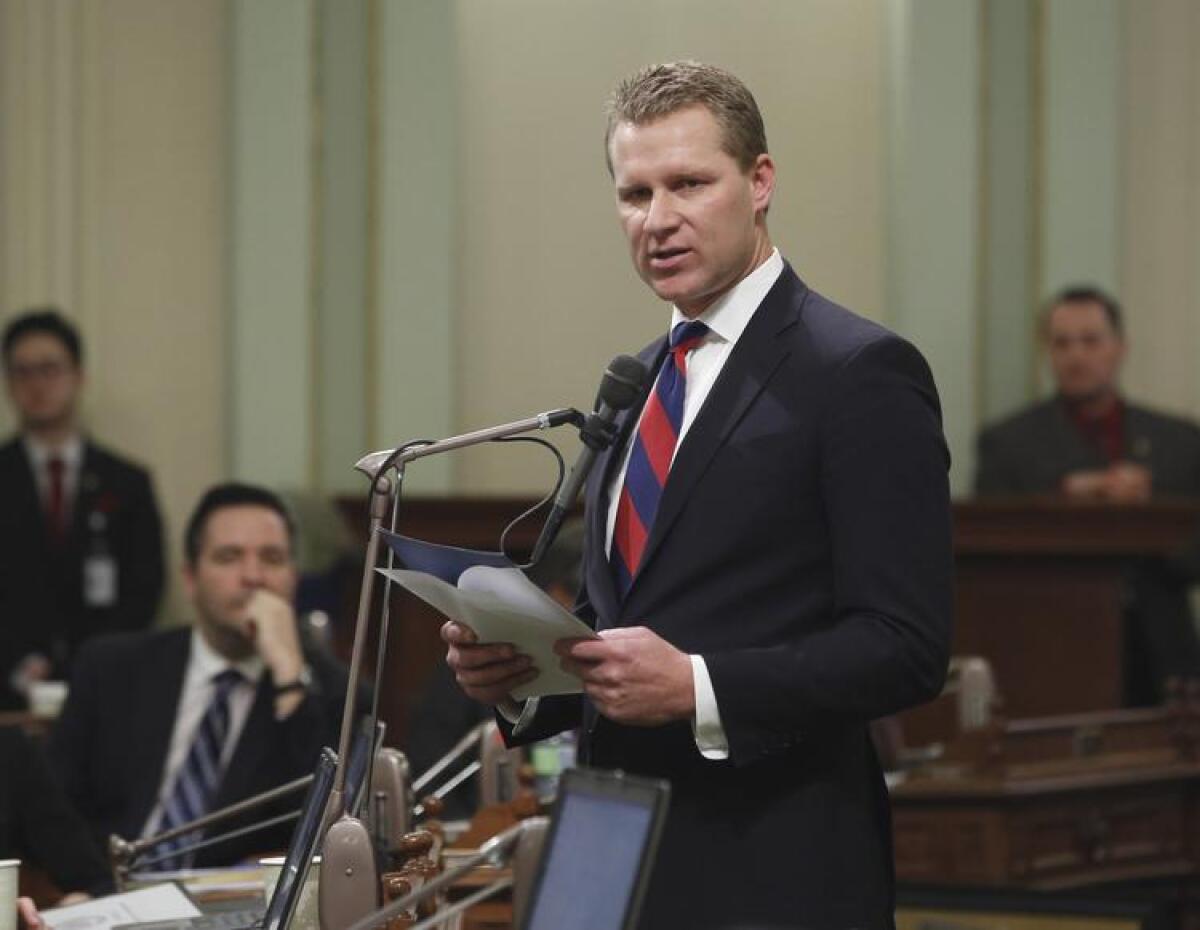
A cadre of Republicans have spent days taking slings and arrows after breaking with party activists and many of their colleagues to support California’s premiere climate change program.
Now some of them are defending themselves in the pages of the Wall Street Journal.
“We served our people and did our jobs as legislators by rolling back taxes, cutting regulations and protecting Californians from higher costs,” wrote Assembly Republican Leader Chad Mayes of Yucca Valley and Assemblyman Rocky Chavez of Oceanside, two of the eight Republicans who voted for the legislation on Monday.
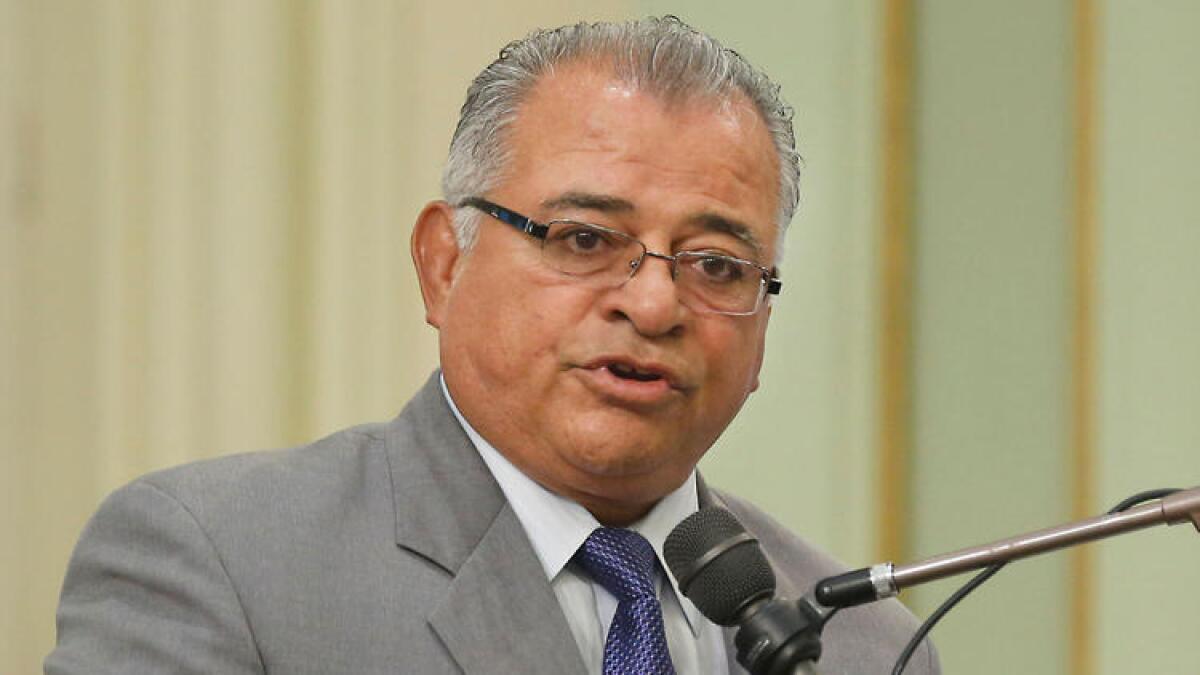
The Journal had criticized some Republicans for supporting the extension of the state’s cap-and-trade program, which requires companies to buy permits to release greenhouse gas emissions. The newspaper’s editorial board said California Republicans are “so beaten down in the minority that they now confuse surrender with victory.”
Cap and trade could boost gas prices by 24 to 73 cents a gallon by 2031, according to the nonpartisan Legislative Analyst’s Office.
But Mayes and Chavez argued that the program is preferable to other, more costly regulations that would have been needed to meet the state’s climate goals, which became law last year. The final legislation also included two other Republican goals: the rollback of a fire prevention fee, which has been levied on landowners, and the extension of a tax credit for manufacturers.
“Republicans in California must live with the realities of a deep-blue Democratic state,” they wrote. “This isn’t Washington, D.C., or Kansas. We have to cut taxes and regulations every chance we get.”
- Share via
After bitter fight, decision expected on challenge to election of California Democratic Party leader

A California Democratic Party commission reviewing allegations of voting irregularities in the election of a new leader is expected to announce its findings on Saturday.
Democratic organizer Kimberly Ellis, who narrowly lost the race for party chair to Eric Bauman, formally challenged the election results in June. Ellis blamed her 62-vote loss on possible ballot stuffing and other voting improprieties.
Earlier this month, the party’s compliance review commission inspected the nearly 3,000 ballots cast by Democratic Party delegates and found 223 ballots that required further review — 104 were cast for Ellis and 119 for Bauman.
The commission has since been contacting those delegates. In some cases, there were questions about whether a delegate had paid their party dues, which may be required to cast a ballot, or whether a proxy voter was properly registered.
The commission will review those ballots Saturday morning at state party headquarters in Sacramento. The 10 a.m. hearing is not open to the public but will be broadcast on the party’s Facebook page.
“We have full confidence in the Compliance Review Commission, which has conducted an exhaustive, open audit in full view of representatives of each candidate’s campaign in accordance with our party’s bylaws,” party spokesman Mike Roth said in a statement.
Ellis, however, already is indicating that she will not accept the findings of the commission, which she has accused of being biased in Bauman’s favor.
“Despite the toxic response from some in leadership, the CDP by its own admission has validated our original concerns. As demonstrated by their own actions, the CDP has proven that there is little to no interest in getting to the truth or resolving this matter outside the courts,” said Joe Macaluso, Ellis’ campaign advisor. “What we’re watching is bad political theater. Very few have real faith in the independence, authenticity and fairness of Saturday’s matinee.”
Bauman has been serving as party chairman since the election. Ellis had called on the party to have an independent audit of the election done, but Bauman rejected that request, saying the party already has a process in place to review contested elections.
The party’s compliance review commission is made up of six members who were appointed during former Chairman John Burton’s tenure.
The bitter fight to be the next state party leader highlights the lingering tensions in the Democratic Party that arose during the 2016 presidential primary when Hillary Clinton beat Vermont Sen. Bernie Sanders for the nomination.
UPDATE
1:38 p.m.: This post was updated to include a comment from the Ellis campaign.
- Share via
Rep. Dana Rohrabacher draws a Republican challenger in 48th Congressional District
Following a spate of Democrats announcing runs in the 48th Congressional District, GOP Rep. Dana Rohrabacher now has a challenger from his own party.
Orange County businessman Stelian Onufrei, a Romanian immigrant who owns a construction business, announced Thursday that he’s running against the Costa Mesa Republican.
In a statement, Onufrei, 52, called Rohrabacher an “entrenched career politician” who has “become a political lightning rod.” Much of that controversy has stemmed from critiques on the left, particularly over Rohrabacher’s long-held belief that the U.S. should normalize relations with Russia.
Onufrei, who like many candidates this cycle has never run for public office before, said tax reform, “restoring religious freedoms” and instituting congressional term limits would be among his top priorities if elected. (The last one would probably require a constitutional amendment.)
Onufrei joins the race just after the latest campaign finance filing deadline, but said he would contribute $500,000 of his own money to fund his run.
- Share via
For young California homeowners, a proposed 2018 initiative could make buying a new house a lot less expensive

Under a ballot measure filed Thursday, California’s landmark Proposition 13 property tax breaks would be extended to young homeowners who sell their residence and buy a new one.
The proposal, which aims for a spot on the November 2018 statewide ballot, would allow homeowners of any age to carry a portion of their existing property tax rate across county lines when they purchase a new house. Homeowners often are reluctant to switch houses, given that Proposition 13’s cap on annual property taxes ends once they sell and move somewhere else.
“A lot of people kind of feel locked into their properties,” said Alex Creel, a lobbyist for the California Assn. of Realtors, who filed the proposed initiative. “This will free up those folks.”
The new tax rate, Creel said, would be based on a “blended” value of the old and new properties, and could be considerably lower than the market rate property tax otherwise assessed once a new home is bought.
Creel filed three different versions of the proposal, all of which would create tax incentives for selling one house and buying another.
Homeowners older than 55 in certain counties can already transfer existing property tax rates to a new home of equal or less value. Creel’s initiatives, though, would expand the program. One version would retain the age restriction, but make the program available statewide. Two other versions would remove all age limits, likely enticing young homeowners to sell and buy homes.
Unlike current law, the proposal would allow homeowners to take advantage of the tax break as many times as they want.
Creel said the broader impact on statewide property tax revenue is unclear, and that the realtors group won’t decide until the fall whether to mount a political campaign to place one of them on the 2018 ballot.
- Share via
A top Assembly Republican quits her leadership role to protest climate vote
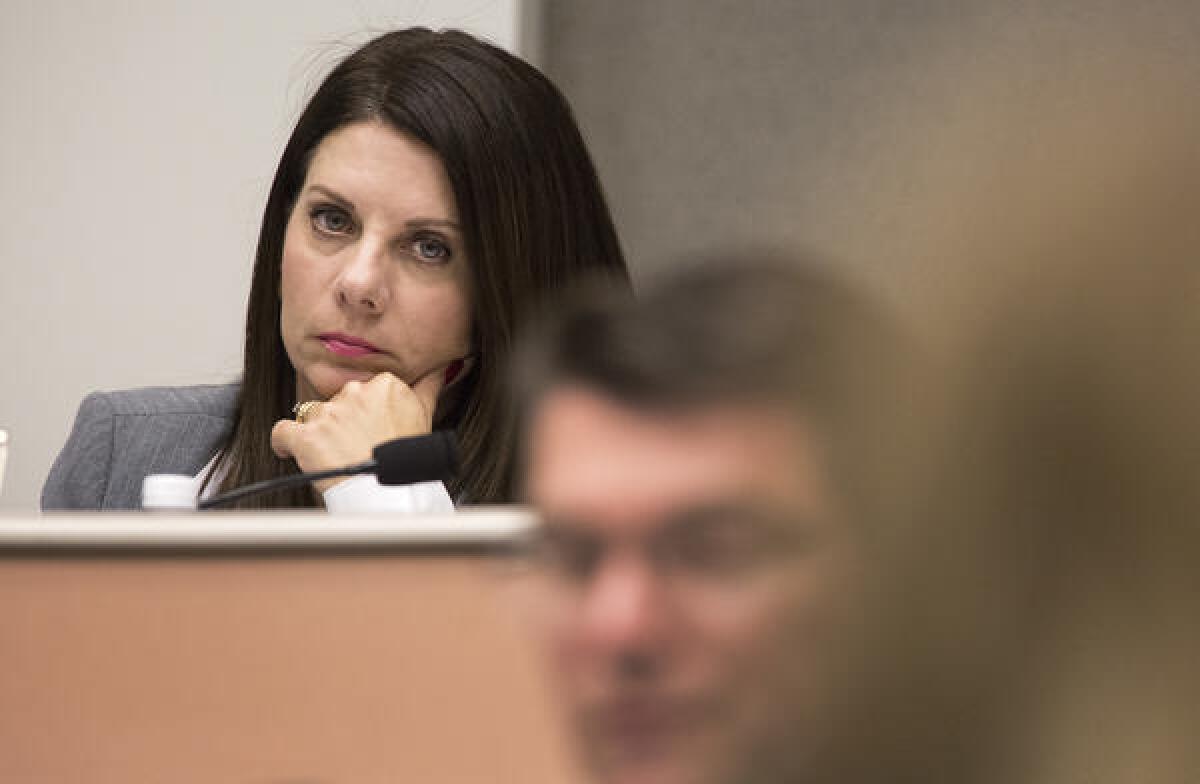
Fallout continued Thursday over Assembly Republican leader Chad Mayes’ support for the cap-and-trade extension, with one of his top lieutenants resigning her leadership position in protest.
Assemblywoman Melissa Melendez, from Lake Elsinore, was among the majority of Republicans who voted against the bill Monday because of concerns that it would increase gas and energy costs for Californians. In total, eight Republicans joined most of the Democrats backing the measure.
“Californians are struggling to make ends meet, and unfortunately, what I have witnessed by the Assembly Republican Leader is a dereliction of duty to preserve and promote the American Dream for every single Californian,” Melendez said in a statement.
She stepped down as the assistant Republican leader. The move came a few hours after Mayes talked with the Assembly GOP and said everything was “all good.”
“Assemblyman Mayes’ actions on cap-and-trade demonstrate we no longer share the same leadership principles,” she said. “I was elected by the people of my district to fight for a more affordable and decent California, a place where every Californian knows their child will have a better life than their own. Regrettably, I can no longer, in good conscience, serve as the Assistant Republican Leader.”
Mayes was not immediately available for comment.
- Share via
California House members sued for displaying rainbow flags outside their Capitol offices
Southern California Reps. Susan Davis, Alan Lowenthal and two other House members have been sued for displaying a rainbow flag in the hallway outside their Capitol Hill offices.
The plaintiff is Chris Sevier, an attorney who has an ongoing campaign against same-sex marriage and has also unsuccessfully sued states for the right to marry a laptop computer in order to try to make a point about rulings on same-sex marriage.
Besides Davis of San Diego and Lowenthal of Long Beach, Sevier sued Reps. Don Beyer of Virginia and Earl Blumenauer of Oregon. All are Democrats.
Sevier’s 38-page complaint asks the federal district court in Washington, D.C., to determine that “‘homosexuality’ and other forms of self-asserted sex-based identity narratives are a ‘religion,’” and that the colorful banners are a religious symbol for the “homosexual denomination.” He is seeking to force the members of Congress to remove the flags.
- Share via
Ed Royce stopped Dana Rohrabacher from going to Russia last spring, senior GOP aide says
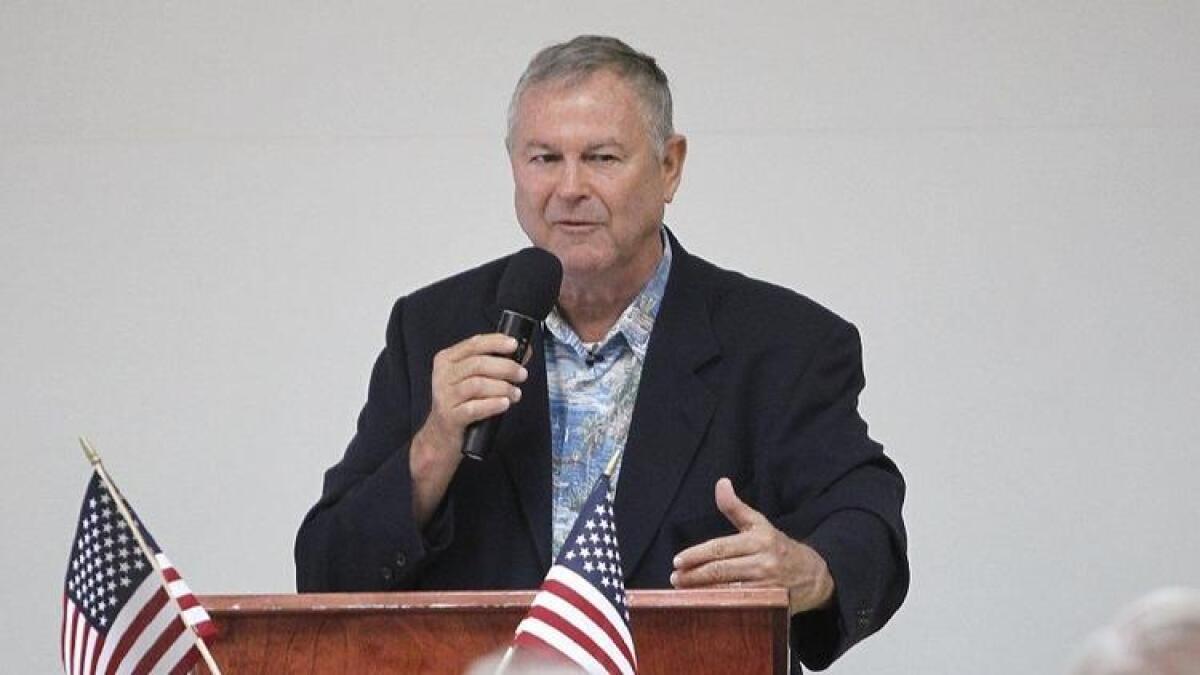
Rep. Dana Rohrabacher has made several trips to Moscow during his 15 terms in Congress.
But the chairman of the House Foreign Affairs Subcommittee on Europe, Eurasia and Emerging Threats canceled a publicly announced trip to meet with the Russian parliament last spring with little notice.
Rohrabacher (R-Costa Mesa) told the Times on Wednesday that he decided not to go because he was worried the national focus on Russia would make it difficult to have serious conversations with Russian officials.
“In the middle of a chaotic, public brouhaha, you’re not going to be able to get the serious job done that you need to get done,” he said.
But a senior House GOP aide who asked not to be identified because he was not authorized to speak to reporters said Thursday it was House Foreign Affairs Committee Chairman Ed Royce (R-Fullerton) who declined Rohrabacher’s request to travel to Moscow shortly after President Trump’s inauguration. The aide said such a trip would have been inappropriate.
At the time, Congress was just beginning its investigations into Russian attempts to interfere in the 2016 election.
Rohrabacher’s interest in a friendlier relationship with Russia has puzzled the GOP establishment for years. Rohrabacher’s spokesman, Ken Grubbs, said Thursday both Southern California congressmen agreed it would be best for Rohrabacher to stay home.
“Dana and Ed were of one mind at the time,” he said.
In a related matter, longtime Rohrabacher committee aide and ally Paul Behrends no longer works on the Foreign Affairs Committee, a committee spokesman confirmed. The spokesman said he couldn’t comment further on a personnel matter. Grubbs said Rohrabacher wasn’t notified of the change in advance.
Behrends is a shared employee, meaning he worked for both the committee and Rohrabacher, and Grubbs said it “is not quite settled yet” what Behrends’ employment status is if he’s not working for the committee.
At least three news outlets have refreshed previous reports in the last few weeks about Rohrabacher’s plan to hold a subcommittee hearing on removing Russian lawyer Sergei Magnitsky’s name from an anti-corruption law opposed by the Russian government. The Daily Beast reported that the meeting was arranged at the prompting of Russian officials, who hoped it would change minds about the law’s sanctions.
Magnitsky was a whistle-blower who alleged officials in Russian President Vladimir Putin’s government stole $230 million. He died in prison under suspicious circumstances.
The act named after him banned officials accused of involvement in his death from visiting the U.S. and using American banks. In response, Putin banned adoptions of Russian children by Americans. People with connections to the Russian government have been lobbying against the Magnitsky Act ever since, and according to recent media reports, Behrends was a main point of contact for them on Capitol Hill, and arranged meetings with Rohrabacher and Russian officials overseas.
Several of the people with Russian ties who lobbied Rohrabacher against the act also attended a Trump Tower meeting with Trump’s eldest son, Donald Trump Jr., and other campaign officials in June 2016, news of which has catapulted Rohrabacher’s legendary affinity for a better relationship with Russia into the national spotlight.
- Share via
Assembly GOP leader Chad Mayes survives challenge over cap-and-trade vote, but party activists will push for his removal
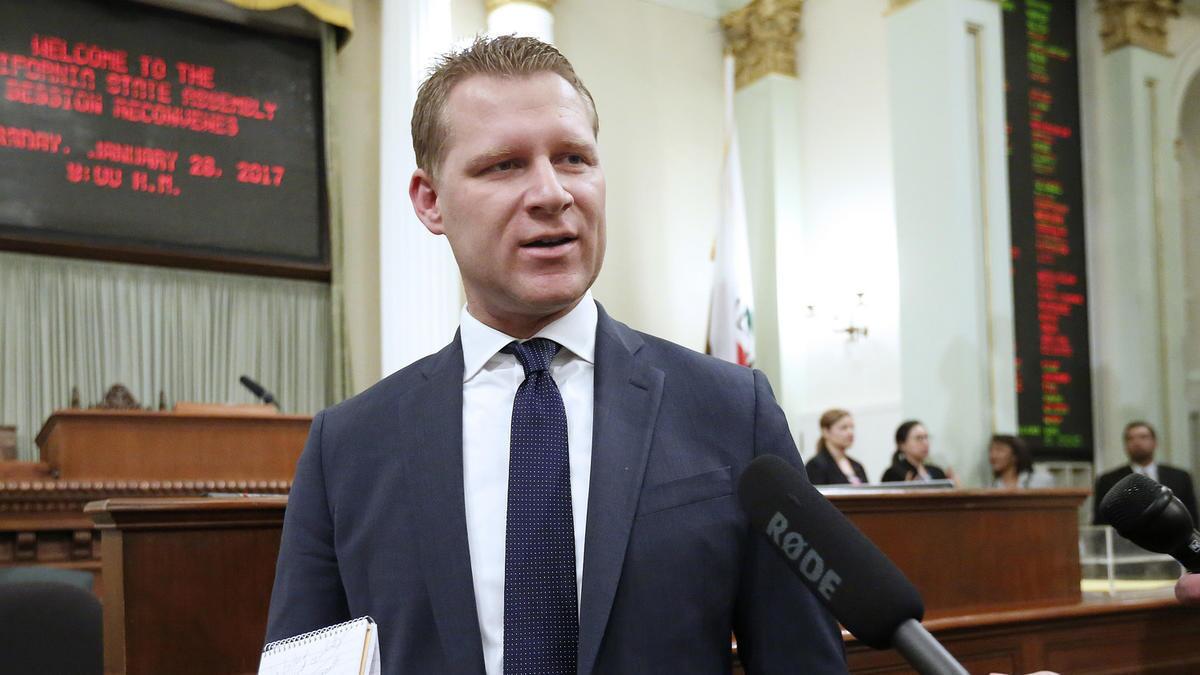
Under pressure from some party activists to step down, Assembly Republican leader Chad Mayes of Yucca Valley met with his caucus for more than an hour Thursday and emerged saying he remains its leader.
“It’s all good. ... I’m the leader,” Mayes told reporters after the closed session meeting.
The unscheduled gathering of the 25-member Assembly Republican Caucus is not expected to relieve pressure on the leader who has been criticized for standing with Gov. Jerry Brown as he and six other Assembly Republicans voted to extend California’s cap-and-trade program.
Harmeet Dhillon, a member of the Republican National Committee, had called Wednesday night for Mayes to be replaced. She said she had support from enough members of the California Republican Party board to conduct an emergency meeting by phone, but that Mayes called the caucus before it could happen. Dhillon said she would bring the matter before the board during the next month, rather than hold an emergency recommendation that Mayes be replaced.
Dhillon said there were “a number of legislators” who had told her they wanted to vote Mayes out of the leadership role, but that by calling a quick meeting, Mayes acted before any challengers could muster the votes.
“I think it’s a weak move,” she said of Mayes forcing an early choice. “What eventually happens is leaders who vote against the interests of their caucus and who take a minority vote like that and present that that’s the party’s position, they lose their leadership position. I’m going to keep campaigning for him to lose it.”
The Assembly heads out on a monthlong vacation Friday and Dhillon said the matter will be revived when lawmakers return.
Most Republicans opposed extending the program, which requires oil companies and others to purchase permits to emit greenhouse gases. Republican lawmakers cited independent studies that the program could eventually increase the cost of gas by 73 cents per gallon.
“The people I’ve talked to in California are furious at the cap-and-trade vote,” said Assemblyman Travis Allen (R-Huntington Beach) on Wednesday. “They feel betrayed by their elected officials that were sent to represent them.”
After the caucus meeting Thursday, Allen would only say “at the moment, [the caucus] is having conversations.”
Assemblyman Brian Dahle (R-Bieber) said there was no vote on the leadership in the caucus meeting.
“We just talked about a change of leadership and none of that took place,” he said. “I got the feeling there were a lot of people who wanted a better line of communication between all of us. And we’re probably going to do that more often, I think.”
- Share via
Sen. Kamala Harris wants to study whether cash bail is the right way to decide if someone stays in jail pretrial
- Share via
California’s newly revised rules on recall elections are being challenged in court
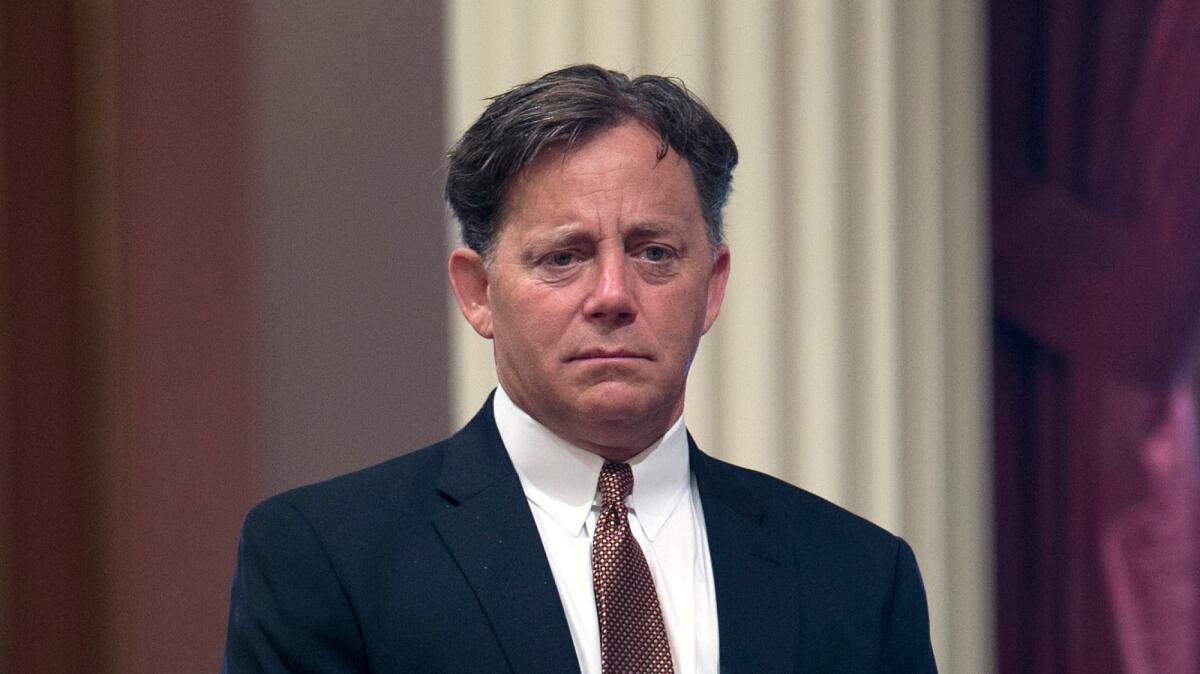
Backers of an effort to remove an Orange County Democrat from office believe their effort would have forced a special election this November, if not for a change in state election law enacted last month.
On Thursday, they took their complaint to a state appeals court.
The lawsuit seeks to invalidate the law signed by Gov. Jerry Brown that could delay a recall election against state Sen. Josh Newman (D-Fullerton) until next year.
- Share via
Tom Steyer rebrands his political group for anti-Trump mission
Tom Steyer, a major donor to Democratic causes and a potential candidate for California governor, has long signaled his political ambitions stretched far beyond climate change, his signature issue.
Now he’s making it official, rebranding his organization as NextGen America instead of NextGen Climate. The new name reflects a broader desire to oppose President Trump and support progressive policies.
“This is a fight for the soul of American democracy, and we have expanded our mission to meet the challenge at hand,” Steyer said in a statement.
Steyer backed efforts to extend California’s cap-and-trade program, which lawmakers approved on Monday. He’s also pushing new initiatives on economic inequality and healthcare.
Last month, Steyer launched NextGen Rising, another campaign to motivate young voters in key states such as Florida, Ohio and Michigan before next year’s midterm elections.
- Share via
Compromise and hardball politics earned Gov. Brown a big legislative win on climate change
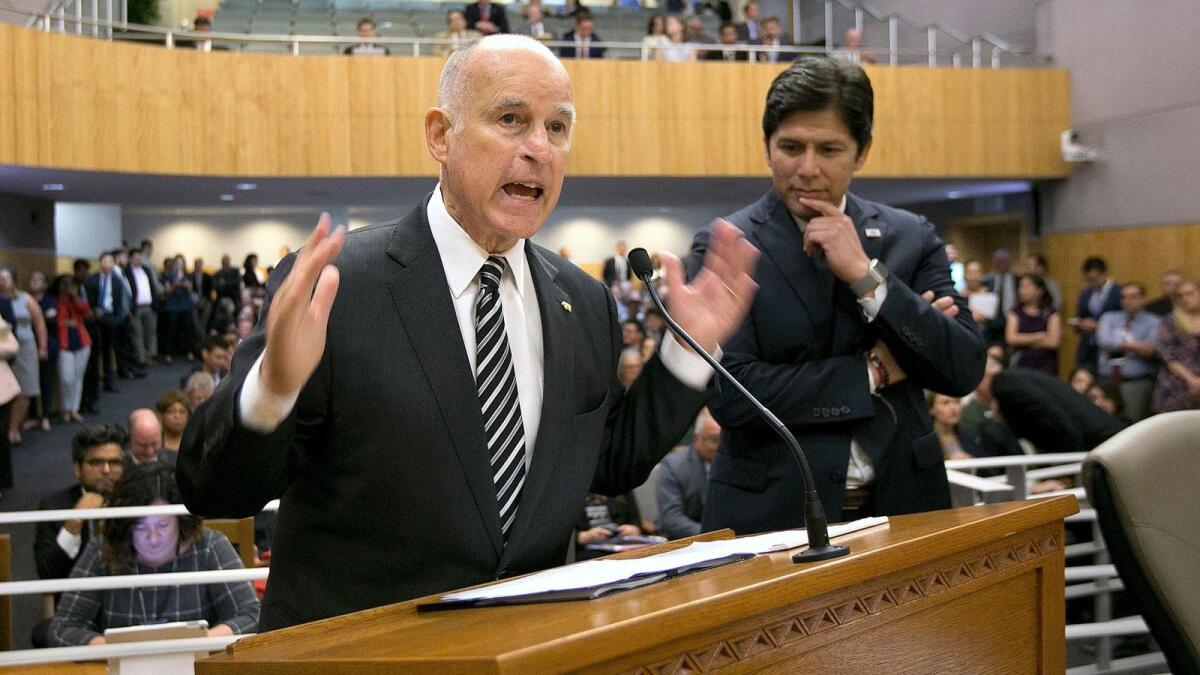
One particular message to the agriculture industry was simple: You want Gov. Jerry Brown to be a friend or an enemy the rest of his term?
Friends will support his climate change legislation, it was made clear.
To business leaders: This legislation provides tax and regulatory breaks that you’ve long sought. Grab them now or forget it.
To agriculture and business: You don’t like this cap-and-trade program? Wait until you see what replaces it if it’s not extended.
Brown’s hardball messages, his willingness to compromise and personal dealings with lawmakers were persuasive enough for him to win arguably his biggest legislative victory as governor.
It was a model of how to finesse controversial bills through a Legislature. And it stood in stark contrast to the bumbling we’ve been watching in the White House and Congress, most notably the failed, humiliating efforts on healthcare.
- Share via
Republican David Hadley drops out of California governor’s race two weeks after entering
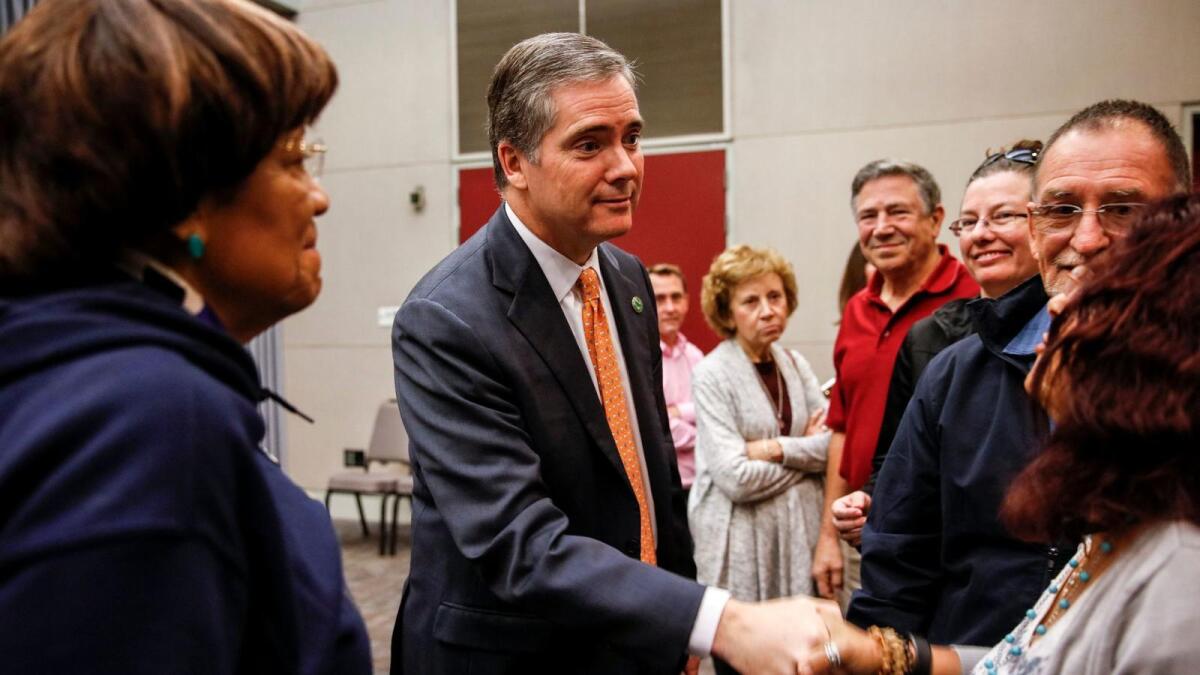
Former GOP state lawmaker David Hadley announced Wednesday he is dropping out of the gubernatorial race two weeks after he jumped in.
In an evening email to supporters, Hadley said he concluded that he could not win the race despite receiving encouragement since announcing his candidacy.
“No matter how much preparation you put in, there are certain things you cannot learn until you step into the arena,” he wrote. “What I have learned since I announced my candidacy has led me to conclude that I cannot responsibly ask donors, endorsers, volunteers, supporters or my family to invest in this campaign right now… We would not have the time and resources to make the case we need to make to all California voters.”
Past gubernatorial candidates in California have entered the race and dropped out after deciding they could not win, including Democrat Gavin Newsom and Republican Tom Campbell in the 2010 contest, though it is difficult to recall anyone making such a move so quickly out of the gate.
Both Newsom and Campbell ran for other offices that year, and some political strategists wondered if Hadley will do the same in the 2018 elections.
Hadley said Wednesday night that he had no intention to seek another office.
The 52-year-old is a social moderate and fiscal conservative who some thought had the potential to galvanize the GOP establishment in next year’s gubernatorial race. The former assemblyman from Manhattan Beach, who was the third prominent Republican to enter the race, said he had won the endorsement of a majority of the state’s GOP legislators and would have raised more than $1 million in July.
Hadley wrote that a factor in his decision was the possibility that because of the state’s top-two voting system, more GOP gubernatorial candidates would make it more likely two Democrats would face off in the general election — a repeat of what happened in the state’s 2016 U.S. Senate contest.
“I am not prepared to increase the likelihood of that outcome by pressing on in a crowded field,” he wrote, adding that all donations would be refunded and all of his endorsers were free to back other candidates.
The two remaining Republican candidates in the field are businessman John Cox and Assemblyman Travis Allen (R-Huntington Beach).
Cox, who has poured $3 million into his own bid, on Monday announced he would contribute an additional dollar to himself for every dollar donated to Hadley’s campaign, up to $1 million, in July.
A spokesman for Cox cheered Hadley’s decision as best for the state Republican Party on social media.
Hadley did not mention Cox’s announcement in his email to supporters, which caught his own donors and party insiders off guard Wednesday evening.
He did address Cox and Allen, urging them to avoid focusing on tumult in Washington and instead talk about California’s needs. He also urged them to drop out if they could not mount a campaign that has a realistic chance of success — an uphill battle in a state where Democrats outnumber Republicans by 19 points in voter registration.
“Run a race with the plausible goal of winning, or get out of the race,” Hadley wrote. “This 2018 governor’s race is too important to have a meaningful debate derailed by selfish politicians who cannot win, but can rob Californians of a real debate in the general election.”
------------
Updates
8:48 p.m. This article was updated with an additional comment from David Hadley.
8:03 p.m. This article was updated to add context and reaction.
This article was originally published at 6:48 p.m.
- Share via
Dana Rohrabacher dismisses new report on request he got from Russia as a ‘nothing burger’

Yes, the Russian government asked Rep. Dana Rohrabacher to push back against sanctions on Russians, and he doesn’t see what the big deal is.
Rohrabacher (R-Costa Mesa) dismissed fresh reports on Wednesday detailing how the Russian government asked him to change his colleagues’ opinions about Russian sanctions as a “nothing burger trying to distract the American people from real issues.”
Many of the details in a Daily Beast article published Wednesday had been previously reported in a lengthy Politico article in November. The Politico story gave Rohrabacher, who has long been known for encouraging improved Russian relations, the nickname “Putin’s favorite congressman.”
But the story is getting new life amid an investigation into Russian meddling in the 2016 election and the effort’s potential ties to the Trump campaign. And it’s a pretty complicated story.
Rohrabacher has had multiple interactions with several of the people with Russian ties who attended a Trump Tower meeting with Trump’s eldest son Donald Trump Jr. and other campaign officials in June 2016.
About the same time as the Trump Tower meeting, two of the attendees were working with Rohrabacher to remove Russian lawyer Sergei Magnitsky’s name from an anti-corruption law opposed by the Russian government. Magnitsky was a whistle-blower who alleged officials in Russian President Vladimir Putin’s government stole $230 million. He died in prison under suspicious circumstances, and the act named after him banned officials accused of involvement in his death from visiting the U.S. and using American banks. In response, Putin banned adoptions of Russian children by Americans. People with connections to the Russian government have been lobbying against the Magnitsky Act ever since.
During a trip to Russia in April 2016 and amid discussions in Congress about expanding the act, Rohrabacher received a document outlining the Russian government’s case against it.
“Changing attitudes to the Magnitsky story in the Congress… could have a very favorable response from the Russian side,” the document said, according to the Daily Beast.
Months later, Rohrabacher tried to hold a subcommittee hearing to discuss the act and challenge the assertions that led to the sanctions, but he was waylaid by Foreign Affairs Committee Chairman Ed Royce (R-Fullerton), who instead arranged for the full committee to discuss it. At the hearing, Rohrabacher expressed skepticism about the expanded Magnitsky Act and advocated for removing Magnitsky’s name from it.
Rohrabacher, who has previously said he accepted Russian documents on the case during the spring 2016 trip, acknowledged it again on Wednesday in an interview.
“The criminal justice department in Moscow had done a study of the Magnitsky case and had investigated it, and I was asked if I would look at it, and I said sure,” said Rohrabacher, who is chairman of the House Foreign Affairs Subcommittee on Europe, Eurasia and Emerging Threats. “I’m the chairman of the subcommittee that’s supposed to focus on Russia. It’s absolutely appropriate, and I think anybody that doesn’t spend that time focusing on their responsibility is derelict in their duty.”
Rohrabacher said he’s gotten similar documents from other countries’ governments when they want something from Congress.
“Whenever there is some controversy, you get information from those people all the time, whatever government you are talking to has all the information you need right here to prove their case,” Rohrabacher said.
Rohrabacher had scheduled a similar trip to Moscow to meet with the Russian parliament this spring, but he said Wednesday that he didn’t end up going because he was worried the current focus on Russia would make it difficult to have serious conversations with Russian officials.
“In the middle of a chaotic, public brouhaha, you’re not going to be able to get the serious job done that you need to get done,” he said.
- Share via
California is working to avoid a shortage of legalized marijuana, state pot czar says
With Nevada suffering a shortage of legalized marijuana, California’s state pot czar said Wednesday that efforts are being made in her state to make sure sufficient licenses go to farmers, testers and distributors to supply retailers.
Providing temporary, four-month licenses to support some businesses including growers is planned “so we don’t have a break in the supply chain,” Lori Ajax, chief of the Bureau of Medical Cannabis Regulation, said in testimony at a legislative hearing.
Legal sales began July 1 in Nevada, but it immediately became clear there was not enough supply to meet demand, in part because unique rules provide alcohol wholesalers exclusive distributor rights. California does not have the same limits on who can distribute cannabis.
In California, licensing to grow, test, distribute and sell marijuana for recreational use is required by law to begin Jan. 2, but Ajax told lawmakers her agency will make sure that sufficient licenses are provided to growers and testers before the start of the year.
State Sen. Mike McGuire (D-San Rafael), chairman of the Senate Governance and Finance Committee, said there may be 20,000 marijuana growers who will want licenses. He urged consumers to be patient.
“This is not going to be a perfect process,” he said. “We are going to make mistakes.”
Another challenge is that marijuana cultivation and excise taxes will be collected by a new state Department of Tax and Fee Administration, which was created July 1 and is still in the process of organizing.
With federal banks refusing to process pot sale proceeds because the drug remains illegal under federal law, Richard Parrott, a manager for the new tax agency, said it is prepared to begin accepting cash payments for taxes from as many as 250 cannabis distributors.
“We believe we are on track to meet our implementation dates,” Parrott told the panel.
- Share via
California doesn’t have an official state fruit, but it does have four official state nuts
The quest to learn more about the why the almond, pecan, walnut and pistachio were each officially declared California’s state nut led down an interesting path.
Turns out the campaign for an official nut started in a fourth-grade classroom at Margaret Sheehy Elementary School in Merced. Even though Lt. Gov. Gavin Newsom did once proclaim the almond as the state nut, his proclamation never became law.
(That means the avocado is not actually the state fruit and the artichoke isn’t the state vegetable, even though Newsom’s action got a lot of fanfare.)
Assemblyman Adam Gray (D-Merced) took up the cause and in May, the class of 25 fourth-graders paraded to Sacramento’s Capitol and made their case.
Lobbyists for California’s walnut, pistachio and pecan growers were also there, arguing that their respective nuts were just as valuable as the almond.
The bill was amended to include the rest. No word yet if the avocado or artichoke will have their day.
- Share via
Former Obama advisor jumps in to challenge Rep. Mimi Walters in Orange County
Orange County Rep. Mimi Walters (R-Irvine) just got another challenger in her closely watched reelection campaign.
Brian Forde, who previously served as senior advisor on technology to former President Obama, announced Wednesday that he’ll join several other Democrats hoping to unseat the two-term Republican.
In a statement announcing his run, the Tustin native said he would “fight against the Trump-Walters agenda.”
Forde, 37, is a senior lecturer at the Massachusetts Institute of Technology in Cambridge, Mass., and moved to Lake Forest — within Walters’ 45th Congressional District — in April. He plans to commute between California and Massachusetts to teach.
A former Republican, Forde switched his voter registration to Democratic about a year ago, according to campaign spokeswoman Audrey Carson, but voted for Obama for president twice.
Democrats have identified Walters’ district, which presidential candidate Hillary Clinton won by more than 5% in November, as a top battleground in California. Others running against Walters in 2018 include Ron Varasteh, Katie Porter, Dave Min, Kia Hamadanchy and Eric Rywalski, all Democrats.
- Share via
Looking toward a 2018 rematch, Rep. Steve Knight’s opponent is catching up in fundraising
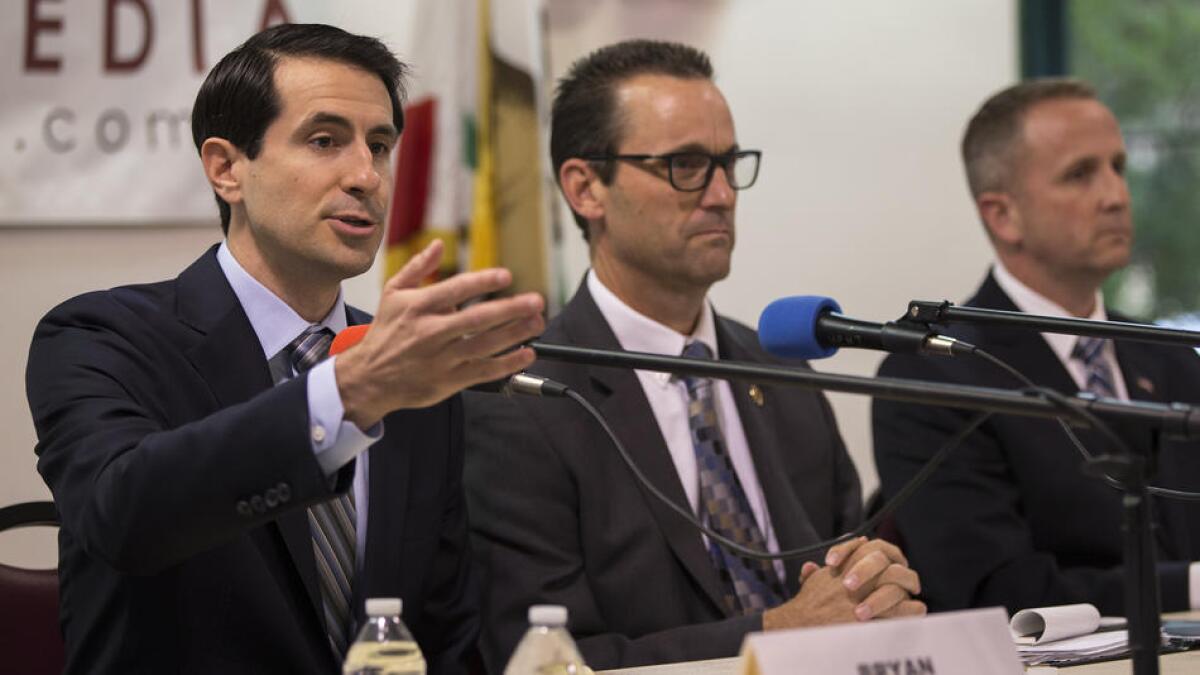
At one point last year, GOP Rep. Steve Knight of Palmdale was labeled by an analyst as “the most vulnerable incumbent in California.”
But despite his sometimes shaky fundraising and the attack ads unleashed by Democrats seeking to unseat him, Knight went on to defeat Democratic challenger Bryan Caforio by more than 6 percentage points in November.
Caforio is back for more, announcing a repeat run in May, but Knight doesn’t seem to be flinching.
In the latest fundraising reports filed Saturday, Caforio reporting raising $223,018 in the second quarter of the year, nearly as much as Knight’s $256,328.
Knight still has a cash advantage, with $403,301 in the bank. Caforio reported having $175,635 in the bank as of June 30.
But Caforio has demonstrated an ability to catch up: In October of last year, as the race became increasingly heated, the Democrat reported raising a whopping $619,687 over three months, while Knight raised just over half of that amount.
It remains to be seen whether outside groups, which spent more than $5 million on the race last year, will step in.
Two other Knight challengers, Katie Hill and Jess Phoenix, raised $168,408 and $77,001, respectively.
- Share via
The Democrat running against Rep. Darrell Issa has more money than any challenger in California’s hottest races
Out of more than a dozen closely watched congressional seats that Democrats and Republicans are trying to flip in California, the one that belongs to Rep. Darrell Issa (R-Vista) has drawn some of the most robust fundraising.
Issa, a nine-term congressman who won by fewer than 1,700 votes last year, shows all the signs of being in a competitive race, raking in nearly half a million dollars in the second quarter of the year.
But one of his newest challengers, environmental attorney Mike Levin, is quickly trying to catch up. Levin, who announced his run March 8, has amassed more money than any other challenger running against an incumbent in California. That includes Doug Applegate, a fellow Democrat and retired U.S. Marine Corps colonel who came within striking distance of Issa last November and is running again in 2018.
Between April 1 and June 30, Levin took in $333,537 and has $416,345 in the bank. Issa raised $455,207 during that period and has $671,529 in the bank.
Levin already has spent a significant chunk: about $181,413 on fundraising consultants, campaign staff, digital advertising and door-knocking services.
The reports show Levin could be a formidable challenger in what was already expected to be a tough race for Issa.
Applegate raised $281,143 in the most recent quarter and had $262,730 cash on hand as of June 30.
Other congressional challengers that brought in big sums this time included Democrats Katie Porter and Dave Min, who are both challenging Rep. Mimi Walters (R-Irvine) and raised $311,571 and $304,208, respectively.
A potential candidate, Orange County Republican Scott Baugh, has raised no money in 2017 but is sitting on a war chest of $546,915. He previously said he was raising money for a potential campaign if or when Rep. Dana Rohrabacher (R-Costa Mesa) decides not to seek reelection.
------------
FOR THE RECORD
12:35 p.m.: An earlier version of this article misidentified Applegate as a retired Air Force colonel. He is a retired U.S. Marine Corps colonel.
------------
- Share via
Here are the political ripple effects from this week’s big climate vote in California
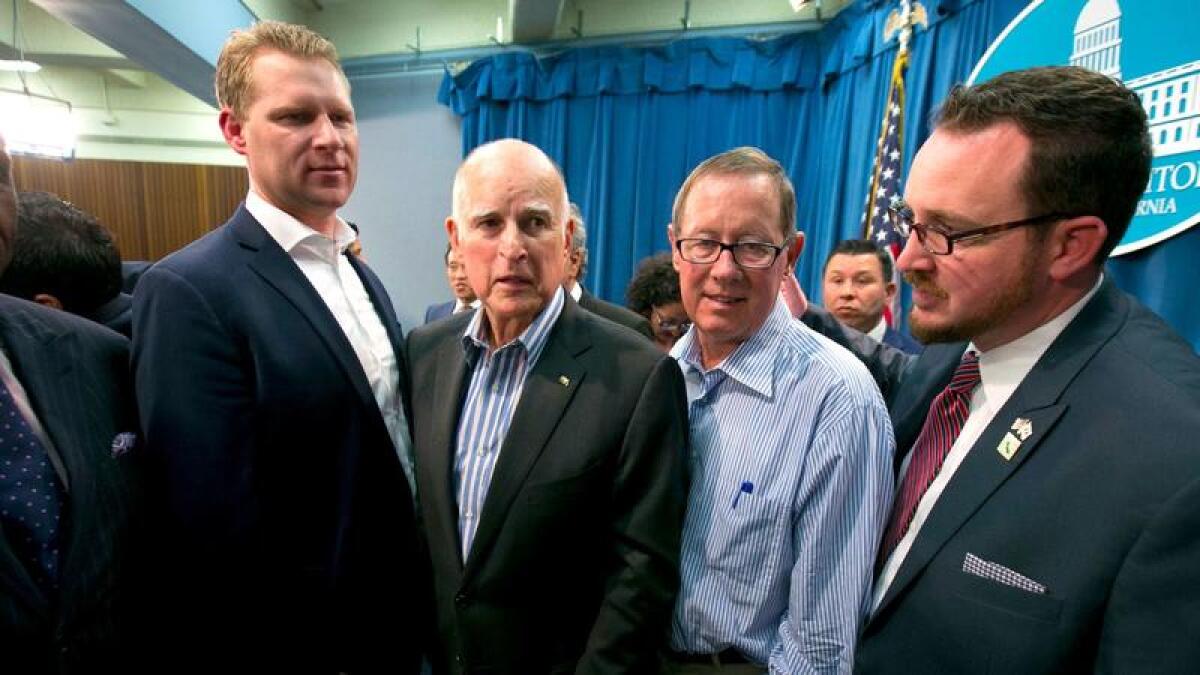
How peculiar are the politics of climate change in California? Just look at this week’s vote on cap-and-trade, which saw a Republican former grape farmer from Modesto and a Democratic former math teacher from Bell Gardens aligned against a mild-mannered Santa Cruz liberal and a provocative anti-tax crusader from Huntington Beach.
It’s not often that a contentious vote yields a roll call as unusual as the one Monday, when lawmakers approved a measure to extend the life of the state’s cap-and-trade program, which requires companies to purchase permits to emit greenhouse gases.
But when aforementioned lawmakers Sen. Tom Berryhill and Assemblywoman Cristina Garcia find themselves in the “yes” column, while Assemblyman Travis Allen (R-Huntington Beach) and Assemblyman Mark Stone (D-Scotts Valley) notch “no” votes, it indicates just how much cap-and-trade has upended the political status quo.
Monday’s vote put an end to months of backroom negotiations, but the aftermath rippled throughout the state Tuesday.
Here’s how the political repercussions are playing out.
- Share via
Rep. Barbara Lee won’t get her war vote after all
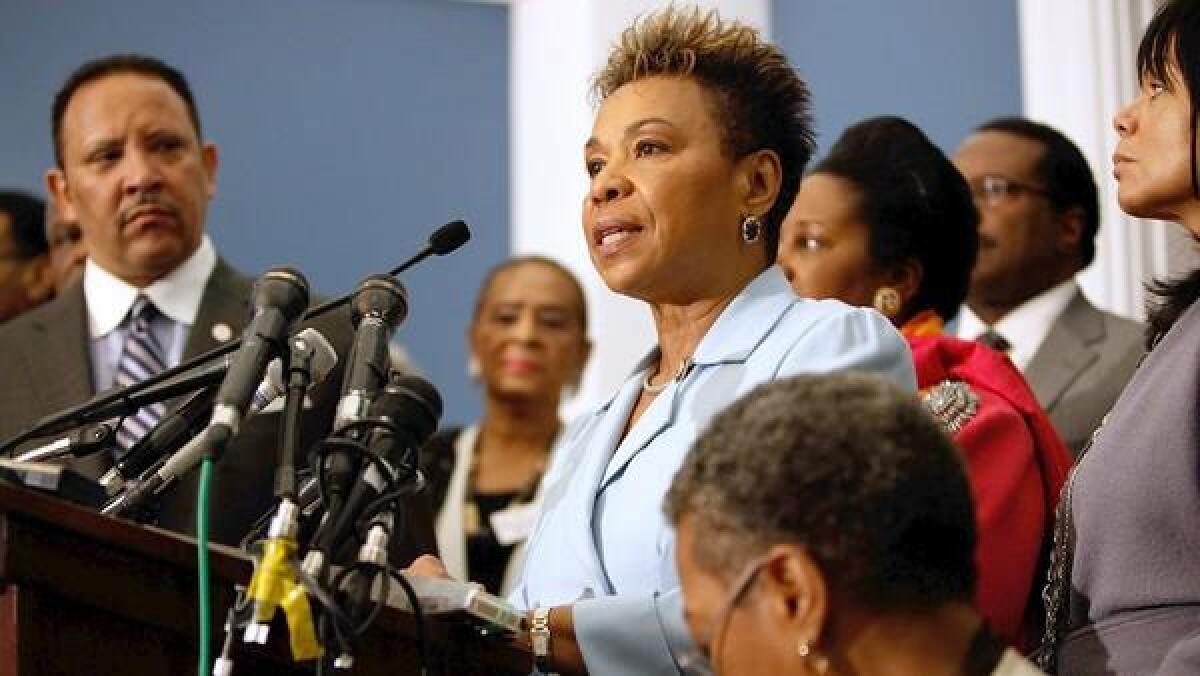
House Republicans have stripped from a Defense Department spending bill Rep. Barbara Lee’s amendment to reconsider the authority the president has to wage war.
Republicans on the House Appropriations Committee unexpectedly opened the door last month to ending the authorization approved by Congress in 2001 when Lee’s amendment was added to a Defense Department measure after 16 years of attempts. Congress would have had 240 days to debate a new authorization. At the end of that time, the 2001 authorization would have been repealed.
House Speaker Paul D. Ryan (R-Wis.) was uncomfortable with the amendment, with his spokeswoman AshLee Strong telling the Hill newspaper last week after Lee and Ryan met to discuss it that, “There is a way to discuss this debate, but this [amendment], which endangers our national security, is not it.”
The version of the Defense Department bill approved by the House Rules Committee overnight removes Lee’s amendment and replaces it with an amendment from Rep. Tom Cole (R-Okla.) that gives the White House 30 days to tell Congress its strategy for defeating Al Qaeda and Islamic State, and how the administration believes the current Authorization for the Use of Military Force applies.
The Rules Committee decides what debate on a bill will look like on the House floor, including what amendments can be considered.
Lee was was livid when learning the news, and blamed Ryan.
“Over the years, I’ve seen Republican leadership deploy every manner of undemocratic, underhanded tactics in Congress. But stripping my bipartisan amendment to repeal the 2001 AUMF – in the dead of night, without a vote – may be a new low from Speaker Ryan,” Lee said in a statement.
Lee, an Oakland Democrat, was the only member of Congress to object in September 2001 to the Authorization for the Use of Military Force, a resolution in response to the terrorist attacks that paved the way for the war in Afghanistan.
The resolution has since been used by President George W. Bush, President Obama and now President Trump to justify more than 35 military actions in nearly 20 countries around the world without going back to Congress for new permission to send troops into harm’s way.
- Share via
Housing will be California lawmakers’ big debate in August, but a deal won’t be easy to pass
After pushing lawmakers to increase the gas tax and reauthorize the cap-and-trade climate change program, Gov. Jerry Brown has put the state’s housing crisis next on his agenda.
But a deal to increase funding for low-income developments and ease home building regulations is far from assured. A key lawmaker is already saying the bills being considered for a housing package aren’t promising enough to gain his support.
- Share via
‘Is it possible that there was a civilization on Mars thousands of years ago?’ Rep. Dana Rohrabacher asks NASA scientist
Republican Rep. Dana Rohrabacher of Costa Mesa is a member of the House Committee on Science, Space and Technology’s subcommittee on space. On Tuesday, he begged some extra time from the subcommittee’s chairman to ask a panel of NASA scientists a question: Was there once a civilization on Mars?
Watch a scientist’s answer:
- Share via
Embattled Rep. Duncan Hunter picks up another challenger from his own party
Another Republican has stepped up to challenge Rep. Duncan Hunter (R-Alpine), who is under investigation by the FBI over alleged misuse of campaign funds.
Daniel Casara, a 43-year-old retired Army sergeant and motivational speaker, announced Tuesday that he’s running against Hunter, a six-term Republican who represents inland San Diego County and a sliver of Riverside County.
“Washington is failing us,” Casara said in a statement announcing his run, adding that if elected, he would push for better services for veterans and pursue tax reform that “benefits every American.”
Casara received a Purple Heart medal after surviving an attack on his tank in Iraq that killed two other soldiers. He has undergone numerous surgeries and now makes a living as a motivational speaker, according to his campaign.
Earlier this year, Casara participated in a joint interview with George W. Bush after being featured in a book of portraits the former president painted of wounded veterans. A Chicago native, Casara currently lives in San Diego, outside of Hunter’s 50th Congressional District.
Hunter was recently added to the Democrats’ list of targeted Republican incumbents for 2018. In addition to Casara, he faces Republican Andrew Zelt and Democrats Patrick Malloy, Josh Butner, Glenn Jensen, Pierre Beauregard, Gloria Chadwick and Ammar Campa-Najjar.
Campa-Najjar, a media consultant, raised more money than Hunter in the latest quarter ending June 30, while Hunter spent nearly all of the $155,624 he raised that period on legal fees and services. His campaign has another $114,412 in unpaid legal fees.
The House Ethics Committee disclosed in March that Hunter was under criminal investigation by the Department of Justice and said Hunter may have used campaign funds to pay for personal expenses. His campaign expenses included oral surgery, jewelry, garage door repairs and $600 in airline fees to transport his family’s pet rabbit.
- Share via
With FBI investigation looming, Rep. Duncan Hunter has spent $336,664 on lawyers
Under investigation by the FBI for possibly misusing campaign funds, Rep. Duncan Hunter (R-Alpine) has spent $336,664 with seven law firms this year.
Hunter’s most recent campaign finance report shows $152,859 in spending and $114,412 in debt to seven law firms in the San Diego and Washington areas in the months since the House Ethics Committee disclosed the FBI’s investigation in late March to explain why it was not pursuing its own probe of the San Diego-area congressman.
The fifth-term Republican raised just $155,625 in the same time frame, nearly the same amount he paid out in legal fees, according to his campaign finance report.
Hunter can use campaign funds to pay for legal defense of himself, family or staff as long as the alleged crimes are related to the campaign or his job as an elected official.
The biggest fees have gone to some of the Washington firms best known for campaign finance and election law.
That includes $46,976 this quarter to Berke Farah LLP of Washington, which has represented Hunter since 2016.
He also paid $55,533 to Holtzman Vogel Josefiak Torchinsky PLLC of Warrenton, Va., and still owes the firm $57,056.
Back in San Diego, he hired Seltzer Caplan McMahon Vitek, which has a variety of specialties. He paid the firm $28,787 this quarter and owes it another $33,292.
Hunter also spent $69,393 on attorney’s fees in the first three months of the year, according to his reports.
Federal election officials and the San Diego Union-Tribune repeatedly raised questions over the last year and a half about unusual spending by Hunter’s campaign, including flying the family rabbit on a plane and payments to nail salons, his children’s private school and a Phoenix resort, among others.
The House Ethics Committee released a report that stated Hunter “may have converted tens of thousands of dollars of campaign funds from his congressional campaign committee to personal use to pay for family travel, flights, utilities, healthcare, school uniforms and tuition, jewelry, groceries and other goods, services, and expenses.”
Hunter has already reimbursed his campaign some $62,000 in payments for things including oral surgery, a family trip to Italy and Disneyland gift shop purchases.
Hunter has said he’s reviewing all of his campaign’s spending, and his attorneys have said he is cooperating with the FBI investigation.
“Congressman Hunter intends to cooperate fully with the government on this investigation, and maintains that to the extent any mistakes were made they were strictly inadvertent and unintentional,” Hunter’s attorneys, Elliot S. Berke and Gregory A. Vega, said in a statement in March.
Hunter’s office did not respond to a request for additional information Tuesday.
- Share via
Watch: Republican Assemblyman Devon Mathis explains his vote to extend California’s climate program

GOP Assemblyman Devon Mathis on cap and trade vote
California lawmakers voted Monday evening to extend the state’s premiere program on climate change, a victory for Gov. Jerry Brown that included unprecedented Republican support for fighting global warming.
In a break with party leaders and activists in California and Washington, eight Republicans joined with Democrats to continue the cap-and-trade program, which requires companies to buy permits to release greenhouse gases into the atmosphere.
Some, including Assemblyman Devon Mathis (R-Visalia), grew emotional as they spoke on the floor.
- Share via
Arnold Schwarzenegger on California’s climate change vote: ‘The Republican Party has moved forward in a big step’
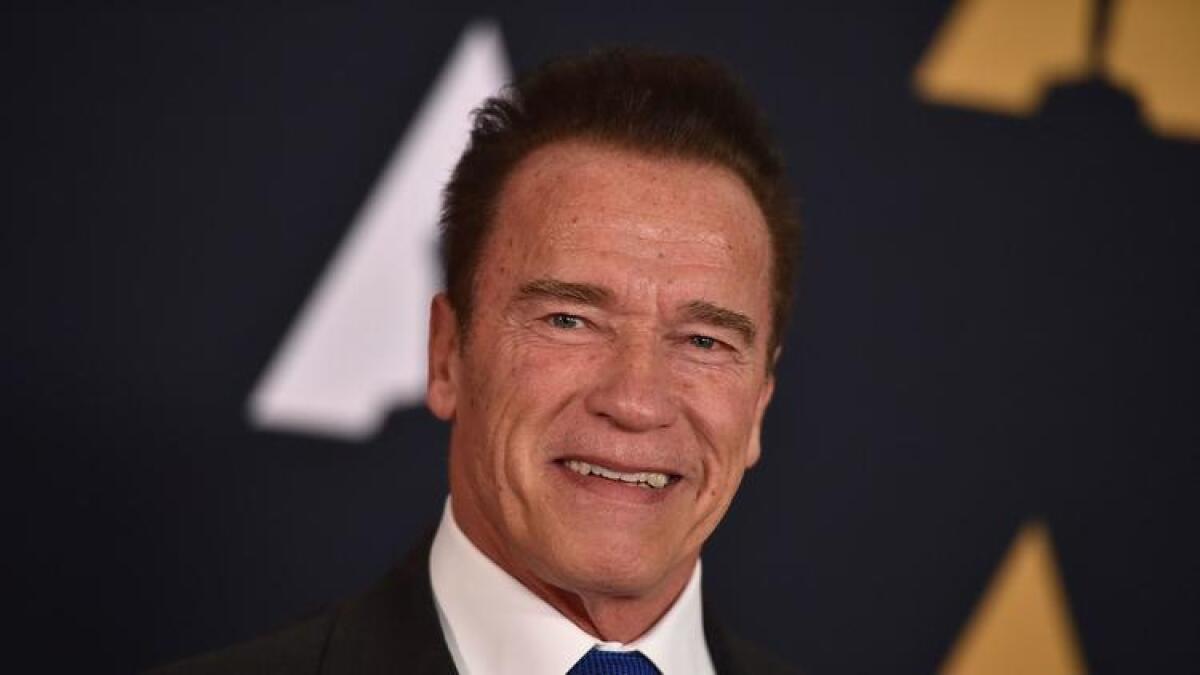
Fighting climate change was a lonely undertaking at times for Arnold Schwarzenegger while he was the last Republican governor in the liberal state of California. The landmark global warming law he championed more than a decade ago received only a single vote from a member of his party in the Legislature.
He relied on Democrats to seal the deal, providing the foundation for the state’s cap-and-trade program, which requires companies to buy permits to release greenhouse gas emissions. But the political landscape is different now, and Gov. Jerry Brown’s successful bid to extend the program received eight Republican votes on Monday.
We spoke to Schwarzenegger about it on Tuesday morning.
- Share via
Nancy Pelosi: Democrats are willing to work with Republicans on healthcare fixes
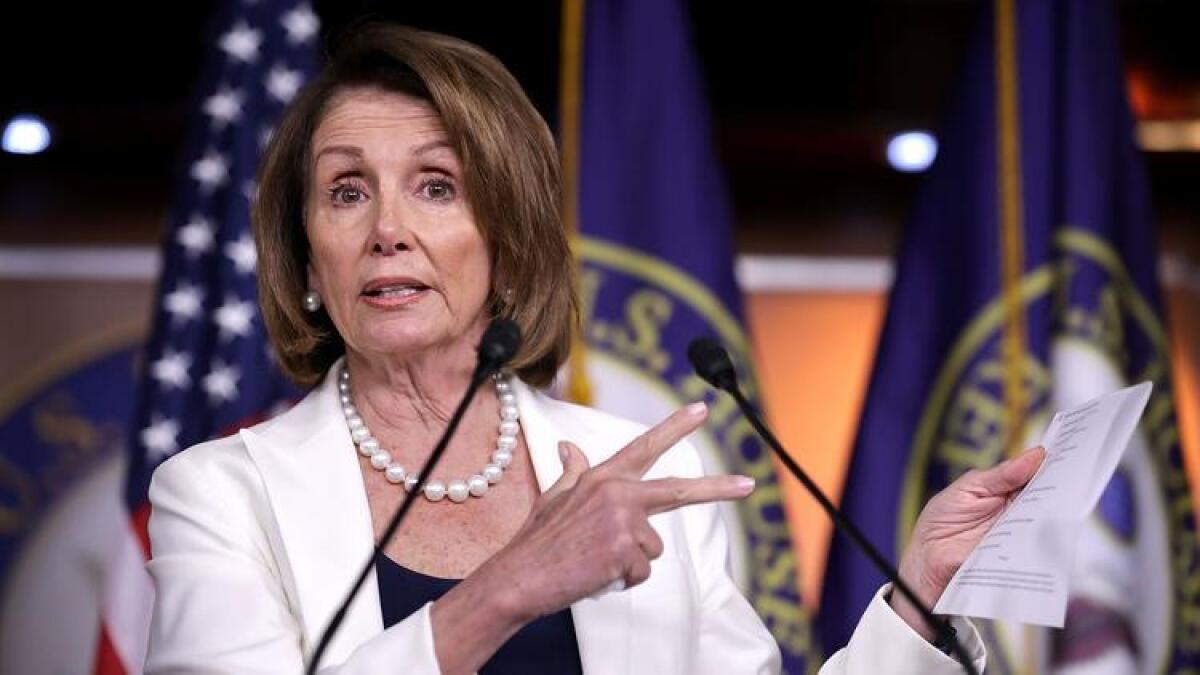
House Democrats are willing to come to the table on healthcare if Republicans abandon their attempt to do it alone, House Minority Leader Nancy Pelosi (D-San Francisco) said in a letter to Speaker Paul Ryan (D-Wis.) on Tuesday.
“Democrats extend the hand of friendship if Republicans will set aside repeal, abandon cuts to Medicaid, and abandon huge tax breaks for the wealthy,” Pelosi states.
With the GOP healthcare bill seemingly dead in the Senate, and senators unwilling to consider a straight repeal of the Affordable Care Act, many on Capitol Hill are wondering what will happen next to President Obama’s signature healthcare law that Republicans have pledged to kill for nearly a decade.
The overture from Pelosi doesn’t include many details on what she thinks the next moves should be, except that they should begin before Congress leaves for its August recess.
- Share via
Rep. Anna Eshoo asks Trump’s election commission to withdraw voter information request
Rep. Anna Eshoo (D-Menlo Park) is asking the Presidential Advisory Commission on Election Integrity to withdraw its request for voter information from all 50 states.
“At a time when the personally identifiable data of Americans is under constant attack from hackers and criminals seeking to engage in identity theft, the commission’s request to collect and centrally store the personal data of hundreds of millions of Americans poses risks that cannot be fully mitigated,” she states in a letter to Kris Kobach, the secretary of state of Kansas who serves as vice chairman of the Presidential Advisory Commission on Election Integrity.
Seventy-five House Democrats joined Eshoo in signing the letter that will be released later Tuesday, including 15 from California. The commission’s first meeting is scheduled for Wednesday.
Kobach sent letters to all 50 states on June 28 asking for information he said would help the group examine rules that “enhance or undermine the American people’s confidence in the integrity of federal elections processes.”
California Secretary of State Alex Padilla denied the voter fraud commission’s request for names, addresses and other personal information of California’s registered voters the next day, saying that handing it over would only “legitimize” the president’s false claims of massive election cheating last fall.
More than half the states in the country followed suit and refused to hand over some or all of their voter rolls to the commission, saying they were concerned the information wouldn’t be secure.
Eshoo echoed that in her letter.
“It is not at all clear what security measures you plan to put in place to protect the information you propose to collect and store,” Eshoo’s letter says. “It is also not clear that it would be possible to fully protect this information once it is in the hands of the federal government.”
- Share via
Sen. Kamala Harris is optimistic criminal justice reform can pass Congress
Sen. Kamala Harris said Tuesday there’s enough common ground on criminal justice reform that she’s optimistic Congress can come together to pass a new plan.
“There’s some room for getting legislation passed,” the California Democrat, who is a former prosecutor and state attorney general, said after giving opening remarks at a conference on women in prison. “This is something that should not be thought of as even bipartisan; it should be a nonpartisan issue, and I feel optimistic that we can appeal to people across the aisle.”
Addressing the nation’s overcrowded prisons has been a sticking point in American politics for decades. In recent years, a bipartisan group of senators has worked on a comprehensive criminal justice reform bill that would reduce maximum minimum sentencing and increase treatment options, but the group hasn’t been able to get it to the floor for a vote. Atty. Gen. Jeff Sessions has pushed for federal prosecutors to pursue the harshest sentences possible, saying it will deter crime.
Harris is working with other senators on writing two prison policy overhaul bills. One would ensure that women in prison have access to basic health and reproductive care, and the other would examine whether bail based on money favors those who can afford to pay it and get out of jail while awaiting trial.
“We are talking about a population of people that are, for the very most part, invisible. They don’t have any political capital. They aren’t writing checks. They aren’t voting,” Harris said during her speech.
Harris visited the Central California Women’s Facility in Chowchilla, which is the largest women’s prison in the country, and said she was struck while watching the women silk-screening U.S. flags.
“There was something about the symmetry, some symmetry there in my mind, that I walked away thinking about. Isn’t it part of who we are as Americans that we believe in second chances?” Harris said.
FOR THE RECORD
12:17 p.m.: An earlier version of this article stated that neither bill on which Harris is working has been filed. The bill about access to care was filed last week.
- Share via
L.A.’s newest congressman gets assigned to powerful House oversight committee
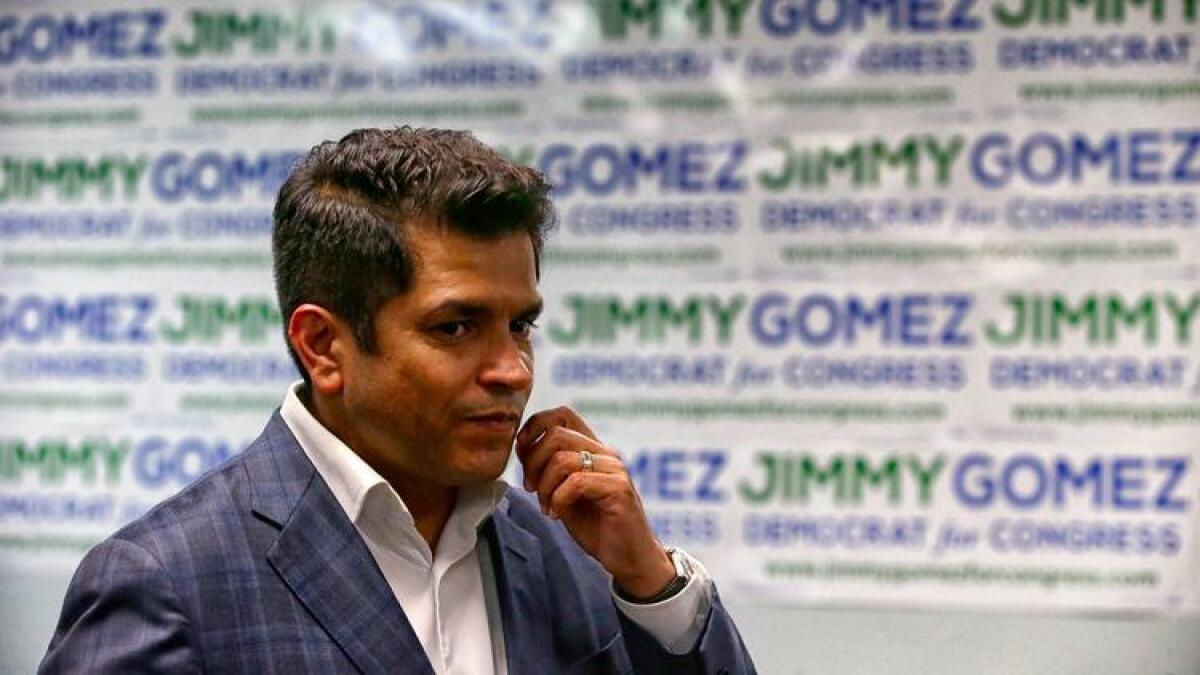
New U.S. Rep. Jimmy Gomez (D-Los Angeles) will serve on the powerful House Oversight and Government Reform Committee and the House Natural Resources Committee.
Sworn in July 11 as the lowest-ranked member of Congress, Gomez wasn’t expected to have much sway over his committee assignments, which were approved Monday morning in the Democratic caucus’ weekly private meeting.
“Gomez is a proven champion for California’s working families and a strong voice to hold the Trump Administration accountable for its conduct,” Pelosi said in a statement.
Gomez has not yet commented on his assignments.
He had asked to serve on the Natural Resources Committee to continue his work on climate change from the state Assembly. Gomez joins 11 Californians who serve on the committee.
The Oversight and Government Reform Committee is charged with oversight of the executive branch. Gomez joins California Reps. Darrell Issa (R-Vista) and Mark DeSaulnier (D-Concord) on the committee.
- Share via
Rohrabacher draws new opponent in Orange County
Nestle executive Michael Kotick is entering the race to unseat Rep. Dana Rohrabacher in Orange County’s 48th Congressional District.
Kotick, 33, of Laguna Beach, said his management background has prepared him to serve in Congress.
He has a bachelor’s in economics and an MBA from Michigan State University and earned a masters in global management at Arizona State University’s Thunderbird School of Global Management.
Kotick is brand director at Nestle. He published a book in May titled “Create Brand Attraction: A New Strategy That Uses the Laws of Human Attraction to Decode Marketing in a Digital and Social Media Age.”
“I have been preparing for this moment for a very, very long time,” Kotick said. “I’ve always known that I would lead and I would be a leader of this community.”
The 48th Congressional District is one of the California seats that have been targeted by Democrats seeking to harness anti-President Trump sentiment in their fight to reclaim a House majority. Kotick joins more than half a dozen others who’ve announced they will challenge Rohrabacher in 2018.
“This campaign is going to need to bring people together in order to flip this seat,” Kotick said. “This community is not being heard and that is what is going to be different.”
- Share via
How did your lawmaker vote on California’s climate change program?
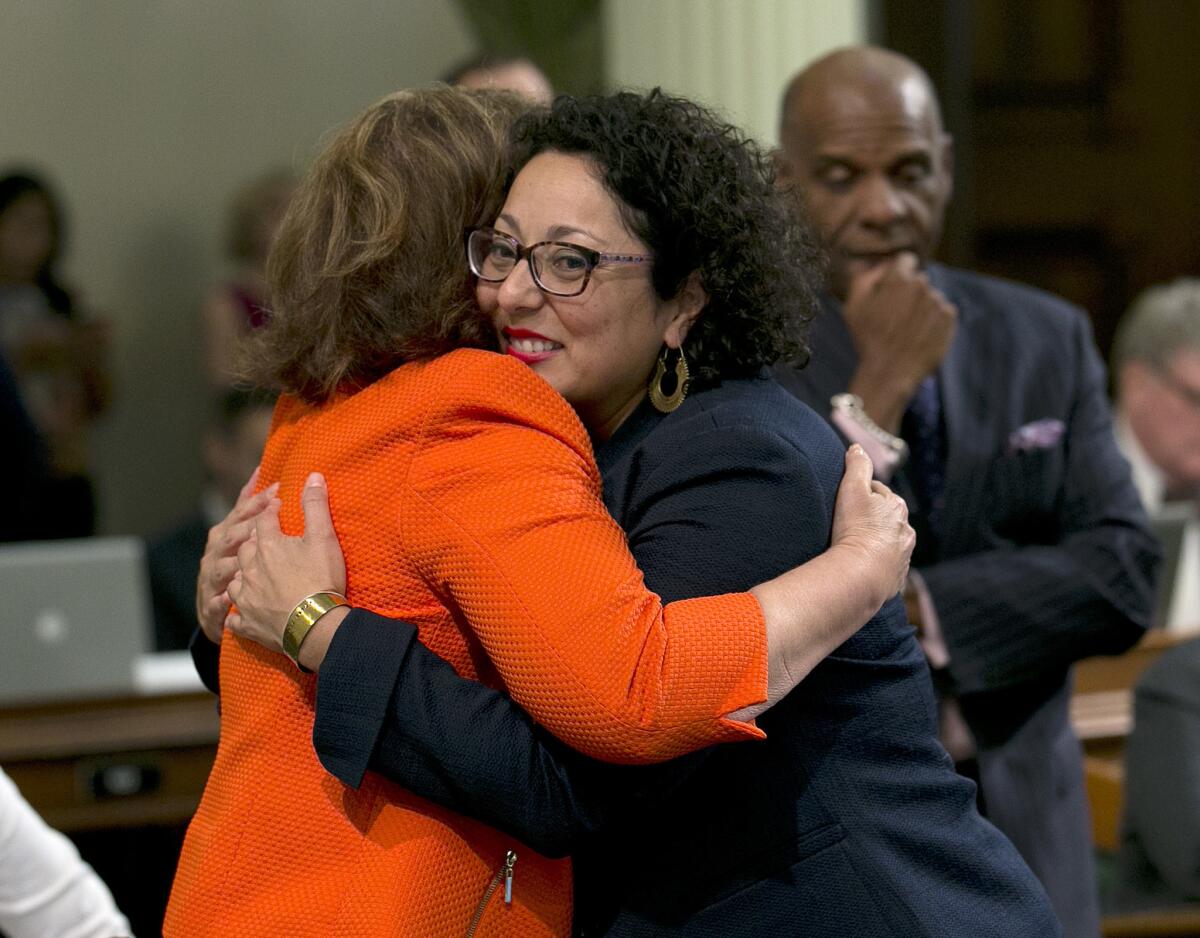
California legislators approved an extension of the state’s signature climate change program known as cap and trade.
The measure passed 55 to 21 in the Assembly and 28 to 12 in the Senate.
It was a rare bipartisan vote, with seven Republicans joining all but three Democrats in the Assembly. In the Senate, just one Republican, Tom Berryhill of Modesto, voted for the proposal.
All of the Senate Democrats backed it.
The bipartisanship did not go unnoticed.
Find out if your lawmaker voted for the plan here.
- Share via
Bipartisan coalition stands together for news conference after vote to extend California’s cap-and-trade program
- Share via
California lawmakers approve cap-and-trade extension
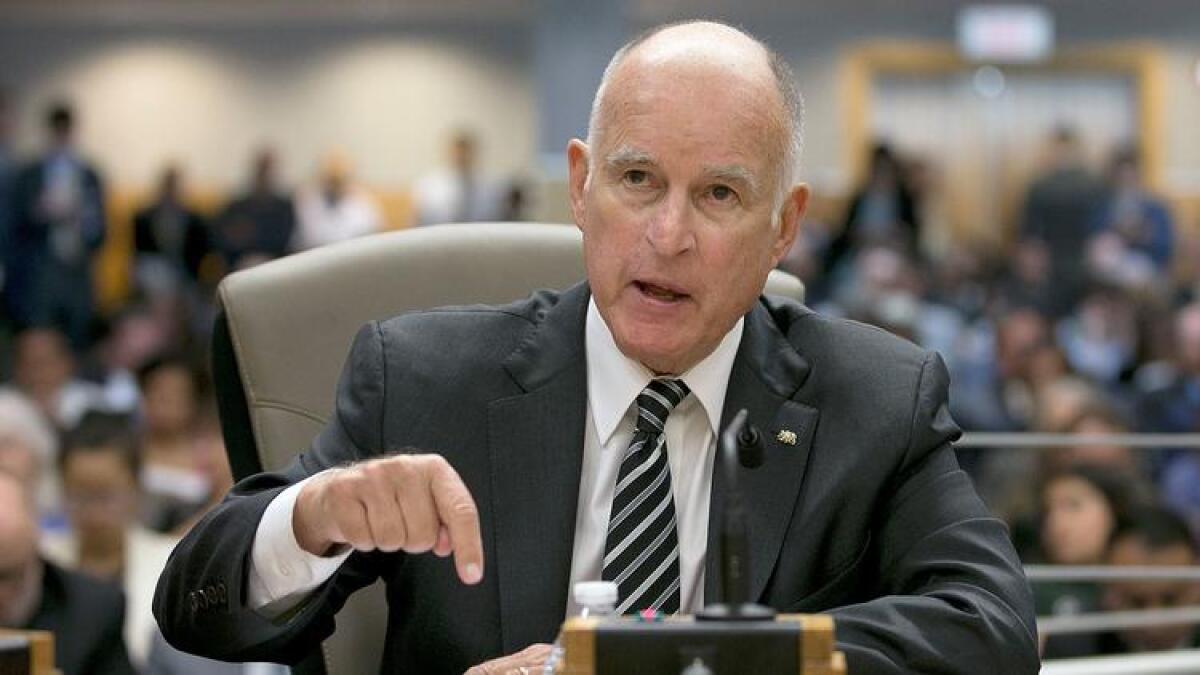
In a big victory for Gov. Jerry Brown, state lawmakers approved a 10-year extension for California’s cap-and-trade program.
The vote came with bipartisan support, a significant shift from previous years where climate policies squeaked by along party lines or with only a handful of Republicans in favor.
Cap and trade requires companies to buy permits to release greenhouse gas emissions. The legislation approved on Monday, Assembly Bill 398, will continue the program until 2030.
Lawmakers also approved related legislation, Assembly Bill 617, to improve air quality in polluted communities.
“With this important package we are continuing California’s global leadership on climate change and we are protecting the public health by improving air quality in communities throughout our state,” Assembly Speaker Anthony Rendon (D-Paramount) said in a statement.
- Share via
California Senate approves cap-and-trade extension
State senators advanced legislation to extend California’s cap-and-trade program in a narrow vote Monday.
All Democrats voted yes, and they were joined by one Republican, Sen. Tom Berryhill (R-Modesto).
The measure, Assembly Bill 398, now goes to the Assembly for another vote before it can reach Gov. Jerry Brown‘s desk.
“No plan is perfect when you’re required by design to have a compromise,” said Senate leader Kevin de León (D-Los Angeles). “We can’t let the perfect get in the way of the good.”
Cap and trade requires companies to buy permits to release greenhouse gas emissions, a system intended to provide a financial incentive for companies to clean up their operations. The program was launched almost five years ago, and the new legislation would keep it operating until 2030.
Most Republicans argued in opposition. Sen. Andy Vidak (R-Hanford) said it was a mistake to extend the program because the state only represents a fraction of the world’s emissions.
“We could shut down the entire state of California, and it would have absolutely no effect on the global climate,” he said.
Berryhill defended his support for the legislation by saying he was able to prevent even more onerous climate policies.
“Instead of sitting on the sideline and watching everything go off a cliff, I was able to ensure farmers, small-business owners and rural Californians were well-represented and protected in the negotiation,” he said in a statement.
A second measure, Assembly Bill 617, was also approved by senators to tackle air pollution that causes local public health problems.
In addition, senators passed another related bill, Assembly Constitutional Amendment 1. The proposal would place a measure on next year’s ballot that would require a one-time higher vote threshold for spending cap-and-trade revenue.
The proposal was a request from Assembly Republicans who hope it gives them more influence on how the money is used.
This post has been updated with details about ACA 1 passing the Senate.
- Share via
GOP establishment figures Pete Wilson and George Shultz endorse California cap-and-trade plan
Two well-known names in the Republican Party establishment are weighing in to back Gov. Jerry Brown‘s cap-and-trade proposal.
Former Gov. Pete Wilson and former U.S. Secretary of State George P. Shultz issued letters Monday backing the proposal, which faces a decisive vote.
Update: Climate change legislation passes Legislature in bipartisan agreement >>
Wilson, in a letter to Republican lawmakers, pitched the plan as the least negative option within the state’s existing efforts to combat climate change.
“The choices are limited, and unfortunately you are faced with what you can do to make a bad situation better,” Wilson said, noting alternative efforts, such as a carbon tax, would be “truly disastrous for our state.”
The fight against climate change in California gains an unlikely ally: Republicans >>
Shultz, meanwhile, praised the plan as something that would make Ronald Reagan “proud,” calling it a “commonsense, free-market approach.”
The appeal had limited effect in the Senate: Only one Senate Republican — Tom Berryhill of Modesto — voted for the proposal, which secured enough votes to pass but has not officially cleared the Senate yet.
- Share via
FPPC attorney recommends lawmakers face contribution limits in recall fight
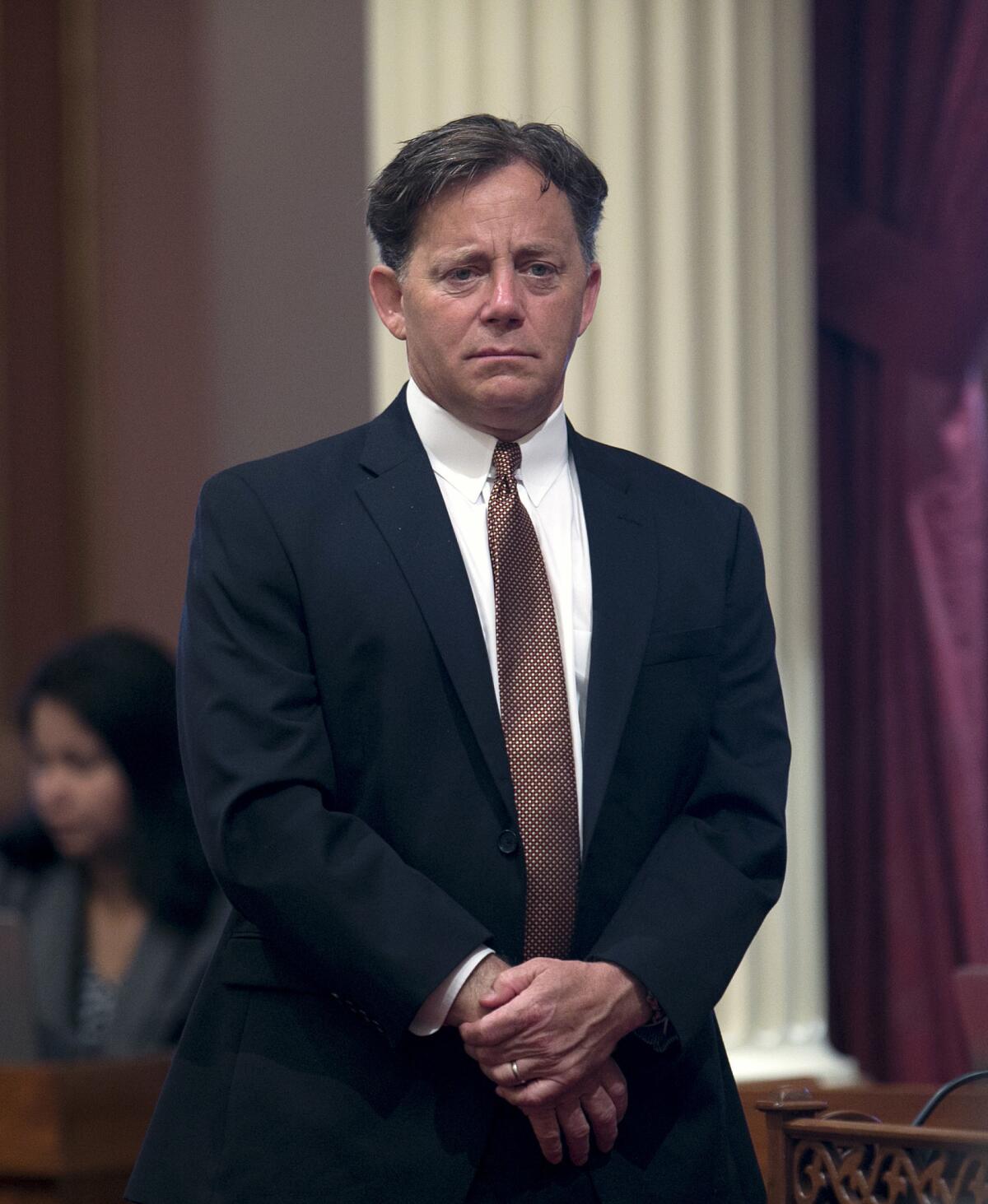
The top attorney for the state’s campaign watchdog agency recommended Monday that it deny a request to boost the limit for contributions to a highly charged recall election.
Democrats had asked the Fair Political Practices Commission to allow elected officials to donate more than $4,400 each to a committee defending Sen. Josh Newman (D-Fullerton) against a recall effort.
The FPPC has said for years that the limit applies to recalls, but Richard R. Rios, an attorney for the Senate Democratic Caucus, argued there should not be one.
The panel will meet July 27 to consider a recommendation by Jack Woodside, its general counsel, to deny the request for a new opinion lifting the limit.
“The FPPC’s interpretation … is well – reasoned and legally sound,” Woodside wrote in a memo. “Indeed, the FPPC’s position is based on the plain language, legislative history, and policies of the relevant statutes.
“More importantly, the transfer restriction has been in place and applied to every recall since 2003,” he added. “And Mr. Rios provides no basis to suggest the FPPC’s interpretation needs to be reversed.”
- Share via
Gov. Jerry Brown, California legislative leaders commit to push an affordable housing plan next month
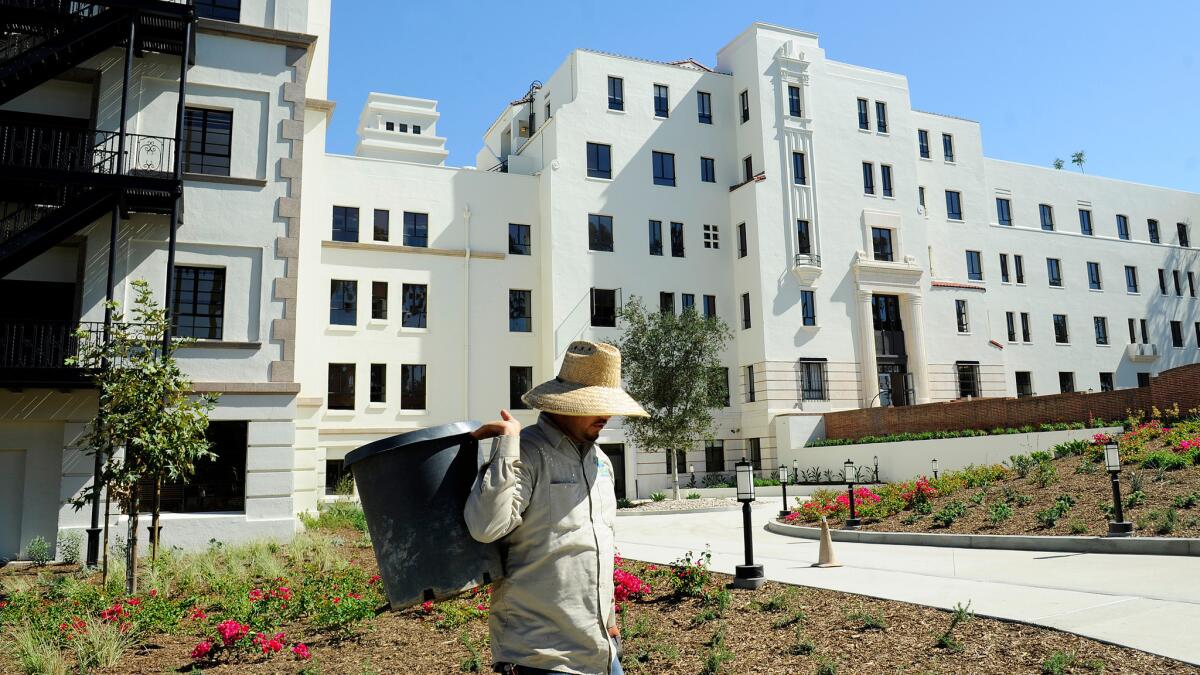
With time running out before lawmakers break for summer recess, Gov. Jerry Brown and legislative leaders announced Monday that they were postponing a vote on a package of bills to address the state’s housing affordability crisis until August.
“The package of legislation we are all working on will help ensure Californians won’t have to pay an arm and a leg to have a roof over their head,” Brown, Senate President Pro Tem Kevin de León (D-Los Angeles) and Assembly Speaker Anthony Rendon (D-Paramount) said in a joint statement.
The package of housing bills, the statement said, will include ongoing funding for low-income development, a bond on the 2018 statewide ballot and regulatory changes to make it easier to build housing. Notable is Brown’s support for a bond measure, which he has been resistant to in the past.
“This comprehensive approach does what’s long been needed in California — build new homes and improve access to housing,” the statement said.
The bond will require a two-thirds supermajority vote of the Legislature to pass and it is likely so will a decision to create a new funding source for low-income projects.
Some Democratic lawmakers had pushed for a vote on a housing package prior to leaving for the summer at the end of the week. But a deal to extend cap and trade, the state’s signature program to combat climate change, has controlled the discussion at the Capitol. Legislators were debating the cap-and-trade extension when Brown, De León and Rendon released their statement.
- Share via
California climate change vote could mean a long night ahead
Senators are breaking ahead of an expected late-night vote on extending cap and trade, the state’s signature program to combat climate change.
There will likely be three measures voted on today as part of the cap-and-trade package:
- Assembly Bill 398: This is the main cap-and-trade bill, which would extend the program, now set to expire in 2020, for an additional decade. Gov. Jerry Brown and legislative leaders are aiming for a two-thirds supermajority vote of the Legislature to insulate the decision from legal challenges.
- Assembly Bill 617: This is a companion bill designed to strengthen air quality rules across California. It was designed to address concerns from Democrats that cap and trade wasn’t doing enough to protect communities from pollution. This measure requires a simple majority vote.
- Assembly Constitutional Amendment 1: This is a potential 2018 ballot measure written by Assembly GOP leader Chad Mayes of Yucca Valley. It would require one-time supermajority approval in 2024, as opposed to the majority vote typically necessary, to spend money generated by cap-and-trade auctions as a way to ensure that Republicans have more influence in doling out those revenues. This measure also requires a supermajority vote before it goes on the ballot.
All three measures are starting in the Senate, and if they pass they’ll move to the Assembly for final approval. You can watch the Senate debate live here.
- Share via
Legislation to extend California’s cap-and-trade program clears state Senate committee hurdle
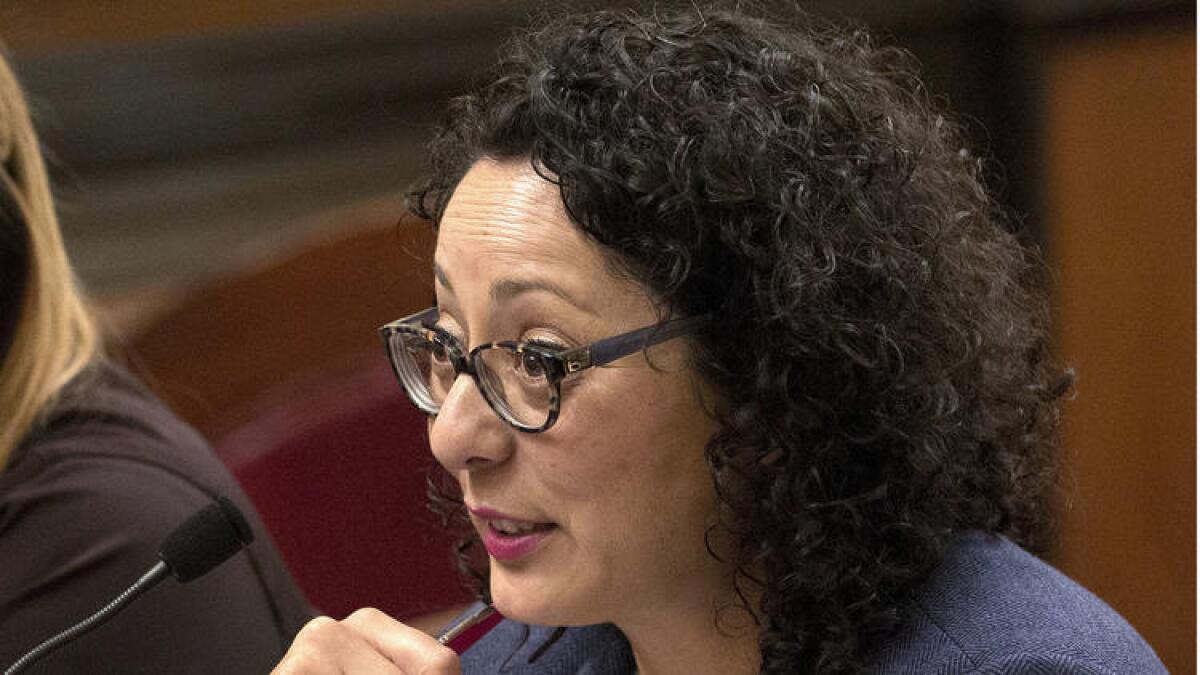
The Senate Appropriations Committee advanced hotly contested legislation on climate change and air quality on Monday afternoon, setting the stage for a vote of the full Legislature later in the evening.
The two measures would extend the cap-and-trade program, which requires companies to buy permits to release greenhouse gas emissions, and require tougher regulations on pollution in disadvantaged communities.
The legislation is the product of intense negotiations with Gov. Jerry Brown, environmentalists, industry lobbyists and lawmakers.
“It’s a comprehensive approach that’s been needed for a long time,” Assemblywoman Cristina Garcia (D-Bell Gardens) told the committee.
- Share via
Lawmakers won’t vote on housing legislation today — leaving one day to act before summer recess
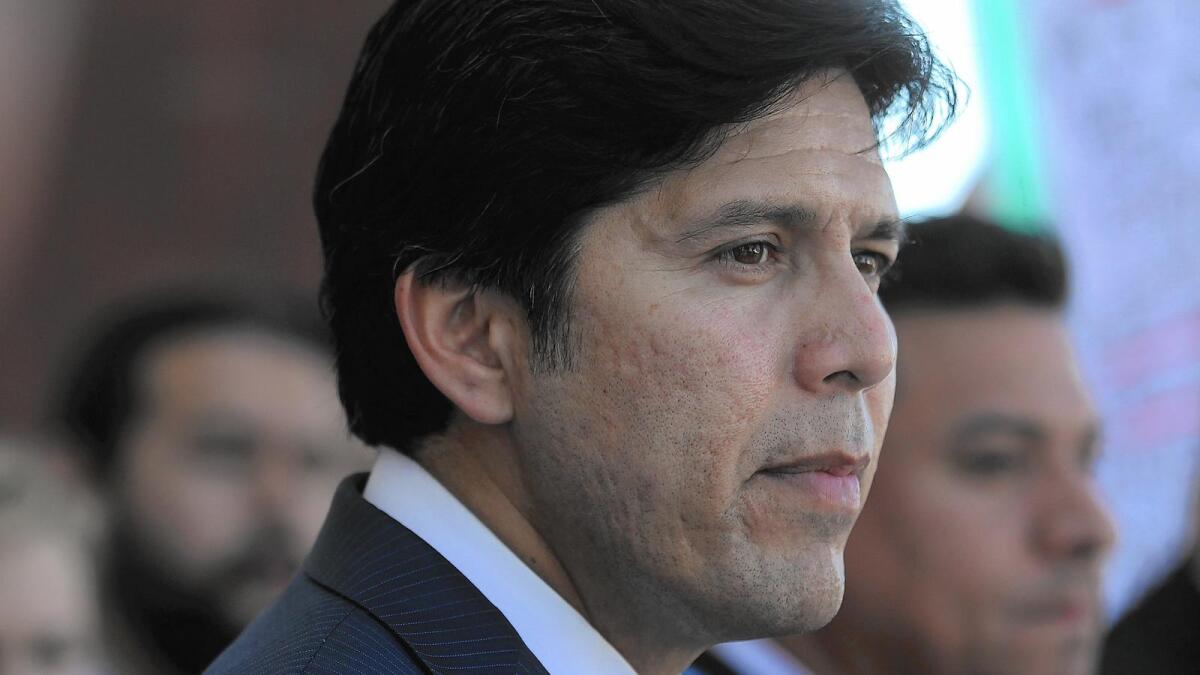
California lawmakers will not vote on a package of bills Monday designed to address the state’s housing crisis, according to the leader of the state Senate.
A bloc of legislators, led by progressive Democrats in the Assembly, have pushed for action on housing amid a broader debate over the future of the state’s climate change policies. Senate President Pro Tem Kevin de León (D-Los Angeles) and Assembly Speaker Anthony Rendon (D-Paramount) said last week they were delaying a vote on extending the state’s cap-and-trade program in part to “allow our discussion on long-term housing affordability solutions in California to catch up to the climate effort.”
But De León spokesman Jonathan Underland said lawmakers won’t be voting on housing Monday.
“Today is all cap and trade, all day long!” Underland said in an email.
The decision leaves legislators with just one regularly scheduled session on Thursday to decide on housing bills before they break for summer recess. Late last week, lawmakers changed a series of bills designed to increase funding for low-income developments and ease home-building regulations in preparation for possible votes. Key bills to increase funding require a two-thirds supermajority vote to pass.
- Share via
Former Obama official joins race to unseat Rep. Ed Royce in Orange County’s 39th District
Former Obama administration employee Sam Jammal is running in Orange County’s 39th Congressional District, saying his immigrant background is representative of its constituents.
Jammal, 35, of Fullerton, was raised in La Mirada by a Colombian mother and Jordanian father. The district has a heavy Latino and Asian population.
“This is where I grew up, so it’s personal,” Jammal said. “I know these communities and I know their values.”
He graduated from USC with a political science degree and attended George Washington University Law School before working with the Mexican American Legal Defense and Educational Fund.
“I wanted to work in civil rights and make sure my communities had a seat at the table,” he said.
He worked as legislative counsel to Sen. Michael Bennet (D-Colo.) and as chief of staff to Rep. Tony Cardenas (D-Los Angeles) and was special assistant to the undersecretary for industry and security in Obama’s Commerce Department. Most recently, he’s worked as regulatory counsel at Tesla.
Rep. Ed Royce (R-Fullerton) had held the seat for 13 terms. It is one of several Republican-controlled districts that backed Hillary Clinton for president in 2016 and present turnover potential for 2018.
Jammal joins other Democratic challengers to Royce — pediatrician Mai Khanh Tran, former chemistry professor Phil Janowicz and philanthropist Gil Cisneros — as well as independent candidate Julio Castañeda.
“We’re going to run a campaign that gets back into the community,” Jammal said, promising “old-fashioned organizing.”
- Share via
Agriculture groups give boost to cap-and-trade
- Share via
My observations of Gov. Jerry Brown as California’s cap-and-trade evangelist
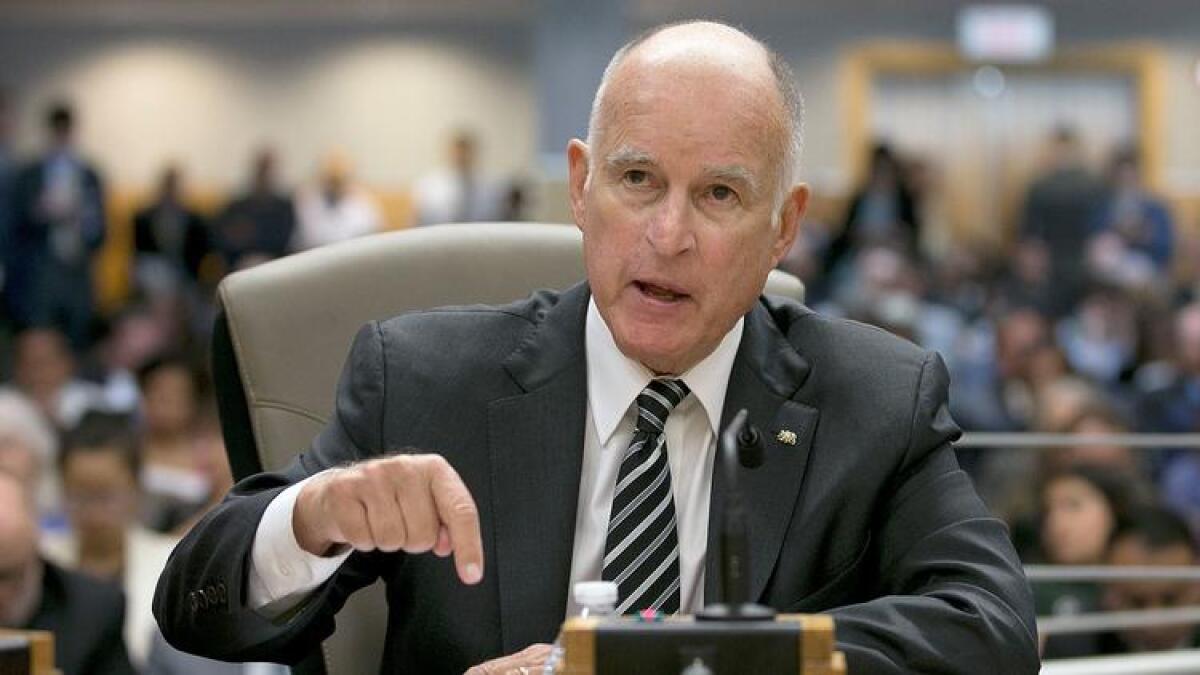
I’ve never seen Gov. Jerry Brown as animated, emotional and tenacious as he was before the state Senate Environmental Quality Committee, arguing for his embattled cap-and-trade climate control legislation.
He resembled a cross between the Clint Eastwood character Walt Kowalski in “Gran Torino” — “Get off my lawn!” — and some street-corner preacher warning that the end is near. He’s also the most effective politician Sacramento has seen in a very long time.